The 10 Best Short Moral Stories With Valuable Lessons
Stories that have morals and messages behind them are always powerful. In fact, it’s crazy just how powerful a 200 word story can be.
Our last article of short stories became so popular, that we decided to create another list, in which every story has a simple moral behind it.
Table of Contents

The 10 Best Short Moral Stories
Some of these stories are very short and basic. In fact some are so basic they’re most likely featured in children’s books somewhere. However, the strength of the message remains the same.
Here’s some more of the best short moral stories:
1. An Old Man Lived in the Village

An old man lived in the village. He was one of the most unfortunate people in the world. The whole village was tired of him; he was always gloomy, he constantly complained and was always in a bad mood.
The longer he lived, the more bile he was becoming and the more poisonous were his words. People avoided him, because his misfortune became contagious. It was even unnatural and insulting to be happy next to him.
He created the feeling of unhappiness in others.
But one day, when he turned eighty years old , an incredible thing happened. Instantly everyone started hearing the rumour:
“An Old Man is happy today, he doesn’t complain about anything, smiles, and even his face is freshened up.”
The whole village gathered together. The old man was asked:
Villager: What happened to you?
“Nothing special. Eighty years I’ve been chasing happiness, and it was useless. And then I decided to live without happiness and just enjoy life. That’s why I’m happy now.” – An Old Man
Moral of the story:
Don’t chase happiness. Enjoy your life.
2. The Wise Man

People have been coming to the wise man, complaining about the same problems every time. One day he told them a joke and everyone roared in laughter.
After a couple of minutes, he told them the same joke and only a few of them smiled.
When he told the same joke for the third time no one laughed anymore.
The wise man smiled and said:
“You can’t laugh at the same joke over and over. So why are you always crying about the same problem?”
Worrying won’t solve your problems, it’ll just waste your time and energy.
3. The Foolish Donkey
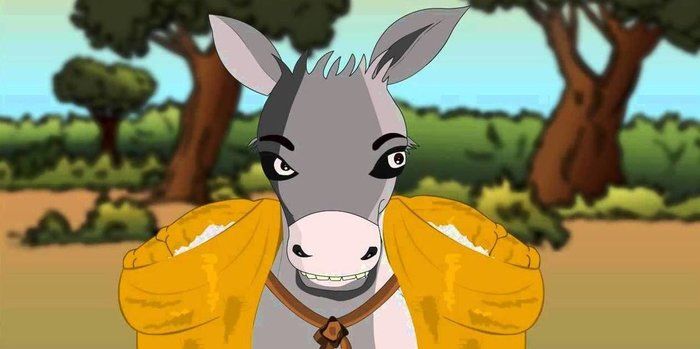
A salt seller used to carry the salt bag on his donkey to the market every day.
On the way they had to cross a stream. One day the donkey suddenly tumbled down the stream and the salt bag also fell into the water. The salt dissolved in the water and hence the bag became very light to carry. The donkey was happy.
Then the donkey started to play the same trick every day.
The salt seller came to understand the trick and decided to teach a lesson to it. The next day he loaded a cotton bag on the donkey.
Again it played the same trick hoping that the cotton bag would be still become lighter.
But the dampened cotton became very heavy to carry and the donkey suffered. It learnt a lesson. It didn’t play the trick anymore after that day, and the seller was happy.
Luck won’t favor always.
4. Having A Best Friend

A story tells that two friends were walking through the desert. During some point of the journey they had an argument, and one friend slapped the other one in the face.
The one who got slapped was hurt, but without saying anything, wrote in the sand;
“Today my best friend slapped me in the face.”
They kept on walking until they found an oasis, where they decided to take a bath. The one who had been slapped got stuck in the mire and started drowning, but the friend saved him. After he recovered from the near drowning, he wrote on a stone;
“Today my best friend saved my life.”
The friend who had slapped and saved his best friend asked him;
“After I hurt you, you wrote in the sand and now, you write on a stone, why?”
The other friend replied;
“When someone hurts us we should write it down in sand where winds of forgiveness can erase it away. But, when someone does something good for us, we must engrave it in stone where no wind can ever erase it.”
Moral of the story:
Don’t value the things you have in your life. But value who you have in your life.
5. The Four Smart Students

One night four college students were out partying late night and didn’t study for the test which was scheduled for the next day. In the morning, they thought of a plan.
They made themselves look dirty with grease and dirt.
Then they went to the Dean and said they had gone out to a wedding last night and on their way back the tire of their car burst and they had to push the car all the way back. So they were in no condition to take the test.
The Dean thought for a minute and said they can have the re-test after 3 days. They thanked him and said they will be ready by that time.
On the third day, they appeared before the Dean. The Dean said that as this was a Special Condition Test, all four were required to sit in separate classrooms for the test. They all agreed as they had prepared well in the last 3 days.
The Test consisted of only 2 questions with the total of 100 Points:
1) Your Name? __________ (1 Points)
2) Which tire burst? __________ (99 Points) Options – (a) Front Left (b) Front Right (c) Back Left (d) Back Right
Take responsibility or you will learn your lesson.
6. The Greedy Lion

It was an incredibly hot day, and a lion was feeling very hungry.
He came out of his den and searched here and there. He could find only a small hare. He caught the hare with some hesitation. “This hare can’t fill my stomach” thought the lion.
As the lion was about to kill the hare, a deer ran that way. The lion became greedy. He thought;
“Instead of eating this small hare, let me eat the big deer.”
He let the hare go and went behind the deer. But the deer had vanished into the forest. The lion now felt sorry for letting the hare off.
A bird in hand is worth two in the bush.
7. Two Friends & The Bear

Vijay and Raju were friends. On a holiday they went walking into a forest, enjoying the beauty of nature. Suddenly they saw a bear coming at them. They became frightened.
Raju, who knew all about climbing trees, ran up to a tree and climbed up quickly. He didn’t think of Vijay. Vijay had no idea how to climb the tree.
Vijay thought for a second. He’d heard animals don’t prefer dead bodies, so he fell to the ground and held his breath. The bear sniffed him and thought he was dead. So, it went on its way.
Raju asked Vijay;
“What did the bear whisper into your ears?”
Vijay replied, “The bear asked me to keep away from friends like you” …and went on his way.
A friend in need is a friend indeed.
8. The Struggles of Our Life

Once upon a time a daughter complained to her father that her life was miserable and that she didn’t know how she was going to make it.
She was tired of fighting and struggling all the time. It seemed just as one problem was solved, another one soon followed.
Her father, a chef, took her to the kitchen. He filled three pots with water and placed each on a high fire.
Once the three pots began to boil, he placed potatoes in one pot, eggs in the second pot and ground coffee beans in the third pot. He then let them sit and boil, without saying a word to his daughter.
The daughter, moaned and impatiently waited, wondering what he was doing. After twenty minutes he turned off the burners.
He took the potatoes out of the pot and placed them in a bowl. He pulled the eggs out and placed them in a bowl. He then ladled the coffee out and placed it in a cup.
Turning to her, he asked. “Daughter, what do you see?”
“Potatoes, eggs and coffee,” she hastily replied.
“Look closer” he said, “and touch the potatoes.” She did and noted that they were soft.
He then asked her to take an egg and break it. After pulling off the shell, she observed the hard-boiled egg.
Finally, he asked her to sip the coffee. Its rich aroma brought a smile to her face.
“Father, what does this mean?” she asked.
He then explained that the potatoes, the eggs and coffee beans had each faced the same adversity-the boiling water. However, each one reacted differently. The potato went in strong, hard and unrelenting, but in boiling water, it became soft and weak.
The egg was fragile, with the thin outer shell protecting its liquid interior until it was put in the boiling water. Then the inside of the egg became hard.
However, the ground coffee beans were unique. After they were exposed to the boiling water, they changed the water and created something new.
“Which one are you?” he asked his daughter.
“When adversity knocks on your door, how do you respond? Are you a potato, an egg, or a coffee bean?”
In life, things happen around us, things happen to us, but the only thing that truly matters is how you choose to react to it and what you make out of it. Life is all about leaning, adopting and converting all the struggles that we experience into something positive.
9. The Fox & The Grapes

One afternoon a fox was walking through the forest and spotted a bunch of grapes hanging from over a lofty branch.
“Just the thing to quench my thirst,” he thought.
Taking a few steps back, the fox jumped and just missed the hanging grapes. Again the fox took a few paces back and tried to reach them but still failed.
Finally, giving up, the fox turned up his nose and said, “They’re probably sour anyway,” and proceeded to walk away.
Moral of the story:
It’s easy to despise what you can’t have.
10. The Lion & The Poor Slave
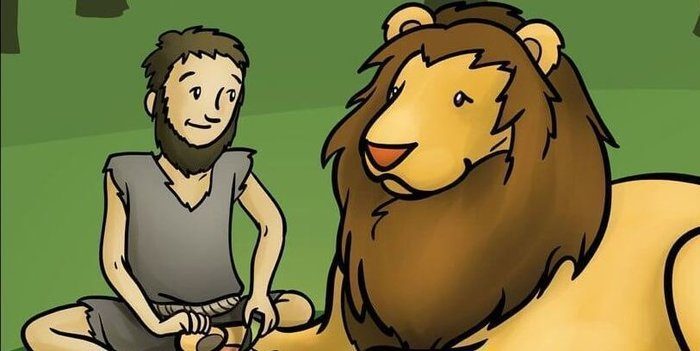
A slave, ill-treated by his master, runs away to the forest. There he comes across a lion in pain because of a thorn in his paw. The slave bravely goes forward and removes the thorn gently.
The lion without hurting him goes away.
Some days later, the slave’s master comes hunting to the forest and catches many animals and cages them. The slave is spotted by the masters’ men who catch him and bring him to the cruel master.
The master asks for the slave to be thrown into the lion’s cage.
The slave is awaiting his death in the cage when he realizes that it is the same lion that he had helped. The slave rescued the lion and all other caged animals.
One should help others in need, we get the rewards of our helpful acts in return.
Here’s a quick recap on the 10 best short moral stories:
- An old man lived in the village
- The wise man
- The foolish donkey
- Having a best friend
- The four smart students
- The greedy lion
- The two friends & the bear
- The struggles of our life
- The fox & the grapes
- The lion & the poor slave
If you haven’t seen our original article, with slightly more detailed inspirational short stories , check it out!
Do you have any other favorite short moral stories? Leave a comment below.
The 10 best motivational speakers in the world.
Dan Western is the founder of Wealthy Gorilla . Dan has been running Wealthy Gorilla and studying self-development, personal finance, and investment for the last 7 years. To this day, Wealthy Gorilla has become one of the fastest growing wealth infotainment sites in the world; with over 300 million views worldwide. Dan doesn't use personal social media anymore, so you won't be able to find him on Instagram, or Twitter.
10 Comments
Apr 7, 2019 at 12:40 pm
An old man lived in the village is a wonderful story. I like it very much. thanks
Jun 14, 2019 at 11:20 am
The foolish donkey is wonderful and all stories good but i like it
Jul 17, 2019 at 3:03 pm
I really enjoyed your entire list but my favorite of this list is the one about the egg, potatoe, and coffee. Awesome story that is very impactful.
Nov 22, 2019 at 2:36 am
Foolish donkey this story I like that and I have learn something from these stories thanks uploaded on net its was so inspection stories to people’s
Dec 13, 2019 at 2:08 pm
I like the story an old man lived in the village thank you for giving this type of story
Aqsa farhat
Feb 29, 2020 at 10:54 am
All the stories were nice and these stories reminds me about my childhood thank you for making such meaningful stories
Pattada praveen kumar
Apr 14, 2020 at 9:57 am
The fox & the grapes its really everyone thinking like
Bhim Maya subba
Nov 13, 2020 at 1:55 pm
Mine is about ( The blind girl ). Since I have read that book before but I am very glad that I got another chance to read that same book. Actually this story is one of my favorite of all time.
Ramel Sasuke Sampang
Nov 14, 2020 at 5:31 am
My favorite is the potato, egg, and coffee beans! It will help me with future problems. 😀
Marry Walker
Nov 20, 2020 at 12:40 pm
Being a writer, I love to read stories and books. And this blog includes the best short moral stories. I like these all stories and i will share it definitely. Keep writing!
Your email address will not be published. Required fields are marked *

Who are the best motivational speakers of all time?
Motivational speakers have had an enormous impact on my life, and millions of others, no matter what their personal situation in life may be.
Their words are so powerful and inspirational, you just have to listen to their stuff on a daily basis. So it brings me to this post.
I’ve been enjoying a lot of motivational videos recently, have been creating my own, and have ended up listening to a lot of wonderful speeches.
Top 10 Best Motivational Speakers
But who are the best motivational speakers in the world?
Here’s my list of the top 10 motivational speakers in the world.
These are the people you need to be following, listening to and watching on YouTube. They have transformed many people’s lives including mine.
10. Nick Vujicic

Nick Vujicic was born on December 4th 1982 in Melbourne, Australia. Vujicic was born with Tetra-Amelia syndrome, a very rare disorder whereby someone is born with an absence of all four limbs.
This no doubt ably, made things incredibly tough for Nick growing up, as he struggled both mentally and physically.
It led to him founding his very own non-profit organization called ‘Life Without Limbs’ . Nick Vujicic is a true inspiration to us all, and if you’ve watched some of his motivational speeches on YouTube, you’ll realize just how much he’s been able to adapt to a life without limbs.
Many people with this disorder might not be willing to work hard in order to truly push their abilities.
He can type 43 words a minute on a computer. That’s right, you heard me correctly. This is a guy who has an absence of all four limbs, but can type 43 words per minute on a computer.
I encourage you to watch some of his videos on YouTube, and see exactly what I’m talking about.
“It’s a lie to think you’re not good enough. It’s a lie to think you’re not worth anything.” – nick Vujicic
9. Brian Tracy

Brian Tracy was born on January 5th 1944 in Vancouver, Canada, and is the CEO of Brian Tracy International , a company that specifically sets out to help individuals and organizations develop, train and grow.
Brian’s ultimate goal is to help other people achieve their goals more efficiently and be able to achieve their full potential.
That definitely sets the foundation for being one of the best motivational speakers in the world.
His lifetime achievements are phenomenal, consulting huge numbers of businesses, hosting huge numbers of seminars and conducting years and years of research in Business, Economics, Psychology and Philosophy.
There’s no more to say other than the title given on his website: Professional Speaker, Best Selling Author, Entrepreneur and Success Expert. Check out some of the best Brian Tracy quotes .
“No one lives long enough to learn everything they need to learn starting from scratch. To be successful, we absolutely, positively have to find people who have already paid the price to learn the things that we need to learn to achieve our goals.” – Brian Tracy
8. Robin Sharma

Robin Sharma was born in 1964 in Nepal, and straight out of the Dalhousie University School of Law, became a professional lawyer. But he went much further in his career than being a fully qualified and successful lawyer.
Sharma has written a total of 15 published books, from 1995 – 2011, on the subjects of self-help and leadership. One of his most popular books written; ‘The Monk Who Sold his Ferrari’ , has sold over 5 million copies worldwide.
The book is all about a character called Julian, who decides to sell his home and Ferrari to go on a spiritual journey, after being the victim to a sudden heart attack.
Some may say that Robin Sharma’s more of a motivational author rather than speaker, but he deserves to be on this list. He’s written 12 global best sellers, and is an expert author in the world of leadership and self development.
“Dreamers are mocked as impractical. The truth is they are the most practical, as their innovations lead to progress and a better way of life for all of us.” – Robin S. Sharma
7. Wayne Dyer

Dr. Wayne Dyer was born on May 10th 1940 in Detroit, and spent the majority of his childhood in an orphanage.
Dyer was in the U.S Navy after graduating high school, from 1958 to 1962. He then received his degree in counselling, a profession that he chose to work in for a while before taking it one step further.
Dyer left his teaching job and started pursuing a career in motivational speaking, holding various lectures across the states and becoming an incredibly popular author.
The first book that Dyer ever wrote has now had over 35 million copies sold and he’s proceeded to continue with his lecture tours, release various audio tapes and publish a regular stream of books .
“Passion is a feeling that tells you: this is the right thing to do. Nothing can stand in my way. It doesn’t matter what anyone else says. This feeling is so good that it cannot be ignored. I’m going to follow my bliss and act upon this glorious sensation of joy.” – Wayne Dyer
6. Zig Ziglar

Zig Ziglar was born on November 6th, 1926 in Alabama, and passed away on November 28th in 2012.
Ziglar has 11 siblings, and at the age of five years old, his father died of a stroke, and his sister passed away two days later. Zig actually served in the army from 1935 – 1946 during World War II.
Ziglar met his wife Jean when he was just 17 years old, and after the war began to work as a salesman for many different companies, eventually becoming the vice president for the Automotive Performance company .
He started taking part in motivational seminars, and also wrote his first book in 1975 titled: ‘See You at the Top’ . This was the first of at least 15 books he’d written during the period of 1975 and 2012.
A lot of wisdom has come from Zig Ziglar over the years and he is definitely one of the best motivational speakers in the world.
“You were designed for accomplishment, engineered for success, and endowed with the seeds of greatness.” – Zig Ziglar
5. Arnold Schwarzenegger

Arnold Schwarzenegger was born on July 30th 1947, in Austria. We all know him as the world famous professional bodybuilding champion, and there’s a very inspirational story behind Arnie’s bodybuilding success.
Schwarzenegger served in the Austrian army at the age of 18 years old for 1 year, which at the time was compulsory for all 18-year-old males.
During this time, he would still manage to fit in his workouts between all the training and drills, whilst most people were resting. He snuck out of the camp to compete in the Junior Mr. Europe contest , which he ended up winning.
Arnold’s discipline towards his training was incredible, and the fact that he was willing to disobey the rules of the army and sneak out of the camp to compete in the contest, just goes to show how badly he wanted it.
Nowadays, he’s an inspiration to many bodybuilders and a great source of motivation for anyone wanting to be successful.
“For me life is continuously being hungry. The meaning of life is not simply to exist, to survive, but to move ahead, to go up, to achieve, to conquer.” – Arnold Schwarzenegger
4. Jim Rohn

Jim Rohn was born September 17th, 1930 in Yakima, Washington, and passed away on December 5th, 2009. He was a very successful entrepreneur, at one time being a Vice President of a very successful sales company, Nutri-Bio.
However, after the company eventually went out of business, he was invited to speak at a meeting of one of his clubs.
After this meeting, he was invited to speak at many other events and began making a name for himself. Rohn was a wise businessman and managed to impart much of this wisdom to others.
He’s definitely earned the right to be on this list of the best motivational speakers in the world.
“If you don’t design your own life plan, chances are you’ll fall into someone else’s plan. And guess what they have planned for you? Not much.” – Jim Rohn
3. Les Brown

Les Brown was born on February 17th, 1945 in Miami, Florida. He was adopted by Mamie Brown, and whilst in grade school, was declared “educably mentally retarded” .
Despite this and the emotional issues, it brought upon him; he was encouraged by others to continue to learn and be the best he could be. Leading him to unlock his full potential.
Les is another motivational speaker who is incredibly popular among the motivational video compilations that others create. Because his speeches are so deep and meaningful that they really get through to people.
His top-selling books: ‘It’s Not over until You Win!’ and ‘Live Your Dreams’ are truly inspirational and well worth the read.
“When life knocks you down, try to land on your back. Because if you can look up, you can get up. Let your reason get you back up.” – Les Brown
2. Tony Robbins

Tony Robbins was born on February 29th, 1960 in Los Angeles. His life at home when he was young was described by him as abusive and chaotic. It was because of this that he left home at the age of 17.
Originally when starting out in the world of motivational speaking, Robbins was promoting seminars for Jim Rohn. He later decided to begin his own journey by hosting his own seminars.
Tony has affected and changed so many people’s lives in a positive way through his seminars, motivational speeches, inspirational quotes and best-selling books.
Search for him on YouTube and several videos will pop up showing him change someone’s life.
The favorites of mine that I’ve watched, are where he cures a young man’s stutter in 7 minutes and saves another guy’s marriage in 8.
“One reason so few of us achieve what we truly want is that we never direct our focus; we never concentrate our power. Most people dabble their way through life, never deciding to master anything in particular.” – Tony Robbins
1. Eric Thomas

Eric Thomas, born and raised in Detroit, was homeless at the age of 16 years old. But Eric decided that he wanted to make a better life for himself, to become someone with a life he could be proud of.
E.T did just that, and you can now check out powerful advice from Eric Thomas on YouTube. Including his “Thank God It’s Monday” series.
He also managed to get the education he missed out on whilst he was homeless and pushed himself further to achieve all the qualifications he dreamed of being able to achieve.
Eric Thomas has become one of the best motivational speakers in the world. His YouTube videos are legendary and his best-selling books have taken in millions of dollars in revenue.
E.T’s speeches are so popular, that you’ll find he’s featured in roughly 90% of the motivational videos that others create and upload to YouTube, using compilations of clips, speeches, and music.
“When you want to succeed as bad as you want to breathe, then you’ll be successful.” – Eric Thomas
I hope you enjoyed this list of the top 10 best motivational speakers in the world. Many of these speakers are featured within some of the videos we included in our new list of ultimate gym motivation . Take a look and see what you think.
Here’s a quick recap on the list of the best motivational speakers in the world::
- Eric Thomas
- Tony Robbins
- Arnold Schwarzenegger
- Dr. Wayne Dyer
- Robin Sharma
- Brian Tracy
- Nick Vujicic
Who’s your favorite of the 10 best motivational speakers? Do you still agree with the current order of this list? Leave a comment below.
The 10 Most Inspirational Short Stories I’ve Heard

Short Inspirational stories are powerful reads;
The great thing about them is that they’re so easy to digest, and there’s always a moral at the end of the story.
Whether they’re true stories or not is another thing, as many of them are legends supposedly hundreds of years old.
However, the stories that I’m talking about are so powerful and inspirational that many of them really do get you thinking and even leave you speechless at times.
The 10 Best Inspirational Short Stories
I’ve been reading plenty of these short stories in the past couple of weeks and found the lessons behind them truly wonderful. So I’ve decided to write out this article highlighting the 10 most inspirational short stories I’ve heard.
Next to the subheadings, in brackets, I’ve put what the story’s lesson is all about, with a short description of the moral of the story at the end of each section.
10. The Elephant Rope (Belief)

A gentleman was walking through an elephant camp, and he spotted that the elephants weren’t being kept in cages or held by the use of chains.
All that was holding them back from escaping the camp, was a small piece of rope tied to one of their legs.
As the man gazed upon the elephants, he was completely confused as to why the elephants didn’t just use their strength to break the rope and escape the camp. They could easily have done so, but instead, they didn’t try to at all.
Curious and wanting to know the answer, he asked a trainer nearby why the elephants were just standing there and never tried to escape.
The trainer replied;
“when they are very young and much smaller we use the same size rope to tie them and, at that age, it’s enough to hold them. As they grow up, they are conditioned to believe they cannot break away. They believe the rope can still hold them, so they never try to break free.”
The only reason that the elephants weren’t breaking free and escaping from the camp was that over time they adopted the belief that it just wasn’t possible.
No matter how much the world tries to hold you back, always continue with the belief that what you want to achieve is possible. Believing you can become successful is the most important step in actually achieving it.
9. Thinking Out of the Box (Creative Thinking)

In a small Italian town, hundreds of years ago, a small business owner owed a large sum of money to a loan-shark. The loan-shark was a very old, unattractive looking guy that just so happened to fancy the business owner’s daughter.
He decided to offer the businessman a deal that would completely wipe out the debt he owed him. However, the catch was that we would only wipe out the debt if he could marry the businessman’s daughter.
Needless to say, this proposal was met with a look of disgust.
The loan-shark said that he would place two pebbles into a bag, one white and one black.
The daughter would then have to reach into the bag and pick out a pebble. If it was black, the debt would be wiped, but the loan-shark would then marry her. If it was white, the debt would also be wiped, but the daughter wouldn’t have to marry the loan-shark.
Standing on a pebble-strewn path in the businessman’s garden, the loan-shark bent over and picked up two pebbles.
Whilst he was picking them up, the daughter noticed that he’d picked up two black pebbles and placed them both into the bag.
He then asked the daughter to reach into the bag and pick one.
The daughter naturally had three choices as to what she could have done:
- Refuse to pick a pebble from the bag.
- Take both pebbles out of the bag and expose the loan-shark for cheating.
- Pick a pebble from the bag fully well knowing it was black and sacrifice herself for her father’s freedom.
She drew out a pebble from the bag, and before looking at it ‘accidentally’ dropped it into the midst of the other pebbles. She said to the loan-shark;
“Oh, how clumsy of me. Never mind, if you look into the bag for the one that is left, you will be able to tell which pebble I picked.”
The pebble left in the bag is obviously black, and seeing as the loan-shark didn’t want to be exposed, he had to play along as if the pebble the daughter dropped was white, and clear her father’s debt.
It’s always possible to overcome a tough situation throughout of the box thinking, and not give in to the only options you think you have to pick from.
8. The Group of Frogs (Encouragement)

As a group of frogs was traveling through the woods, two of them fell into a deep pit. When the other frogs crowded around the pit and saw how deep it was, they told the two frogs that there was no hope left for them.
However, the two frogs decided to ignore what the others were saying and they proceeded to try and jump out of the pit .
Despite their efforts, the group of frogs at the top of the pit were still saying that they should just give up. That they would never make it out.
Eventually, one of the frogs took heed to what the others were saying and he gave up, falling down to his death. The other frog continued to jump as hard as he could. Again, the crowd of frogs yelled at him to stop the pain and just die.
He jumped even harder and finally made it out. When he got out, the other frogs said, “Did you not hear us?”
The frog explained to them that he was deaf. He thought they were encouraging him the entire time.
People’s words can have a big effect on other’s lives. Think about what you say before it comes out of your mouth. It might just be the difference between life and death.
7. A Pound of Butter (Honesty)

There was a farmer who sold a pound of butter to a baker. One day the baker decided to weigh the butter to see if he was getting the right amount, which he wasn’t. Angry about this, he took the farmer to court.
The judge asked the farmer if he was using any measure to weight the butter. The farmer replied, “Honor, I am primitive. I don’t have a proper measure, but I do have a scale.”
The judge asked, “Then how do you weigh the butter?”
The farmer replied;
“Your Honor, long before the baker started buying butter from me, I have been buying a pound loaf of bread from him. Every day when the baker brings the bread, I put it on the scale and give him the same weight in butter. If anyone is to be blamed, it is the baker.”
In life, you get what you give. Don’t try and cheat others.
6. The Obstacle In Our Path (Opportunity)

In ancient times, a King had a boulder placed on a roadway. He then hid himself and watched to see if anyone would move the boulder out of the way. Some of the king’s wealthiest merchants and courtiers came by and simply walked around it.
Many people loudly blamed the King for not keeping the roads clear, but none of them did anything about getting the stone out of the way.
A peasant then came along carrying a load of vegetables. Upon approaching the boulder, the peasant laid down his burden and tried to push the stone out of the road. After much pushing and straining, he finally succeeded.
After the peasant went back to pick up his vegetables, he noticed a purse lying in the road where the boulder had been.
The purse contained many gold coins and a note from the King explaining that the gold was for the person who removed the boulder from the roadway.
Every obstacle we come across in life gives us an opportunity to improve our circumstances , and whilst the lazy complain, the others are creating opportunities through their kind hearts, generosity, and willingness to get things done.
5. The Butterfly (Struggles)

A man found a cocoon of a butterfly.
One day a small opening appeared. He sat and watched the butterfly for several hours as it struggled to force its body through that little hole.
Until it suddenly stopped making any progress and looked like it was stuck.
So the man decided to help the butterfly. He took a pair of scissors and snipped off the remaining bit of the cocoon. The butterfly then emerged easily, although it had a swollen body and small, shriveled wings.
The man didn’t think anything of it and sat there waiting for the wings to enlarge to support the butterfly. But that didn’t happen. The butterfly spent the rest of its life unable to fly, crawling around with tiny wings and a swollen body.
Despite the kind heart of the man , he didn’t understand that the restricting cocoon and the struggle needed by the butterfly to get itself through the small opening; were God’s way of forcing fluid from the body of the butterfly into its wings. To prepare itself for flying once it was out of the cocoon.
Our struggles in life develop our strengths . Without struggles, we never grow and never get stronger, so it’s important for us to tackle challenges on our own, and not be relying on help from others.
4. Control Your Temper (Anger)

There once was a little boy who had a very bad temper. His father decided to hand him a bag of nails and said that every time the boy lost his temper, he had to hammer a nail into the fence.
On the first day, the boy hammered 37 nails into that fence.
The boy gradually began to control his temper over the next few weeks, and the number of nails he was hammering into the fence slowly decreased.
He discovered it was easier to control his temper than to hammer those nails into the fence.
Finally, the day came when the boy didn’t lose his temper at all. He told his father the news and the father suggested that the boy should now pull out a nail every day he kept his temper under control.
The days passed and the young boy was finally able to tell his father that all the nails were gone. The father took his son by the hand and led him to the fence.
“you have done well, my son, but look at the holes in the fence. The fence will never be the same. When you say things in anger, they leave a scar just like this one. You can put a knife in a man and draw it out. It won’t matter how many times you say I’m sorry, the wound is still there.”
Control your anger, and don’t say things to people in the heat of the moment, that you may later regret . Some things in life, you are unable to take back.
3. The Blind Girl (Change)

There was a blind girl who hated herself purely for the fact she was blind. The only person she didn’t hate was her loving boyfriend, as he was always there for her. She said that if she could only see the world, she would marry him.
One day, someone donated a pair of eyes to her – now she could see everything , including her boyfriend. Her boyfriend asked her, “now that you can see the world, will you marry me?”
The girl was shocked when she saw that her boyfriend was blind too, and refused to marry him. Her boyfriend walked away in tears, and later wrote a letter to her saying:
“Just take care of my eyes dear.”
When our circumstances change, so does our mind. Some people may not be able to see the way things were before, and might not be able to appreciate them . There are many things to take away from this story, not just one.
This is one of the inspirational short stories that left me speechless.
2. Puppies for Sale (Understanding)

A shop owner placed a sign above his door that said: “Puppies For Sale.”
Signs like this always have a way of attracting young children, and to no surprise, a boy saw the sign and approached the owner;
“How much are you going to sell the puppies for?” he asked.
The store owner replied, “Anywhere from $30 to $50.”
The little boy pulled out some change from his pocket. “I have $2.37,” he said. “Can I please look at them?”
The shop owner smiled and whistled. Out of the kennel came Lady, who ran down the aisle of his shop followed by five teeny, tiny balls of fur.
One puppy was lagging considerably behind. Immediately the little boy singled out the lagging, limping puppy and said, “What’s wrong with that little dog?”
The shop owner explained that the veterinarian had examined the little puppy and had discovered it didn’t have a hip socket. It would always limp. It would always be lame.
The little boy became excited. “That is the puppy that I want to buy.”
The shop owner said, “No, you don’t want to buy that little dog. If you really want him, I’ll just give him to you.”
The little boy got quite upset. He looked straight into the store owner’s eyes, pointing his finger, and said;
“I don’t want you to give him to me. That little dog is worth every bit as much as all the other dogs and I’ll pay full price. In fact, I’ll give you $2.37 now, and 50 cents a month until I have him paid for.”
The shop owner countered, “You really don’t want to buy this little dog. He is never going to be able to run and jump and play with you like the other puppies.”
To his surprise, the little boy reached down and rolled up his pant leg to reveal a badly twisted, crippled left leg supported by a big metal brace. He looked up at the shop owner and softly replied, “Well, I don’t run so well myself, and the little puppy will need someone who understands!”
1. Box Full of Kisses (Love)

Some time ago, a man punished his 3-year-old daughter for wasting a roll of gold wrapping paper. Money was tight and he became infuriated when the child tried to decorate a box to put under the Christmas tree.
Nevertheless, the little girl brought the gift to her father the next morning and said, “This is for you, Daddy.”
The man became embarrassed by his overreaction earlier, but his rage continue when he saw that the box was empty. He yelled at her; “Don’t you know, when you give someone a present, there is supposed to be something inside?”
The little girl looked up at him with tears in her eyes and cried;
“Oh, Daddy, it’s not empty at all. I blew kisses into the box. They’re all for you, Daddy.”
The father was crushed. He put his arms around his little girl, and he begged for her forgiveness.
Only a short time later, an accident took the life of the child.
Her father kept the gold box by his bed for many years and, whenever he was discouraged, he would take out an imaginary kiss and remember the love of the child who had put it there.
Love is the most precious gift in the world.
Summary of the 10 Best Inspirational Stories
Here’s a quick summary of the 10 best short inspirational stories:
- Box Full of Kisses (Love)
- Puppies for Sale (Understanding)
- The Blind Girl (Change)
- Control Your Temper (Anger)
- The Butterfly (Struggles)
- The Obstacle in Our Path (Opportunity)
- A Pound of Butter (Honesty)
- The Group of Frogs (Encouragement)
- Thinking Out of the Box (Creative Thinking)
- The Elephant Rope (Belief)
Thanks for reading these inspirational short stories. Some of them left me speechless for a minute or two, and it really does make us think.
If you know of any other inspirational short stories that you think should be featured on the list, then let me know in the comments below or drop me an email and I’ll feature them in part two later on in the year.
Which are your favorite inspirational short stories? Leave a comment below.
Top 20 best personal development authors of all time.

Ever wanted to start reading self-development books, but you’re not sure who the best personal development authors to follow are?
You’re in luck…
I’m about to give you the names of what I believe to be the top 20 best self-development authors to be reading up on. These are names to remember when you’re looking for your next book to buy.
Top 20 Best Personal Development Authors
Here are, in no particular order, the names of the 20 best authors to start reading up on. I would have loved to include a few other names on this list, but the top 20 is what it is!
1. Jack Canfield

Jack Canfield is the legend behind the ‘Chicken Soup for the Soul’ series; one of the most popular self-development book series of all time.
Over 250+ books have been published by the company, and Canfield has gone on to become a leading motivational speaker and trainer.
2. Napoleon Hill

Napoleon Hill is the author behind the notorious ‘Think & Grow Rich’, one of the most popular self-development books of all time.
Hill teaches the principles of attaining any riches you desire in life, and there is so much valuable information within this book, that it’ll always be remembered.
3. Dale Carnegie

Another self-development author you have to check out, and one you’ve probably already heard of, is Dale Carnegie. Carnegie lived from 1888 to 1955, and within his life, published a considerable number of self-help books.
Two of those books, specifically the best selling ones, were ‘How to Win Friends & Influence People’ and ‘How to Stop Worrying & Start Living’.
4. Robert B. Cialdini

You probably know Cialdini as the author of ‘Influence: The Psychology of Persuasion’. This book is highly regarded as one of the best self-development books of all time, as well as one of the best psychology books to read.
5. Tim Ferriss

If you’re not following Tim Ferriss , I don’t know what you’re doing. There are four best selling books that every Tim Ferriss fan will have read, and they’ve helped change the lives of millions.
Those four books are:
- The Four Hour Work Week
- The Four Hour Body
- Tools For Titans
- Tribe of Mentors
6. Dr. Wayne Dyer

Sadly, Wayne Dyer passed away several years ago. He was an American philosopher, self-help author and motivational speaker. Dyer wrote over 40 books in the field of personal development, and they have sold in tens of millions.
7. John C. Maxwell

John Maxwell is an American author, speaker and pastor. He focuses solely on leadership, and training other to become wise and wonderful leaders.
Maxwell has written a ton of incredible books, however these are some the most popular books he’s written:
- The 21 Irrefutable Laws of Leadership
- Developing The Leader Within You
- The 15 Invaluable Laws of Growth
- How Successful People Think
- Failing Forward
8. Tony Robbins
Tony Robbins , what a guy! Tony has helped people all over the world to transform their lives, and there’s so much wisdom we can all gain from listening to his speeches, and reading his content.
If you want to learn more about Tony Robbins and his work, you can check out these books:
- Awaken the Giant Within
- Unlimited Power
- Unshakeable
9. Paulo Coelho
You probably know Paulo Coelho for his best selling book, ‘The Alchemist’. Coelho is a best selling author, lyricist and novelist, and has received many awards for his work over the years.
The Alchemist is definitely a book you should read if you’re an ambitious individual trying to pursue your dreams and overcome any obstacles in your way.
10. Deepak Chopra

Deepak Chopra is an American author, public speaker, alternative medicine advocate, and a prominent figure in the New Age movement.
Chopra has become one of the most influential figures in the area of spiritual healing and alternative medicine. Some of his best selling books you should be adding to your reading list are:
- Re-inventing the Body, Resurrecting the Soul
- Creating Affluence
- The Seven Spiritual Laws of Success
11. Peter F. Drucker

Peter Drucker was an Austrian-born American management consultant, educator, and author, whose writings contributed to the philosophical and practical foundations of the modern business corporation.
You probably know him as the author behind ‘Managing Oneself’, and if you don’t, then you should.
12. Martha Beck

Martha Nibley Beck is an American sociologist, life coach, best-selling author, and speaker who travels the world helping people achieve personal and professional goals.
Some of Martha’s most popular books are:
- Finding Your Own North Star
- Find Your Way In A Wild New World
- The 4-Day Win
13. Stephen R. Covey

I first encountered Stephen Covey’s work when I purchased ‘The 7 Habits of Highly Effective People’, which at the time had sold over 15 million copies!
Covey was an American educator, speaker and author. He sadly passed away 5 years ago, but his work has lived on to be some of the best reading material anybody could ever purchase.
14. Brian Tracy
Brian Tracy is a Canadian-born American motivational public speaker and self-development author. He is the author of over 70 books that have been translated into dozens of languages.
Some of his most notorious books are:
- No Excuses: The Power of Discipline
- Eat That Frog!
15. Les Brown
Les Brown is one of my favorite motivational speakers of all time. Les was labelled educable mentally retarded when he was younger, and was born on the floor of an abandoned building.
Some of his most popular and best selling books are ‘Live Your Dreams’ and ‘It’s Not Over Until You Win’.
16. Jim Rohn
Emanuel James “Jim” Rohn was an American entrepreneur, author and motivational speaker. He was responsible for changing many people’s lives, and even mentored Tony Robbins once upon a time.
These are some of the most popular self-development books by Jim Rohn:
- 7 Strategies for Wealth & Happiness
- My Philosophy for Successful Living
- The Keys to Success
17. Gary Keller

Gary Keller is an American entrepreneur and best-selling author. He is the founder of Keller Williams Realty International, which is the largest real estate company in the world by agent count.
You’ve probably heard Keller’s name come up when people talk about ‘The ONE Thing’, his best selling self-help book.
18. Gabrielle Bernstein

Gabrielle Bernstein is an American motivational speaker, life coach, and author. Bernstein teaches primarily from the metaphysical text A Course In Miracles.
Some of here most popular books are:
- Miracles Now
- Spirit Junkie
- May Cause Miracles
- The Universe Has Your Back
19. Brendan Burchard

Brendon Burchard is an American author on motivation and the use of digital and affiliate marketing to sell “info products” based on whatever expertise a person has.
He is most commonly known for his book: The Motivation Manifesto, however he has written several other useful and recommended books on the subject of motivation, such as:
- The Millionaire Messenger
- Life’s Golden Ticket
20. Joel Osteen

Joel Scott Osteen is an American preacher and televangelist. He is the Senior Pastor of Lakewood Church, in Houston, Texas. Osteen’s televised sermons are seen by over 7 million viewers weekly and over 20 million monthly in over 100 countries.
Some of his most popular books are:
- Think Better, Live Better Study Guide
- The Power of I Am
- Fresh Start
That concludes the list of the best personal development authors of all time:
- Jack Canfield
- Napoleon Hill
- Dale Carnegie
- Robert B. Cialdini
- John C. Maxwell
- Anthony Robbins
- Paulo Coelho
- Deepak Chopra
- Peter F. Drucker
- Martha Beck
- Stephen R. Covey
- Gary Keller
- Gabrielle Bernstein
- Brendan Burchard
- Joel Osteen
Who are your favorite personal development authors? Leave a comment below.
Latest posts.

Max Holloway Net Worth
What is Max Holloway’s net worth? Introduction Max Holloway is a Polynesian American mixed martial artist, former UFC Featherweight Champion...

DeAndre Hopkins Net Worth
What is DeAndre Hopkins’ net worth? Introduction As of , DeAndre Hopkins’ net worth is roughly . DeAndre Hopkins is...

Young Dolph Net Worth
What is Young Dolph’s net worth? Introduction As of , Young Dolph’s net worth is estimated to be . Young...

Baker Mayfield Net Worth
What is Baker Mayfield’s net worth? Introduction Baker Mayfield is an American football quarterback for the Tampa Bay Buccaneers of...

Luke Kuechly Net Worth
What is Luke Kuechly’s net worth? Introduction Luke Kuechly is a former American football linebacker for the Carolina Panthers of...

Mobb Deep Net Worth
What was Mobb Deep’s net worth? Introduction Mobb Deep was an American hip-hop duo from Queens, New York. The group...

Jesse Jane Net Worth
What is Jesse Jane’s net worth? Introduction Jesse Jane was an American adult film actress and model from Texas. Jane...

Emily Fernandez Net Worth
What is Emily Fernandez’s net worth? Introduction As of , Emily Fernandez’s net worth is roughly . Emily Fernandez is...

Leighton Vander Esch Net Worth
What is Leighton Vander Esch’s net worth? Introduction Leighton Vander Esch is a former American football linebacker who played his...

Grant Hill Net Worth
What is Grant Hill’s net worth? Introduction As of , Grant Hill’s net worth is . Grant Hill is a...

The 30 Richest People in the World

The 50 Richest Rappers in the World

The 50 Richest Singers in the World

The 50 Richest Actors in the World

The 50 Richest Athletes in the World

Jeff Bezos Net Worth

The 50 Richest DJs in the World


8 Standout Short Stories With Moral Lessons
Nov 22, 2023
Sometimes, I want a short story to simply be a moment of escape. I don’t want to experience an important life lesson; I just want to be entertained like in Shirley Jackson’s “The Lottery” or Edgar Allan Poe’s “The Tell-Tale Heart.” Other times, however, I want to soak in short stories with moral ideals!
A moral, or theme, teaches us something about ourselves and others. We get to learn and grow in some tangible way, and stories that provide this offering are necessary in the literary canon.
Keep reading below for 8 Standout Short Stories With Moral Lessons that you can use in ANY secondary classroom!
Need help with Reading Test Prep? Check out this FREE Pack of 3 Test Prep Activities to help students achieve success on standardized tests!

Table of Contents
A moral, for all intended purposes, is another word for THEME. A theme is the message of a text. Because it is a message, it MUST be written in a complete sentence and contain a connection to a topic or idea from the text. A simple phrase is not quite enough for a thematic statement .
Developing themes for short stories with moral lessons would be a fantastic focus while reading any of the texts below!
1. “To Build a Fire” by Jack London
I love “To Build a Fire” so much! It mirrors my own life in so many ways, which is why it is one of my favorite short stories with moral lessons!
The protagonist, a man with an overabundance of pride and confidence, ultimately fails in an extreme fight for survival. Like me, he believes he can defy the odds and escape an impossible situation.
Teaching this story with passages from The Call of the Wild or White Fang might help in rounding out similar ideas regarding the conflict of Man vs. Nature !
Click below for easy-to-teach activities for To Build a Fire by Jack London!

2. “The Cactus” by O. Henry
One of my favorite things about this short story by O. Henry is its clever twist ending! Many short stories with moral lessons have similar twist endings, which could be why they make such great additions to thematic units !
O. Henry’s “The Cactus” tells the story of a budding romance. A young man tries to charm a young woman, but his boastful nature leads to an unfortunate misunderstanding.
Personally, I think we have all been there, at least when it comes to boastfulness. We all have something we get a little prideful about, to our own detriment most of the time.
You could teach a simple plot activity or examine how the characters change and/or develop over the course of the story!
Click to get teaching ideas here>>> The Cactus Lesson BUNDLE

3. “After Twenty Years” by O. Henry
Loyalty is a concept students are extremely focused on in middle and high school, so including short stories with moral ideas connected to loyalty is a great way to encourage students to engage with certain texts! How can a student even navigate the school hallways without friends to help along the way? Loyalty is vital!
But all friendships change over time as any adult knows. The main characters, an officer and a criminal, experience this situation in the story “After Twenty Years” by O. Henry !
Breaking down this easy-to-read plot through a focus on comparing and contrasting the two main characters will help your students get to the moral (theme) of the story quite easily, as you really feel for both characters (even the criminal one).
Click to buy this BUNDLE to make teaching this short story SIMPLE & EASY!
4. “The Pedestrian” by Ray Bradbury
The story “The Pedestrian,” like its title, is incredibly unassuming. A man in a not-far-off future walks his neighborhood alone. Unlike others who sit in front of screens day and night, the protagonist chooses to go for a stroll, a seemingly innocuous activity.
While on his walk, he encounters an unmanned, robotic police vehicle. Because of its programming, it cannot understand Leonard’s (protagonist’s) intentions and labels him mentally incapable, carting him off to an asylum.
This dark tale teaches about the dangers of reliance on and addiction to technology, a moral we can all learn from! If you need help teaching characterization and theme for “The Pedestrian,” go here !
Need some ideas for teaching scary short stories? Click below!

5. “The Gift of the Magi” by O. Henry
If you are anywhere near the holiday season, “The Gift of the Magi” by O. Henry is one of the best short stories with moral attributes woven throughout!
This short story depicts a couple lamenting their slightly impoverished state. They want to give each other gifts to celebrate the Christmas season; however, they have limited means, like most people in the world today.
Instead of sitting around moping, they both choose to sacrifice the little they have in an interesting way in order to surprise the other for Christmas. The moral, or theme, involving sacrifice will encourage anyone who reads this short story to think beyond oneself during the holiday season.
Want an easy way to teach characterization, reading comprehension, and visualization for The Gift of the Magi ? Click the image below!

6. “The Scarlet Ibis” by James Hurst
I don’t know about you, but if you have read “The Scarlet Ibis” by James Hurst , I know you MUST have shed a tear or two. Good short stories with moral elements tend to do so unexpectedly.
Two brothers, one of whom experiences a disability, interact with each other as many siblings do. There is a constant tug of war between brotherly love and annoyance that most people with brothers or sisters can readily understand.
By the end of the story, we cry with the protagonist as he weeps for his brother who dies a tragic death. This story may be difficult to read for some, but it is completely worth it.
We need to be reminded once in a while that life is not just about us and what makes us happy. It also involves investing in the lives of others, especially in the lives of those less fortunate than we are. Ultimately, patience regarding family must take center place in our lives, which the protagonist learns too late. If you need step-by-step activities to teach this classic story, see this link !
7. “The Necklace” by Guy de Maupassant
I have yet to teach a student who did not like “The Necklace” by Guy de Maupassant . And engagement is super important when choosing short stories with moral concepts!
Unlike the female protagonist in “The Gift of the Magi,” Mathilde Loisel in the story “The Necklace” is self-focused. She cannot see the beauty of the comfort and security of her middle-class life.
Instead, she always thinks about the finer things in life she cannot attain. I think we have all been there a time or two. We may not envision the same “finer” things, but we all pretty much want more than we currently have.
When Mathilde Loisel is invited to a party, she borrows her friend’s necklace, a symbol to her of wealth. At some point, she loses the “expensive” diamond necklace and replaces it without telling her friend about its loss. Now, deep in debt, she and her husband become embittered and worn down through extremely difficult physical work. The resolution of the story involves the revelation that the necklace was, in fact, a cheap fake.
Can you imagine the impact of this knowledge on your psyche? Sometimes, it is simply better to tell the truth, even if it hurts your pride to do so. Clearly, this story shines as a prime example of classic short stories with moral concepts everyone should read!

8. “Thank You, Ma’am” (also known as “Thank You, M’am”) by Langston Hughes
During or around the week of Thanksgiving, “Thank You, Ma’am” (also known as “Thank You, M’am”) by Langston Hughes is one of THE BEST short stories with moral lessons to teach!
Let me give you a quick recap: A young boy attempts to steal a person from an older woman. Interestingly, she does not call the police and demand immediate punishment but invites the young man into her home, feeds him, and demonstrates love and care towards him.
Everyone could learn a thing or two from the older woman, Mrs. Jones.
Here are some thematic statements/morals one could learn from this story:
- Sometimes it is difficult to fathom someone’s kindness.
- Certain moments in life can change how you see someone.

Why teach short stories with moral lessons?
So often, our English curricula are rife with death, destruction, and despair. Think Romeo and Juliet, “The Raven,” or “An Occurrence at Owl Creek Bridge.” Don’t get me wrong; I love a good scare or death scene.
Sometimes, however, I want to feel hope in the human experience. We need to read about life, love, freedom, and other ideals that are important to us. Foremost, we must offer more short stories with moral lessons to our students, so they too can experience what can be!
If you want to make teaching short stories with moral lessons or other entertaining tales an EASY feat, get the BUNDLE below!

Need more help with teaching short stories with moral lessons? Check out my store Kristin Menke-Integrated ELA Test Prep !

Hi, I’m KRISTIN!
I primarily focus on integrating multiple disciplines and subjects. The goal is to make teaching simplified and effective!
Let's Connect
- Follow Follow
Click below to download “13 Simple Strategies to make test prep a breeze!”
Struggles and Ideas
Last Updated: January 23, 2024
15 Short Inspirational Stories with a Moral [Motivational stories]
Looking for some short inspirational stories with a moral message to motivate you in life? Check out these 15 awesome motivational stories.
Danny Newman

Looking for some short inspirational stories? I hope this post helps!
Inspiration can come from all sorts of sources.
A song on the radio might spur you into action.
Seeing somebody accomplish something extraordinary, defy the odds, or overcome adversity can do the same.
And sometimes all it takes is a simple inspirational quote !
However, when you’re truly desperate for a dose of inspiration, there’s one particular source that never disappoints:
Short motivational stories.
Humans have told each other tales of one kind or another for millennia, so it’s no surprise that inspiring stories pack such a punch!
In my experience, in a few paragraphs, these inspirational short stories can shift our thinking and compel us to make positive life changes.
Are you on the hunt for some of the best short inspirational stories with a moral message behind them?
Keep reading for 15 of my favourites!

Here we go then: 15 awesome stories for motivation, starting with one about how to catch a monkey…
Looking for motivational stories? You might like these…
- Best Books on Finding your Purpose
- Short Inspirational Thoughts For the Day
- The Story of the Thirsty Crow
- 100 Quotes on Believing in Yourself
- Insights on How to Encourage Someone
- 10 Tips on Growing Through What You Go Through
- 150 Encouraging Words for Friends
- 100 Great Quotes About Missing Friends
- 10 0 Quotes About Smiling Through Pain
- 100 Unforgettable Quotes about Happy Vibes
15 Epic Short Inspirational Stories with a Moral
Feeling in need of inspiration?
Here are 15 of my favourite short stories about motivation that should do the trick!
1. How to Hunt a Monkey (Inspirational Short Story about Letting Go)
“Do you know how hunters of old used to trap monkeys?” A man asked his child.
“Rather than chasing them up a tree or shooting arrows from below, they’d put a heavy glass jar with a narrow neck on the floor, which had the monkeys’ favourite food inside.
They’d then step back and hide, waiting for the unsuspecting animal to approach.
When it did, the monkey would reach inside, clench a fist around the food, and try to pull it out. However, the narrow neck of the jar would stop the poor monkey from getting its hand out!
It’d pull and pull, but to no avail. There was simply no way to get its hand out of the jar without releasing the food.
Rather than letting go, though, the monkey would persevere, refusing to drop its dinner.
The hunters would then approach and catch it to enjoy a meal of their own.”
“Don’t be like that monkey,” warned the man, “In life, to fight another day and grow as person, you must know when to quit, when to move on, and when to let go of whatever’s holding you back.”
Moral of the story:
Sometimes you have to let go and give up what you have now in order to receive something better in the future. Don’t let stubbornness be your downfall!

The best short motivational stories with a moral often remind us of our own self-worth. This one about a $100 bill does exactly that…
2. The Value of Money (Inspiring Short Story about Self-Worth)
At the beginning of a new school year, a class teacher stands up in front of her students holding a $100 bill.
She tells them, “Put your hands up if you want this money”.
Every hand in the room goes up, to which the teacher says, “I am going to give this money to someone here, but first, let me do this…”
She takes the bill and crumples it up in her hands, before asking, “Who still wants it?”
The hands stay up.
The teacher then drops the bill on the floor, stomps and grinds it into the ground, and picks it back up. “How about now?” she asks again.
“Class, I hope you see the lesson here. It didn’t matter what I did to this money, you still wanted it because its value stayed the same. Even with its creases and dirtiness, it’s still worth $100.”
She continues, “It’s the same with us. There will be similar times in your life when you’re dropped, bruised, and muddied. Yet no matter what happens, you never lose your value.”
Life’s hardships are inevitable and we’ll all be put through the ringer at some point, often through no fault of our own.
Don’t let these challenges alter your feelings of self-worth. You’ll always be enough; you have something unique and special to give and offer the world.
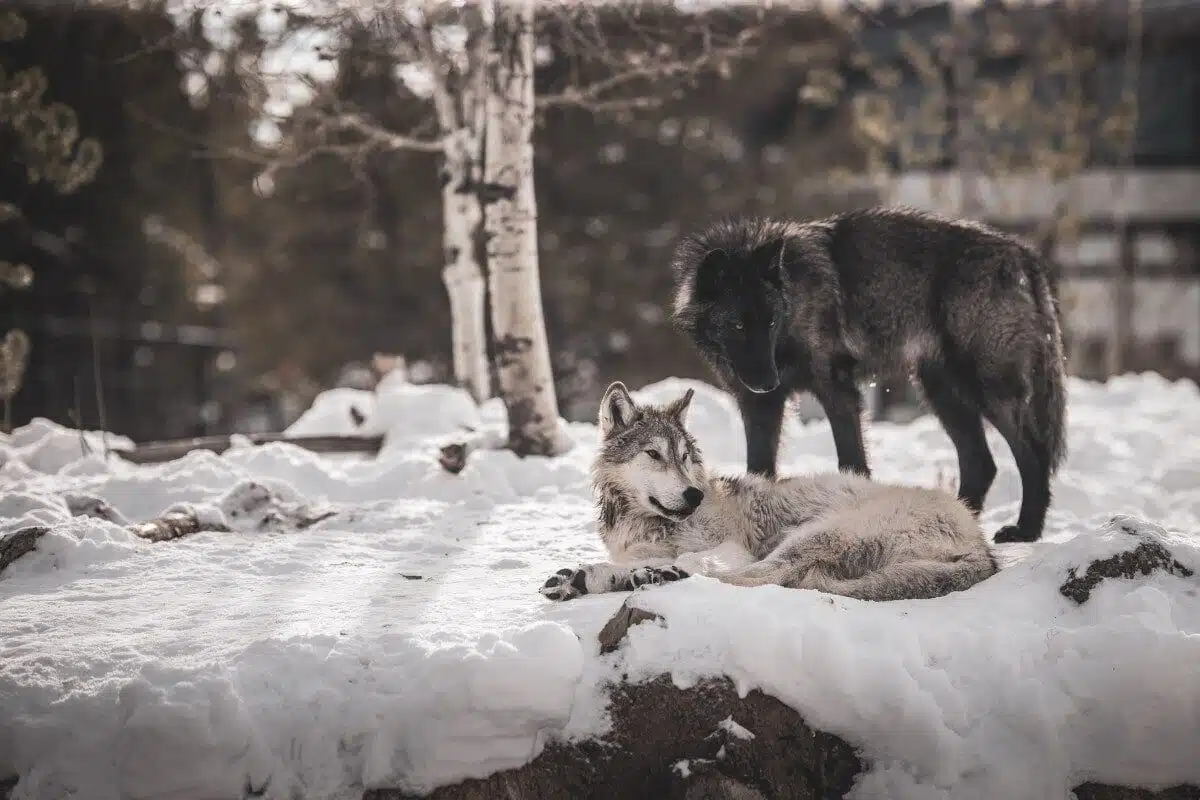
Next up: an inspiring story about two competing wolves.
3. The Two Wolves (Inspiring Short Stories about Life)
An old Cherokee chief sat down to teach his grandson about life.
“There’s a fight going on inside me,” he tells the young boy, “a fight between two wolves.”
“One wolf is evil. It’s full of malice, anger, greed, self-pity and false pride. The other is good. It’s full of peace, love, joy, kindness, and humility.”
“This same fight is going on inside you and everyone else on the face of the earth.”
The grandson was quiet, pondering this revelation for a moment before asking, “Grandfather, which wolf will win?”
The old man smiled and replied, “The one you feed.”
Good and evil exist within each of us. It’s our responsibility to own that reality and do whatever we can to nurture the good.

Motivational stories don’t get much better than this one about starfishes!
4. The Story of the Grateful Starfishes (Inspiring Story about Attitude)
One morning, an elderly man was walking along the beach when he noticed a young boy picking something off the sand and throwing it into the sea.
As he got closer, the man realized the child was throwing stranded starfishes that had washed up on the shore back into the breaking waves.
Approaching the boy, the man asked what he was doing.
“The starfish will die if they’re still on the shore when the sun rises,” he replied.
Perplexed, the old man said, “But that’s pointless! There are countless miles of beach and thousands of starfish. It doesn’t matter how many you return to the water, you can’t make a difference.”
Unfazed, the boy bent down, picked up another starfish, and tossed it into the sea.
“It matters to this one,” he said.
No matter the odds of success or the scale of the challenge, your actions can make a difference. It’s better to light a candle than curse the dark.
Every little counts. Doing something to make a positive change is always better than nothing!

This motivational story is a little sad, but it contains an invaluable lesson on self-belief…
5. The Elephant and the Rope (Best Inspirational Short Stories about Life)
One day a man walked past a camp of elephants.
Looking closer, he was surprised to see that these mighty animals weren’t held in cages or kept in chains.
The only thing stopping them from escaping?
A thin rope tied from one of their legs to a simple pole in the ground.
Confused as to why they didn’t use their strength to break the rope, he asked the trainer why they weren’t attempting to run away.
To this the trainer replied,
“As baby elephants, we use the same system. But, at that age, the rope is strong enough to stop them from escaping. They grow up like this, believing they can never break the rope, so even as adults they stay put.”
In other words, these powerful, magnificent and intelligent elephants didn’t believe they could free themselves, so they never tried.
Our personal beliefs are powerful beyond measure and often dictate our outcomes. They can work for or against us.
Identify your limiting beliefs so you can push against them.
These confidence affirmations should help!

Here’s another of my favourite inspirational short stories! This one’s about an exchange between a fisherman and a businessman…
6. The Fisherman and the Businessman (My Favourite Motivational Story)
Once upon a time there was a businessman who was sitting on the beach in a small Italian village.
As he sat, taking a brief break from the stress of his daily schedule, he saw a fisherman rowing a small boat back into the harbour. In the boat were a few large fish.
Impressed, the businessman asked the fisherman, “How long does it take you to catch so many fish?” To which he replied “Oh, not so long.”
The businessman was confused, “Why don’t you fish for longer to catch even more?”
“More? This is enough to feed my entire family and even offer some to my neighbours,” the fisherman said.
“So what do you do for the rest of your day?” Enquired the businessman.
The fisherman replied, “Well, I’ve usually have caught my fish by late morning, at which point I go home, kiss my wife, and play with my kids. In the afternoon, I take a nap and read. In the evening, I go to the village to have a drink with my friends, play guitar, sing, and dance into the night!”
Putting his entrepreneurial hat on, the businessman offered a suggestion.
“I have a PhD in business! I can help you become much more successful. From now on, you should spend longer at sea and catch as many fish as possible. When you’ve saved enough money, buy a bigger boat to catch even more fish. From there, you’ll soon be able to buy more boats, set up your own company, build a production plant to can the fish and control distribution, and move to the city to control your other branches.”
To this, the fisherman asks, “And after that?”
The businessman laughs, “After that, you’ll be able to live like a king, take your company public, float your shares and be rich!”
“And after that?” Asks the fisherman once more.
“After that, you can retire, move to a house by the sea, wake up early in the morning to go fishing, then return home to play with your kids, kiss your wife, take a nap in the afternoon and join your friends in the village to drink, play guitar and dance into the night!”
Puzzled, the fisherman replies, “But isn’t that what I’m doing already?”
Be content with what you have. Do you really need to keep pushing for more ? Stress is often a choice. There’s joy and peace in simplicity.

Want a short story about motivation and karma? This one about a baker and some butter may do the trick…
7. The Baker and the Butter (Short Story about Motivation and Fairness)
A long time ago, a baker and a farmer lived in the same small English village.
These two men had a friendly arrangement in place, where the farmer would sell a pound of butter to the baker each day.
One morning, the baker decided to weigh the butter to see if he’d received the correct amount.
To his surprise, he discovered that the farmer had sold him less butter than he’d paid for.
Angry about the unfairness, he took the farmer to court.
At the hearing, the judge asked the farmer whether he used any measure to weigh the butter.
“Your honour, I am but a lowly farmer and do not own a proper measure. I simply use an old-fashioned scale,” he replied.
“How do you weight the butter then?” Enquired the judge.
To this the farmer answered:
“Your honour, long before the baker started buying butter from my farm, I’ve been buying a pound loaf of bread from him. Every day when he brings me the bread, I place it on my scale and give him the same weight in butter. If anyone is to be blamed, it’s the baker.”
Karma’s a bitch! Be kind and fair to others and you’ll enjoy the rewards.

If you’ve ever read The Bell Jar by Sylvia Plath, you may have already come across this next inspirational short story…
8. The Story of the Fig Tree (From “The Bell Jar”, by Sylvia Plath)
I saw my life branching out before me like the green fig tree in the story. From the tip of every branch, like a fat purple fig, a wonderful future beckoned and winked.
One fig was a husband and a happy home and children, and another fig was a famous poet and another fig was a brilliant professor, and another fig was Ee Gee, the amazing editor, and another fig was Europe and Africa and South America, and another fig was Constantin and Socrates and Attila and a pack of other lovers with queer names and offbeat professions, and another fig was an Olympic lady crew champion, and beyond and above these figs were many more figs I couldn’t quite make out.
I saw myself sitting in the crotch of this fig tree, starving to death, just because I couldn’t make up my mind which of the figs I would choose.
I wanted each and every one of them, but choosing one meant losing all the rest, and, as I sat there, unable to decide, the figs began to wrinkle and go black, and, one by one, they plopped to the ground at my feet.
Decide! Take action.
There’s no right or wrong answer when you’re choosing between two positive routes or outcomes. Wait too long and the decision will be made for you.

Searching for inspirational stories with a moral about happiness? Check out this next one…
9. The Pursuit of Happiness (Stories for Inspiration and Happiness)
There was once a group of 100 people attending a seminar on personal development.
In the middle of their talk, the speaker stops and decides to run an impromptu group activity. He hands out a balloon to each attendee and tells them to write their name on it.
The balloons are then collected and placed in an adjacent room.
The speaker then instructs the 100 attendees to enter that room and, within 5 short minutes, find the balloon with their name on it.
Pandemonium breaks loose as they charge in, pushing and colliding with each other as they desperately search for their name.
The 5 minutes pass and nobody succeeds.
The speaker then tells each person to pick up any random balloon and give it the person whose name is written on it. Within a few minutes everyone has their balloon back.
He then said, “What just happened with those balloons is exactly what happens in our search for happiness. We frantically look for it all around us, not knowing where it is.”
“Yet our happiness lies in the happiness of others. By giving them their happiness, you get yours.”
Moral of the story :
Happiness and fulfilment rarely come from selfish pursuits, but almost always come from doing good deeds for others. By helping others we help ourselves.

Next up: an inspiring short story about an indecisive ass!
10. Buridan’s Ass (Motivational Short Story about Decision Making)
A hungry ass finds himself between two equally large and delicious-looking bales of hay.
He looks from one to the other and back again, unsure which to choose.
This goes on for a long while until, unable to make a decision, the poor old donkey dies of starvation.
Once again, take action! Don’t linger too long on the precipice of a big (or small) decision when the outcomes are positive.
Save yourself a headache, take a leap of faith, commit, and enjoy whatever rewards that come your way, refusing to look back at what could have been.

If you’re trying to find true stories for inspiration, then this one about an Ancient Chinese army general could fit the bill…
11. The Clever General (A True Motivation Story!)
Thousands of years ago there was a famous Chinese general with a reputation for being an astute and cunning leader.
One day, at the end of a long campaign, this general decided to stop in a stronghold with a small battalion of soldiers, sending his main fighting force ahead to rest elsewhere.
Meanwhile, one of his enemies catches wind of this and decides to march his army of hundreds of thousands of soldiers on the general’s all-but defenceless position.
In the middle of the night, the general’s awoken by one of his men, who breaks the news:
The enemy’s close. They’ll be there before daybreak and the tiny band of soldiers in the stronghold will be no match for their numbers.
Hearing this, the general stops and pauses.
Understanding his predicament, he instructs his men to stand down, open the gates, take down the banners from the walls, and hide.
The general then removes his armour, dons a cloak, and sits on the battlements playing a mandolin as he looks out at the approaching army.
The enemy leader soon arrives. He recognizes the general immediately.
And orders his forces to halt.
He stops to think. He knows this general better than anyone, including his reputation for wily deeds and setting deadly traps. He waits some more.
The presence of this infamous general, sitting there with such nonchalance, makes him question himself. Was the information he received false? Is the general luring him into a trap?
Or is it a double bluff?
Is this a ploy to make him question himself and the general is, in fact, as defenceless as he seems?
He waits some more…And then he orders his forces to retreat.
First, your reputation is crucial and can deliver all sorts of positive outcomes.
Second, there’s often a cleverer, more strategic way to achieve your goals. Never assume it takes sweat, blood and tears. Look for a method of attaining the same results with less effort.

The plotline of many motivational short stories involves slaying a proverbial dragon!
12. The Dragon and the Treasure
In many ancient myths and stories the hero has to go on a long and perilous journey to complete their mission. A classic example?
The sleepless dragon that guards its treasure, breathing fire on anyone who so dares to steal it.
To get the gold, the knight in shining armour must, through guile or force, first defeat this beast.
Success lies on the other side of effort, which makes suffering part of the process.
Rather than avoid discomfort then, the ambitious must pursue it at all costs. Only by butting heads and pushing through such suffering will they ever attain the proverbial gold.

Feeling lazy? The next tale on this list of short stories for motivation should help!
13. The Queen’s Boulder (Short Stories about Motivation and Effort)
In ancient times there was a queen who ordered her soldiers to manoeuvre a boulder into the middle of the main road to and from town.
The queen then hid, watching to see who would stop to do the right thing and move it out of the way again.
Wealthy merchants and courtiers passed the boulder, barely giving it a second thought. A few of them blamed their queen for not keeping the roads clear. Yet none stopped to do anything.
One day, a peasant walked along with a sack of vegetables to sell at market.
He stopped, laid these down, and then pushed, tugged, huffed, and heaved the stone away.
Upon picking up his vegetables, the peasant saw a large purse full of gold and a handwritten note from the queen herself where the boulder had been.
The gold was a reward for whoever removed it from the road.
Laziness will never get you anywhere in life. Success almost always takes humility and hard work. Read these quotes about laziness for more insights on this topic!

Short stories about life don’t get much better than this one about a pear tree.
14. The Pear Tree and the Seasons of Life (Short Motivational Stories with a Moral)
There was once a man who had four young sons.
Wanting to teach them about the dangers of judging things too rapidly, he decided to send each of them on a journey, one after the other, to a distant pear tree.
Each son when in a different season, the first in winter, the second in spring, and so on.
At the end of the year he brought his children together and asked them what they’d seen.
The son who’d travelled in winter described a gnarled, twisted, and barren tree that stood stark and ugly against the land.
The son who went in spring disagreed. No, he said, the tree seemed full of hope and promise, with green buds along its branches.
The third son, who’d travelled in summer, disagreed once more. The pear tree he’d seen was covered in beautiful blossom that looked and smelled divine.
Finally, the last son, who’d made the journey in fall, disagreed again, describing a tree laden with sweet and delicious pears that tasted better than any he’d eaten before.
When each son had spoken, the father said they were all correct, because they’d only seen but one season of the pear tree’s life.
He explained to his sons that it’s foolish and impossible to judge something in this manner.
The essence of something, whether it’s a tree or their fellow man, can only be measured as a whole, at the end of the year, having seen it in its fullness. To make your judgment in winter is to miss the promise of spring, the beauty of summer, and the fruit in fall.
Refuse to judge yourself, life, or other people based upon a single mistake or challenging time. Refuse to let the pain of one season destroy the joy of those to come.

Last but not least on this list of inspiring short stories about life, we turn to a story about lumberjacks to teach us something about working smart as well as hard.
15. The Story of the Lumberjacks (Stories about Inspiration and Productivity)
Two lumberjacks of equal skill, experience, and stature work side by side, chopping down trees together every single day.
However, one lumberjack works non-stop, without taking a break, whereas the other takes an hour-long lunch break every afternoon.
Despite working for less time, both lumberjacks inevitably chop the same number of trees by the end of each working day.
Puzzled and frustrated, the lumberjack who works all day long asks the other how he manages to chop just as much as him while still taking a break.
To this, he responds:
“It’s simple. I spend that hour at home sharpening my axe.”
Breaks are vital to productivity. Work smart not hard!
Don’t Forget These Short Stories for Motivation!
Short motivational stories are some of the best sources of inspiration out there.
For me, personally, something about these memorable and emotive tales never ceases to shift my thinking, spark newfound enthusiasm, and convince me to do things differently in my life!
Have you been searching for inspiring stories of this nature recently?
Well, having covered 15 short inspirational stories with a moral on a variety of important topics, I hope this post has helped.
Looking for more ideas on inspiration? Click here !
2 thoughts on “15 Short Inspirational Stories with a Moral [Motivational stories]”
This is wonderful! I.m glad I found This sight.
This is so inspiring. Thanks for sharing.
Comments are closed.
20 Best Short Stories With A Moral Lessons For Kids
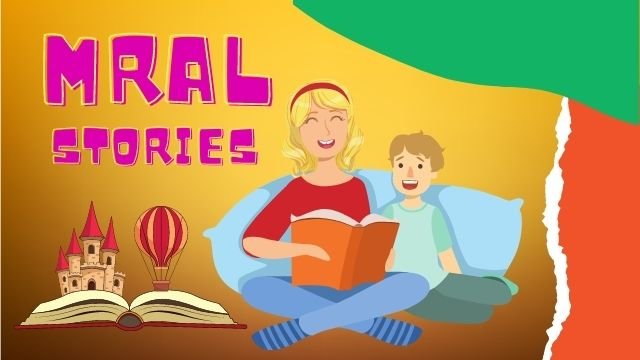
stories with a moral
When it comes to teaching kids a valuable moral lesson, most parents turn to short stories. It not only piques their interest, but it also teaches children valuable life lessons.
Short stories have a unique method of imparting knowledge that makes them more accessible and engaging. Rather than simply reminding your kid not to lie, offering them a brief tale about what happens when they do will help them grasp what happens when they do. It assists individuals in becoming more conscious of their behaviors and the implications of those actions. As youngsters get older, the moral lessons from these stories assist to build their character and moral compass.
Above are 20 short stories with moral teachings from which your kids (and even some adults) can learn:
1. The Ants and the Elephant
Once upon a time, there was a haughty elephant who used to bully smaller creatures. He’d go to an anthill near his house and spray the ants with water. Because of their size, the ants could only cry. The elephant simply chuckled and threatened the ants with death by crushing them. The ants had had it and decided to teach the elephant a lesson one day. They jumped into the elephant’s trunk and began biting him. The elephant could do nothing but howl in agony. He realized his error and apologized to the ants as well as all the other animals he had harassed.
The moral to this story:
Maintain a humble demeanor and treat everyone with respect. If you believe you are stronger than others, instead of injuring them, use your strength to protect them.
2. The Poor Slave and the Lion
Once upon a time, there was a slave who was mistreated by his master. He couldn’t stand it any longer and fled to the forest to seek refuge. He came upon a lion who was unable to move due to a thorn in its paw. Despite his fear, the slave summoned his bravery and extracted the thorn from the lion’s paw. When the lion was finally free of the thorn, he dashed into the jungle, oblivious to the slave’s presence. The slave was eventually apprehended in the jungle by his master, along with some animals. The slave was then thrown into the lion’s den by the master. The slave recognized the lion as the one he had aided in the wilderness. The slave was able to flee the den without being hurt, and he was able to free all of the other animals.
Your good deeds will always find a way to come back to you. So do good things and treat others with kindness, and the world will return the favor.
3. The Ugly Duckling
This is one of the most well-known fairy stories in the world, and most of us have heard of it. The plot centres around a duckling who has always felt different from his brothers since birth. He was constantly teased since he didn’t look like the other kids. He had had enough and rushed away from the pond where he had grown up. He traveled far and wide in search of a family who would embrace him. Months passed, seasons changed, but no one wanted him because he was such an unattractive duck. Then he came across a family of swans one day. When he looked at them, he realized he had transformed into a lovely swan during the months he had spent hunting for a family to call his own. He suddenly realized why he never looked like the rest of his siblings: he is a swan, not a duck.
We should not pass judgment on others just based on their outward appearance. Just because someone doesn’t suit societal beauty standards doesn’t mean they’re unattractive. Each of us is lovely in our way, and it’s past time we accepted and celebrated our differences.
4. The Boy Who Cried Wolf
Once upon a time, there was a shepherd boy who enjoyed playing tricks. While keeping an eye on the herd, the boy decided to play a joke and screamed out, “wolf! wolf!” People who had heard him hurried over to assist him. They were upset, however, when they discovered that there was no wolf and that the boy was mocking them. He did it again the next day, and many came to his rescue, only to be let down once more. The child observed a wolf devouring one of his lambs on the third day and cried out for rescue. However, many who heard him assumed it was simply another of the boy’s pranks, and no one came to his aid. The wolf took some of the boy’s livestock that day.
If you lie and cheat on other people all of the time, no one will believe you at some point.
5. The Grasshopper and the Ant
The grasshopper and the ant were best friends. During the summer, the ant works tirelessly to stock his food storage. The grasshopper, on the other hand, was taking advantage of the pleasant weather by playing all day. When winter arrived, the ant was snug in his home, surrounded by the food he had stored over the summer. While the grasshopper was hungry and cold in his home. He requested food from the ant, and the ant obliged. However, it was insufficient to see us through the winter. When he tried to ask the ant again, he was told, “I’m sorry, my friend, but my food is only enough for my family to live till the end of the winter.”
If I give you any more, we’ll all go hungry. We had the entire summer to prepare for the next winter, but you decided to play.”
In this story, winter depicts a period in our lives when food and resources are in short supply. Summer, on the other hand, is the season of abundance. So, if you have a lot today, set aside some for the winter.
6. The Grapes and the Fox
Once upon a time, a hungry fox came across a vineyard. The fox drooled as he saw the round, luscious grapes hanging in a group. But no matter how high he leaped, he was unable to reach it. So he rationalized that it was probably sour and walked away. He had to sleep on an empty stomach that night.
The majority of us have a proclivity to act like a fox. We makeup reasons when we want something but believe it will be too difficult to obtain. Instead of working hard for it, we persuade ourselves that it’s probably not that great.
7. Lazy John
John, a boy who was so sluggish that he didn’t bother to change his clothes, was one of them. He saw the apple tree in their yard was laden with fruit one day. He wanted to eat some apples but was too sluggish to climb the tree to get them. As a result, he sat down beneath the tree and waited for the fruits to fall. John waited and waited until he was ravenous, but no fruit dropped.
You can’t get anywhere by being lazy. If you desire something, you must put forth a lot of effort.
8. The Thirsty Crow
A thirsty crow wandered the woodland in quest of water after flying a long distance. Finally, he came across a half-filled water pot. He tried to drink from it, but his beak was too short to reach the interior water. He then saw pebbles on the ground and placed them in the pot one by one till the water level reached the brim. The crow quickly drank from it, satiating his thirst.
There is a way if there is a will. If we look hard enough and don’t give up, we can find a solution to any difficulty.
9. The Dog and the Bone
Once upon a time, there was a dog who roamed the streets at all hours of the day and night in quest of food. He came across a large juicy bone one day and instantly snatched it between his teeth and carried it home. He crossed a river on his way home and observed another dog with a bone in its mouth. He was also after that bone for himself. However, the bone he was biting fell into the river and sank as he opened his jaws. He went home famished that night.
If we continuously envy what others have, we, like the greedy dog, will lose what we already have.
10. The Tortoise and the Hare
Once upon a time, there was a hare who was friends with a tortoise. He challenged the tortoise to a race one day. The hare assumed that because the tortoise was moving so slowly, he would easily win. As a result, he took a nap as the tortoise continued on his way. When the hare awoke, the tortoise had already crossed the finish line. The tortoise, much to his dismay, won the race while he was napping.
This narrative can teach us a few moral lessons. Overconfidence, according to the hare, can lead to disaster. The tortoise, on the other hand, teaches us the value of tenacity. Never quit up, even if everything seems to be against you. It’s not always about who’s the quickest or strongest in life; it’s sometimes about who’s the most reliable.
SHORT MORAL STORIES FOR KIDS
Stories are an excellent technique to teach kids the difference between good and wrong. They also assist students in gaining a general awareness of human ethics and behavioral tendencies. We grew up reading and listening to Panchatantra stories, Tinkle, Amar Chitra Katha, and Jataka tales as youngsters, and we may not realize it, but those short moral stories for kids have played an important role in shaping who we are today.
These educational stories for kids instill values, ideas, and principles that form the bedrock of our characters. That is why it is critical to passing down these morally instructive short stories to help kids grow into well-rounded adults.
We’ve compiled a compilation of short moral stories for kids that are still relevant today. Plus, we’ve hand-picked a few modern stories from kidsstory.org that have symbolic, underlining meanings.
11. The Midas Touch
King Midas is the subject of this English kid’s fable. Midas, a tremendously wealthy king, lived in Ancient Greece. He had all he could have wished for and more, as well as a lovely daughter whom he cherished even more than his wealth.
Silenus, a satyr loyal to Dionysus, the God of Wine and Celebration, passed out in Midas’ garden one day. Midas went despite his family’s desires and let Silenus snooze in his palace until he awoke again, believing that satyrs brought him good luck.
When Dionysus learned of Midas’ generosity to his friend, he decided to grant the wealthy king a request. Midas wished that everything he came into contact with would turn to gold. Even though Dionysus was well aware that this was a formula for disaster, he still granted the desire. Midas was overjoyed, and he went around touching everything in the garden and palace to turn everything into gold. He transformed an apple into a gleaming gold apple when he picked it up. The courtiers were all enthralled.
Midas had never been happy in his life… He caressed his daughter, completely forgetting that anything he touched would turn to gold! As a result, his daughter became a dead gold statue. Midas hurried to Dionysus and asked God to save his daughter after realizing what he had done. Dionysus spared his daughter and took away all of Midas’ powers to fulfill his wish, claiming that it was for the best. Midas had learned his lesson and was content with what he had for the rest of his life.
Moral of the story : Don’t be greedy; be happy with what you have.
12. The Musical Donkey
Udhata, a skinny donkey who had been famished by his owner, a local fisherman, set off in quest of food with his jackal companion. In the middle of the night, the two went about the village until they came across a cucumber field. They enjoyed their supper so much that night that they resolved to visit the cucumber field every night. Udhata gradually improved her appearance and was able to carry greater weight.
The donkey insisted on singing after a delicious and nutritious dinner of cucumbers. Although the jackal warned him that this was a bad idea, the stubborn donkey refused to listen to his pal. Even when the jackal told the donkey that his voice wasn’t very lovely, Udhata rejected the jackal’s remark, supposing the jackal was jealous. He informed the jackal that he was pleased with himself, and there’s nothing wrong with that. The jackal admonished him once more about his foolish behavior and how he was causing trouble for himself by distracting the guards. The foolish donkey, on the other hand, would not budge.
The jackal halted the donkey’s singing and told him to wait till the jackal jumped over the other side of the fence for his protection. Outside, the jackal chose to wait. The guard naturally awoke from his nap when he heard the donkey’s loud braying noise. When the guard saw Udhata, he smacked him in the face hard. He didn’t hold back and directed all of his rages onto the donkey, who was sincerely remorseful for not following his friend’s advice. The donkey was scarcely able to move after he finished. Despite this, he managed to drag his limp body out of the field, where the jackal had been waiting. “I told you so,” his friend remarked with a compassionate expression on his face.
Moral of the story : Think before you act.
13. The Clever Monkey
Once upon a time, there was a wise monkey who lived on a tree that produced fresh, delectable fruit. A day came when a crocodile swam up to the tree and informed the monkey that he had traveled a great distance and was completely fatigued. The crocodile had been on the lookout for food and was ravenous. When the crocodile heard this, the friendly monkey brought him a couple of berries, which the crocodile gratefully accepted. He asked the monkey whether he may come back for some fruit soon. The monkey nodded enthusiastically.
The crocodile reappeared the next day, then the next, and so on. This became a daily practice for them, and they became excellent friends as a result. They talked about what was going on in their lives and confided in one other as all friends do. The crocodile informed the monkey about his wife, who resided on the opposite bank of the river. As a result, the crocodile was given some extra berries by the generous monkey to take home for his wife.
They ate berries together while the crocodile and the monkey grew closer as friends. The crocodiles would frequently receive additional berries from the monkey, which he would take home for his wife. The crocodile’s wife became envious of the two buddies because of their tight friendship. She was determined to end their friendship. She reasoned that if the monkey could survive on a diet of delectable fruit, his flesh must be exceptionally sweet. As a result, she requested that the crocodile invite his friend to supper. The crocodile declined because he suspected his wife was planning something nefarious. She was, nonetheless, adamant upon eating the monkey’s flesh.
She feigned to be sick and told the crocodile that her doctor said the only thing that could save her was a monkey’s heart. Hearing this, the crocodile dashed to the monkey’s branch and pretended to be his wife, telling him that she had cooked a delicious dinner for them. The monkey nodded enthusiastically and climbed onto the crocodile’s back. The monkey observed the crocodile sinking around halfway through. Fearful, the monkey inquired as to why his comrade was acting so strangely. The crocodile was straightforward in his explanation of the problem.
He was in an unpleasant situation, the wise monkey explained, because he had left his heart at home. He would gladly give his heart away to nurture the crocodile’s wife back to health if the crocodile took him back. The crocodile was fooled by the monkey’s brilliant deception and dashed back to the tree to steal the monkey’s heart. The monkey dashed up to safety as soon as they arrived, telling the crocodile to tell his wife that she had married an idiot!
Moral of the story : Stay calm and use your presence of mind to pull yourself out of a bad position.
14. The Lion Who Resurrected
This is the story of four intelligent and well-informed buddies. Subuddhi, the fourth, wasn’t very highly educated or insightful, but he did have one attribute that his scholarly peers lacked: common sense.
Three of the buddies decided to look for work in other cities and villages when the time came. They desired monetary compensation in exchange for their expertise. After all, it was pointless to be so knowledgeable about the scriptures and sciences if they weren’t going to benefit from it. The three friends did not want to bring Subuddhi because of his lack of intelligence, but they decided to invite him nonetheless because he was an old childhood friend.
The four companions embarked on a long journey, traveling from one town to the next in search of work. They came across a collection of bones under a tree while going through a deep jungle. They believed that this was an excellent opportunity to demonstrate their abilities.
The first friend put the bones together into a skeleton with his abilities. When the skeleton was finished, the second companion repeated a mantra, which caused flesh and meat to grow on it. It had the appearance of a dead lion. The fourth buddy intervened just as the third friend was ready to put an end to the performance by resurrecting the lion. Subuddhi knew the fearsome lion would not spare them once it was brought back to life.
The third friend, on the other hand, disregarded his counsel, mocked him, and pushed forward with something that was clearly a horrible idea. Subuddhi immediately climbed a nearby tree to protect himself as the third companion began to chant, resurrecting the lion. The lion killed all three of the knowledgeable friends, as predicted by the fourth friend, while Subuddhi rushed back to the hamlet alive.
That’s all there is to it, guys! We hope you enjoyed these motivational stories and that you will share them with your children. If you’re looking for additional short moral stories for kids, the kidsstory.org is a great place to start. We have books with interesting stories that are excellent for developing character and personality. In the comments, tell us about your favorite moral stories from childhood, and don’t forget to share them with your kids!
Moral of the story : Never give up.
Short Moral Stories That Teach Important Lessons
Morals and messages embedded in stories are always compelling. It’s incredible how effective a 200-word story can be.
Our first list of short stories was so popular that we decided to make another one, this time with each story having a simple moral.
Short Moral Stories
Some of these tales are brief and straightforward. Some are so simple that they’re almost certainly found in children’s books. The message’s power, however, remains unchanged.
Here are some more of the best moral stories in short form:
15. An Old Man Lived within the Village

In the village, there was an old man. He was one among the world’s most unfortunate individuals. The entire community was sick of him; he was always pessimistic, always complaining, and always in a foul attitude.
The longer he lived, the more bile he produced, and the worse his words became. People steered clear of him because his misery had spread. Being happy next to him was even unnatural and offensive.
Others were made unhappy by him.
But then, when he was eighty years old, something extraordinary happened. Almost immediately, everyone heard the rumor:
“An Old Man is cheerful today; he doesn’t complain about anything, grins, and even has a new look.”
The entire village had gathered. When the old guy was questioned, he was asked:
Villager: Can you tell me what happened to you?
“There’s nothing unique about it. I’ve been chasing happiness for eighty years, and it’s been fruitless. Then I decided to live without happiness and simply appreciate life. That is why I am now content.” – An Old Man
The moral of the story is to not seek happiness. Have fun with your life.
16. The Wise Man

People had been going to the wise man for years, talking about the same issues. He told them a joke one day, and they all burst out laughing.
He told them the same joke after a few minutes, and only a handful of them grinned.
No one laughed when he delivered the same joke for the third time.
With a smile, the wise man said:
“You can’t laugh at the same joke over and over.” So, what makes you cry over and over again about the same thing?
The moral of the story:
Worrying is a waste of time and energy that will not fix your difficulties.
17. The Foolish Donkey

Every day, a salt salesman would ride his donkey to the market with his salt sack.
Along the way, they had to cross a brook. The salt bag and the donkey both went into the water as the donkey tumbled down the creek one day. Because the salt dissolved in the water, the bag became extremely light to carry. The donkey was overjoyed.
The donkey then began to repeat the same trick every day.
When the salt vendor realized the ploy, he resolved to give it a lesson. The next day, he loaded a cotton sack onto the donkey.
It tried the same method once more in the hopes of making the cotton bag lighter.
However, the wet cotton became extremely heavy to carry, and the donkey suffered as a result. It had learned a valuable lesson. After that day, it no longer worked, and the vendor was pleased.
The moral of the story is that luck does not always favor you.
18. Having A Best Friend

Two buddies were walking through the desert, according to legend. During the journey, they got into a disagreement, and one of them slapped the other in the face.
The person who was smacked was upset, but instead of saying anything, he scribbled in the sand.
“My best friend hit me across the face today.”
They continued going till they came to an oasis and decided to take a bath. The person who had been slapped became caught in the muck and began drowning, but was rescued by a friend. He wrote on a stone once he recovered from his near-drowning.
“My best friend saved my life today.”
He was asked by the friend who had slapped and saved his closest friend:
“You wrote in the sand when I harmed you, and now you write on a stone, why?”
The other person responded,
“When someone wrongs us, we should scribble it in sand and let the winds of forgiveness sweep it away. When someone does anything nice for us, however, we must inscribe it in stone so that no wind can ever wipe it away.”
The moral of the story :
Don’t appreciate what you have in your life. However, appreciate those you have in your life.
19. The Fox & The Grapes

A fox was wandering through the woods one day when he noticed a bunch of grapes hanging from a high limb.
“Just the thing to quench my thirst,” he thought to himself.
The fox took a few paces back and leaped, just missing the dangling grapes. The fox stepped back a few yards and attempted to reach them again, but was unsuccessful.
Finally, the fox gave trying and turned up his nose, saying, “They’re probably sour anyway,” before walking away.
It’s all too simple to resent something you can’t have.
20. The Poor Slave and the Lion

A slave flees to the wilderness after being mistreated by his owner. He stumbles upon a lion who is in excruciating pain due to a thorn in his paw. The slave bravely advances and delicately removes the thorn.
Without injuring him, the lion flees.
A few days later, the slave’s master goes hunting in the forest and captures a large number of animals, which he then cages. The master’s men spot the slave and capture him, bringing him to the nasty owner.
The slave is ordered to be thrown into the lion’s cage by the master.
The slave is in the cage awaiting his death when he realizes it is the same lion he had aided. The lion and the other captive animals were rescued by the slave.
Helping those in need is a good thing to do since we reap the benefits of our good deeds.
Parents are constantly on the search for good moral stories for their children. However, at KathaKids, we think that even if the morals of stories aren’t explicitly stated, children learn them. The takeaway, or moral of the story, is apparent when a story is well-written. Lessons like these are assimilated far more readily than those that are spelled out.
We also don’t believe that children should be spoon-fed morals. Rather, we believe that stories stimulate children’s imaginations. This may prompt discussions with their parents and peers about the story and what they learned from it. (When we encouraged kids to come up with their morals for the stories they read, they were extremely enthralled!) And this is a genuine learning process.
Having said that, we recognize that parents may require assistance in finding moral stories for their children, possibly to tie to an incident that has occurred in their daily lives.
If you’re seeking moral stories for children, Kidsstory.org has a selection of them.
The Princess And The Pea Story
Choose best story for kids with moral lessons, related articles.
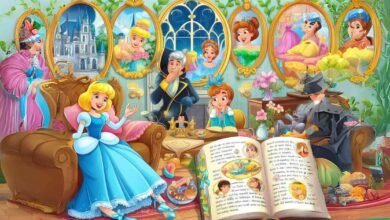
Cinderella | Going To Bed Stories For Children

A Caterpillar’s Voice

A Donkey to Market

The Story of the Empty Pot: Jun’s Epic Journey
- Pingback: 10 Best Short Moral Stories for Kids + Moral Lesson
- Pingback: Short Story The Last Forest – Engaging Kids’ Tale
- Pingback: Short Kids Story Donkeys | Engaging Tales for Children
Leave a Reply Cancel reply
Your email address will not be published. Required fields are marked *
Privacy Overview
When You Write
A Short Story That Teaches A Lesson: The Power Of Morality In Fiction
Do you remember the last time you were so engrossed in a story that you forgot where you were? The power of fiction lies in its ability to transport us to different worlds, where we can experience emotions and lessons that we may not encounter in our daily lives.
And when it comes to lessons, moral storytelling can be particularly impactful. A short story that teaches a lesson can stay with us long after the last page is turned, influencing our thoughts and actions in unexpected ways.
But what makes a moral story effective? Is it the message itself, or the way it is presented?
In this article, we will explore the power of morality in fiction, and how it can be used to create engaging and emotionally resonant stories. Whether you are a reader looking for inspiration, or a writer seeking to improve your craft, we hope this exploration of moral storytelling will leave you with a deeper appreciation for the power of words.
Key Takeaways
- Moral storytelling can have a powerful impact on readers by transporting them and teaching them lessons.
- Effective moral storytelling requires relatable characters and situations, consequences and lessons learned, and emotional impact on readers.
- Fictional stories that deal with moral issues help us to explore our own values and beliefs, and can inspire change and shape beliefs and perspectives.
- The power of moral fiction lies in its ability to shape both individual and societal values, making it a crucial tool for promoting positive change.
The Importance of Moral Lessons in Fiction
You can’t help but feel connected to characters who face moral dilemmas. When we read a story about someone struggling with their conscience, we see a reflection of our own inner conflicts. It’s through their struggles that we learn valuable lessons about our own lives. This is the power of moral storytelling in fiction.
It allows us to explore the complexities of moral dilemmas and find empathy for those who face them. The role of empathy and relatability in moral storytelling cannot be overstated. When we read about characters who face tough ethical decisions, we are forced to put ourselves in their shoes.
We consider what we would do in their place, and we develop a deeper understanding of what it means to be human. Fictional stories that deal with moral issues help us to explore our own values and beliefs, and they challenge us to think about the world in a new way. By engaging with these stories, we become more empathetic, more compassionate, and more aware of the complex nature of morality.
The Elements of Effective Moral Storytelling
When it comes to effective moral storytelling, three key elements come to mind:
- Relatable characters and situations
- Consequences and lessons learned
- Emotional impact on readers
You want your readers to be invested in the characters and their struggles, and to see themselves or people they know in the situations presented in the story.
The consequences of the character’s actions should be clear and meaningful, leading to valuable lessons that can be learned.
And finally, the emotional impact of the story should be powerful, leaving readers with a lasting impression and a desire to share the story with others.
Relatable Characters and Situations
As a reader, it’s easy to become invested in the relatable characters and situations presented in a story, allowing us to connect with the moral lessons on a deeper level. When we see characters facing situations that we ourselves have experienced, it creates a sense of familiarity that draws us in and helps us empathize with them.
This empathy is crucial for effective moral storytelling, as it allows us to see the world through the eyes of others, and ultimately, to learn from their experiences.
To make the characters and situations in a story relatable, authors often incorporate universal themes that resonate with readers across cultures and time periods. These can include themes like love, loss, betrayal, and redemption, which are all experiences that most people can relate to on some level.
By exploring these themes through the lens of relatable characters, authors are able to create stories that are both emotionally impactful and thought-provoking. When we see characters overcome challenges and learn valuable lessons, it inspires us to do the same, making us better people in the process.
Consequences and Lessons Learned
By exploring the consequences of characters’ actions and the lessons they learn, authors can create thought-provoking and emotionally impactful stories.
When characters face the consequences of their actions, whether positive or negative, they have the opportunity for personal growth. This growth can manifest in a multitude of ways, from realizing the error of their ways and seeking forgiveness to standing up for what they believe in and making a positive change in their world.
The lessons learned by characters in fiction can also have real-world application. As readers, we can learn from the mistakes and successes of fictional characters and apply those lessons to our own lives. This is the power of morality in fiction – it allows us to explore the consequences of our actions and the lessons we can learn from them, all within the safe confines of a story.
By incorporating personal growth and real-world application into their stories, authors can create narratives that not only entertain but also inspire change.
Emotional Impact on Readers
Immerse yourself in a well-crafted narrative and you’ll find yourself feeling the emotional impact of the story’s twists and turns. The power of morality in fiction lies in the emotional impact it has on readers.
By exploring the psychology behind emotional impact, writers can create stories that resonate with readers long after they’ve finished the last page.
Analyzing reader responses is key to understanding the emotional impact of a story. When readers become emotionally invested in a character’s journey, they’re more likely to remember the lessons learned.
By creating characters that readers can relate to on a personal level, writers can explore moral themes that are universally relevant. Whether it’s a story about love, loss, or redemption, a well-crafted narrative can leave a lasting impact on readers, shaping their beliefs and perspectives for years to come.
Examples of Short Stories with Powerful Morals
You’re in for a treat! Let’s delve into the world of short stories with powerful morals.
‘The Lottery’ by Shirley Jackson will have you questioning the traditions of your community, while ‘The Tell-Tale Heart’ by Edgar Allan Poe will send shivers down your spine with its haunting depiction of guilt.
And who can forget ‘The Gift of the Magi’ by O. Henry? It’s a heartwarming tale of sacrifice and love during the holiday season.
These stories are sure to leave a lasting impression on you and make you reflect on the power of storytelling.
“The Lottery” by Shirley Jackson
Step into the world of ‘The Lottery’ and witness the shocking consequences of blindly following tradition. Shirley Jackson’s chilling short story explores the dark side of human nature and the dangers of mindlessly adhering to societal norms.
Set in a small, seemingly idyllic village, ‘The Lottery’ centers around an annual ritual where one person is selected to be stoned to death by the other villagers.
Symbolism runs rampant throughout the story, with objects like the black box and the stones taking on deeper meaning as the plot unfolds. The significance of tradition is also a major theme, as the villagers continue to participate in the lottery despite its horrific outcome.
Jackson’s masterful storytelling keeps readers on the edge of their seats, questioning the morality of the characters and the society they live in. ‘The Lottery’ is a haunting reminder of the power of conformity and the importance of questioning the status quo.
“The Tell-Tale Heart” by Edgar Allan Poe
Listen closely, friend, and let me tell you about a heart that beats like a madman’s drum, driving its owner to the brink of insanity in Edgar Allan Poe’s ‘The Tell-Tale Heart’.
The story is a psychological horror that delves into the mind of an unnamed narrator who is obsessed with an old man’s pale blue eye. The narrator’s obsession with the eye leads him to commit a heinous crime that ultimately drives him to madness.
The power of symbolism and foreshadowing in ‘The Tell-Tale Heart’ can’t be ignored. From the first line of the story, the reader is given a glimpse of what is to come. The narrator tells us that he’s not mad, yet it’s clear that he is.
The sound of the heart beating under the floorboards is a symbol of the narrator’s guilt, and it foreshadows his eventual downfall. The heart’s beating grows louder and more frantic as the story progresses, mirroring the narrator’s own descent into madness.
‘The Tell-Tale Heart’ is a chilling reminder that our actions have consequences, and that guilt can drive us to the brink of insanity.
“The Gift of the Magi” by O. Henry
Take a moment to imagine yourself in the shoes of Jim or Della, the loving couple in O. Henry’s ‘The Gift of the Magi’, who make a selfless sacrifice to show their love for one another.
The irony of sacrifice is a powerful theme that resonates throughout the story, leaving a lasting impact on the reader’s mind.
O. Henry’s writing style is both engaging and emotionally impactful, drawing the reader into the plot and keeping them invested until the very end.
The story follows the couple, who are struggling financially, as they try to find the perfect Christmas gift for one another.
Della sells her beautiful long hair to a wig-maker to buy a chain for Jim’s beloved pocket watch, while Jim sells his watch to buy combs for Della’s hair.
When they exchange gifts, they realize the irony of their sacrifice and the depth of their love for one another.
This heartwarming tale teaches us that true love is about selflessness and sacrifice, rather than material possessions.
O. Henry’s writing style, with its clever use of irony and powerful emotional impact, makes ‘The Gift of the Magi’ a timeless classic that continues to inspire readers today.
Incorporating Morality into Your Own Writing
Incorporating morality into your writing can deepen the emotional impact of your story. J.K. Rowling’s Harry Potter series is a great example of this, where the characters’ choices and actions are guided by their moral compasses. By exploring themes of love, friendship, sacrifice, and redemption, Rowling created a world where the characters face moral dilemmas and make difficult choices that ultimately shape their fate.
By developing characters with strong moral values, readers become invested in their journey and feel a sense of satisfaction when they make morally correct decisions. Crafting a plot and conveying a message through morality can also add depth to your story. By creating a conflict that challenges the characters’ moral beliefs, you can create a sense of tension and suspense that keeps the reader engaged.
As the characters navigate through the moral gray area, readers are forced to confront their own beliefs and values. This emotional connection to the characters and their struggles can create a lasting impact on the reader, leaving them with a message that resonates long after they’ve finished reading.
So, when writing your own stories, don’t be afraid to explore the complex themes of morality and use it as a tool to create a more impactful and memorable story.
The Lasting Impact of Moral Fiction
Experiencing a tale that challenges your beliefs and values can leave a profound and long-lasting impression on your psyche. This is the power of moral fiction.
Stories that explore complex themes and challenge societal norms have real-world applications. They encourage readers to critically examine their own moral compass and consider the impact of their actions on others.
The lasting impact of moral fiction can also be seen in its cultural significance. Stories that explore themes of love, forgiveness, and compassion have the power to shape our collective understanding of these concepts.
By presenting a nuanced portrayal of morality, authors can contribute to broader cultural conversations and inspire readers to become more empathetic and compassionate individuals. The power of moral fiction lies in its ability to shape both individual and societal values, making it a crucial tool for promoting positive change.
You leave the world of fiction, but the power of its morals lingers on.
These stories, with their timeless lessons and relatable characters, have the ability to touch your heart and change your perspective. They’re more than just entertainment, they’re tools for personal growth and societal change.
As you reflect on the short stories that have impacted you, remember that you too have the power to incorporate morality into your own writing.
For as long as people crave stories, there will always be a need for tales that teach us the value of kindness, empathy, and compassion. So use your words to inspire, challenge, and uplift your readers.
Recommended Reading...
Why short stories are important for readers and writers alike, why do authors use short stories the advantages of this genre, why are short stories so hard to write understanding the challenges, what is a novelette exploring the short story genre.
Keep in mind that we may receive commissions when you click our links and make purchases. However, this does not impact our reviews and comparisons. We try our best to keep things fair and balanced, in order to help you make the best choice for you.
As an Amazon Associate, I earn from qualifying purchases.
© 2024 When You Write
- Math for Kids
- Parenting Resources
- ELA for Kids
- Teaching Resources

How to Teach Skip Counting to Kids in 9 Easy Steps
10 Best Math Intervention Strategies for Struggling Students
How to Teach Division to Kids in 11 Easy Steps
How to Teach Place Value in 9 Easy Steps
8 Math Division Tricks: Making Division Fun & Accessible
Simple & Stress-Free After School Schedule for Kids of All Ages
When Do Kids Start Preschool: Age & Readiness Skills
Kindergarten Readiness Checklist: A Guide for Parents
How to Choose Best School For Your Kid: 12 Best Tips
Why Kids Get Bored at School: 10 Tips to Keep Them Interested
6 Effective Ways to Improve Writing Skills
40 Four Letter Words That Start With A
What Are the Stages of Spelling Development: Ultimate Guide
48 Rhyming Words for Kindergarten Kids
How to Teach Vowels to Kids: A Step-by-Step Guide
15 Best Innovative Tech Tools for Teachers
What is Teachers Professional Development: Strategies & More
11 Best Ways to Create a Positive Learning Environment for Kids
How to Encourage Creativity in the Classroom – 9 Best Tips
25 Best Websites for Teachers
5 Amazing Short Stories for Kids That Teach Moral Values
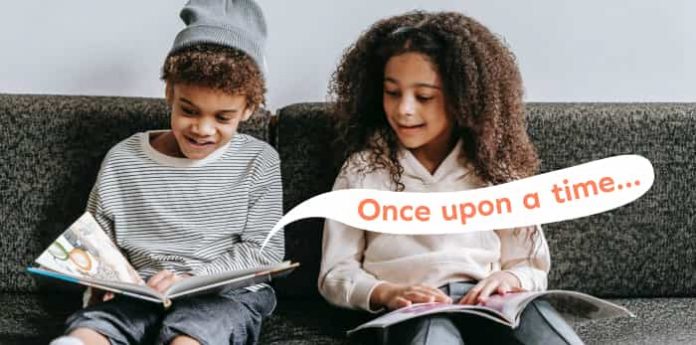
1. The Boy Who Cried Wolf
2. the milkmaid and her pail, 3. the snowy day by ezra jack keats, 4. black beauty by anna sewell, 5. blueberries for sal by robert mccloskey.
It is critical for a child’s growth to instill a love of reading at a young age, not to mention how enjoyable it is! Stories for kids can teach them a lot about life, the world, and themselves.
SplashLearn: Most Comprehensive Learning Program for PreK-5

SplashLearn inspires lifelong curiosity with its game-based PreK-5 learning program loved by over 40 million children. With over 4,000 fun games and activities, it’s the perfect balance of learning and play for your little one.
Stories for kids with morals and exciting characters have numerous advantages and provide bonding opportunities.
Here are some ELA games to educate and engage your kids!
4 Benefits of Short Stories for Kids

1. Cultural Understanding
Children can learn about the world, other countries, and traditions through listening to stories. It can help in the development and understanding of different cultures and countries. A good story for kids urges them to put themselves in the shoes of the story’s protagonist and evaluate their actions and emotions and why they made them.
2. Communication
Reading to a youngster can help them become more open to expressing themselves and communicating their feelings and views.
Ask them questions about the storyline and characters in the story, how each character might advance the plot, and why they believe the character has acted in a certain way.
When reciting a story to kids, they should be encouraged to ask questions and express their feelings. Reading is an excellent approach to expanding your child’s vocabulary because kids learn new words with reading. If they don’t understand something, they will almost certainly ask for an explanation, so encourage them to do so.
3. Curiosity & Imagination
An intriguing story for kids also encourages them to be imaginative by seeing the environment, characters, and plot as the narrative unfolds.
4. Social Skills
Children are encouraged to listen to others through storytelling. They learn to be more patient and allow others to speak for themselves as they begin to realize that others may not see things the same way they do.
Story for kids opens doors to new worlds for children. It allows children to discover new concepts and knowledge; they unknowingly learn essential life lessons by listening to an interesting, fascinating story.
5 Best Stories For Kids With a Moral
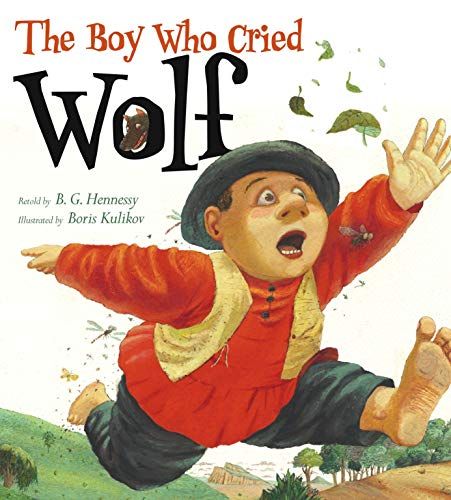
This classic tale is about a boy who grew bored while watching the community sheep grazing on the hillside. To entertain himself, he yells, “W” lf! Wolf!” and the villagers would come running to the top, thinking of a wolf prowling for the sheep.
The boy was amused when the villagers dashed up the hill only to find out there was no wolf. “D” Don’thout wolf, boy, when there isn’t wolf!” “
The boy did this again until a genuine wolf started stalking his sheep. The boy started yelling as loudly as he could, “W” lf! Wolf!.” The villagers thought he was playing them again this time and did not rush to his aid.
Moral: Lying destroys trust because no one trusts a liar, even when telling the truth.
Age: 4-7 years
You can read it here .
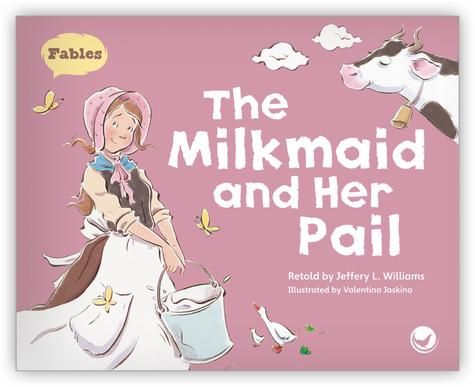
Molly, the milkmaid, had filled her pails with milk. Her job was to milk the cows and transport the milk to the market to be sold. Molly was often debating what she should buy with her money. She was thinking about everything she wanted to buy as she filled the pails with milk and went to the market.
She considered buying a cake and a basket full of fresh strawberries as she strolled down the street. She came across a chicken down the road and said, “I am going to buy my own chicken with the money I earn today. I can sell milk and eggs for a profit when that chicken lays eggs!”
Molly planned what else she’d buy and began skipping out of excitement. She completely forgot about the milk in her pails and was soon covered in milk as it spilled over the edges. Molly exclaimed, drenched, “I’ll never be able to afford a chicken again.”
With her empty pails, she returned home. “O,” my goodness!” exclaimed her mother when Molly explained what happened. “O,” Molly, my dear,” “aid her mother. Don’t count your chickens till they hatch; how many times do I have to say?”
Moral: If you plan for future achievements, your present tasks will suffer. Focus on completing your tasks successfully, and no harm shall befall you.
Age: 3-12 years.
You can buy it here .
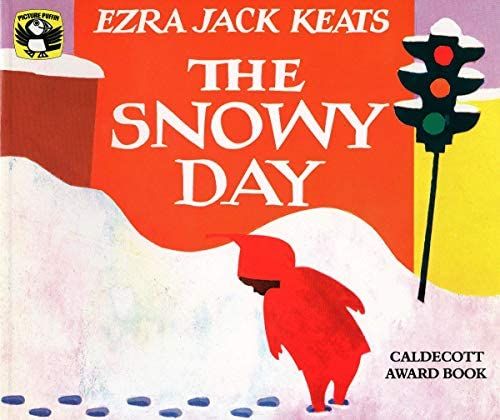
If you want to introduce your teenager to the journey of an African-American protagonist, the book “Snowy Day” is perfect. It illustrates the journey of Peter through a snowbound New York City.
If you want your kids to appreciate diversity, make sure they read this masterpiece by Jack Keats.
Moral: Diversity should consistently be recognized & valued. People of all backgrounds and walks of life should be treated equally.
Age: 3-10 years
A classic tale, Black Beauty is timeless and full of life lessons. Children will learn many critical lessons while walking down the path of a black horse, such as that of hard work, the value of friendship, and confidence.
This is an excellent book for kids who can learn about life through the eyes of a carefree horse and an elderly mare.
Moral: Growing up is challenging and sometimes lonely, so one should always strive to be gentle and good.
Age: 10-16 years
You can read it here
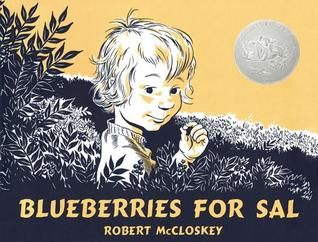
This story demonstrates to children how, despite their differences, all families are alike. It’s the story of a young boy named Sal and a baby bear named Maine, who are both on a blueberry search with their mothers.
This is an excellent read for kids who feel like rebels or parents who have ever felt like raising a rebel.
Moral: Regardless of our color, race, ethnicity, or location, we’re all the same.
Age: 3-12 years
You can get the audiobook here or read it here .
Why Stories for Kids Are Helpful
- Sharing stories daily, talking, and being creative with your child greatly benefit their development.
- Help your children in learning to recognize sounds, words, and language.
- Develop strong reading abilities.
- Learn to appreciate the significance of books, literature, and storytelling.
- Encourage your child’s curiosity and imagination.
- Help the development of your child’s brain, concentration, social skills, and communication abilities.
- Assist your child with comprehending new & terrifying experiences and the intense emotions accompanying them.
- It enables children to distinguish between real and make-believe situations.
- Helps kids in learning about the world, as well as their own and other cultures.
How Parents Can Make Their Own Stories
Kids of all ages like hearing about you and your family. When did you first lose a tooth? Which of your teachers was your favorite? Thinking about Mothers or Fathers as a child may pique kids’ interest. Perhaps you like to tell the story about the ghost who resided in your great-grandmother’s attic that was passed down to you.
Nothing is more entertaining to children than a story about a time when a parent or elder did something stupid. Children like learning about a past that has a personal connection to them. Preschoolers and toddlers like hearing stories about their favorite book characters.
Storytelling for Parents
Extend the scope of your storyline. Make your own story with your youngster. Find photos of people or places or pets from your family or magazines that could be relevant to the story. Retell the narrative in your own words.
If no pictures are available, make your own. Act out the popular narrative using puppets or costumes involving the entire family. The options are limitless!
Encourage your children to tell a story of their own! Encourage your youngsters to create their narratives after exposing them to several types of storytelling. Children must have the opportunity to explore ideas and tell stories using their imaginations. This improves communication, organization, and efficiency.
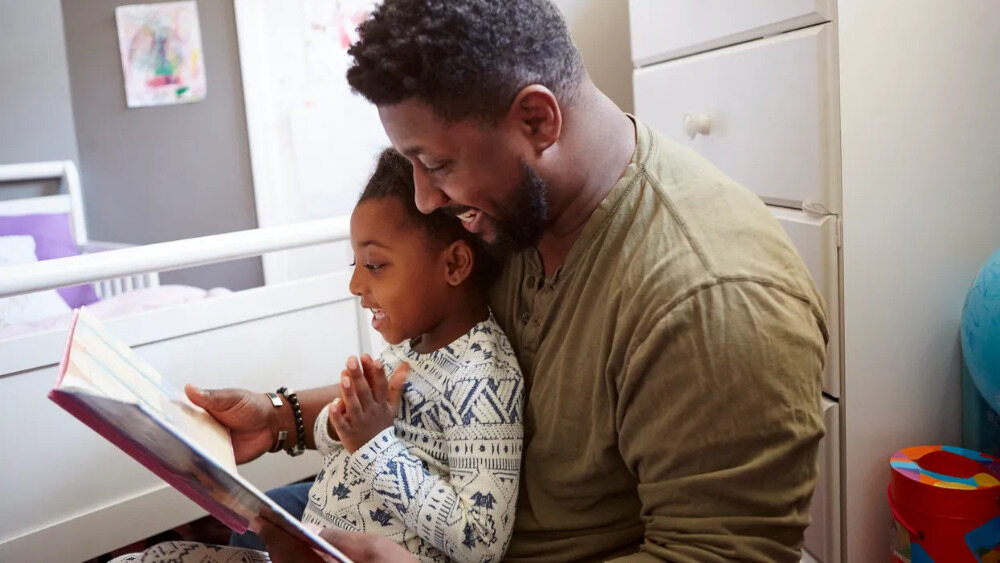
Reasons to Read Stories for Kids
It should come as no surprise that reading to children has a significantly positive impact on their development.
- It benefits their language development in a variety of ways.
- It broadens their horizons and increases their enjoyment of storytelling.
- It allows them to express emotions like empathy.
- It expands their vocabulary, allowing them to communicate effectively.
- It invites participation and discussion.
- It allows you to have some fun with your child.
Importance of Stories for Kids

Stories for kids greatly aid growth and development. They can make friends with the books they read and the characters they meet. It’slso crucial for kids to understand that books are a valuable source of information and that solid reading abilities are essential for future success. Short stories also aid kids’ self-esteem, emotional regulation, language acquisition, and learning.
Confidence Levels
Children who can read fluently are more likely to be self-assured. This helps kids at school when they can fully participate in activities. Knowing your place in the world is another aspect of developing confidence and self-esteem. Short stories for kids can aid this process by demonstrating to youngsters what people’s lives are like in their communities and different regions of the world.
Language & Learning
Short stories for kids are a great way to introduce new words and ideas into vocabulary – starting with picture books for the very young working up to more complex novels for teenagers. Stories help children learn about concepts such as shape, size, space, color, up and down, inside and outside, numbers, and the names of objects. They can also teach children about everyday tasks, such as brushing their teeth, taking care of animals, cleaning and sorting, and preparing food.
Short stories for kids are helpful to teach more complex ideas, such as the importance of sharing, the passage of time, and compassion for others. They can be beneficial when explaining traumatic events, such as family break-ups and bereavement. Fiction based on real-life can also help children with their own life experience – it shows them how diverse the world is and that some people’s lives are vastly different from theirs.
Short stories for kids before bedtime can help children relax. They allow children to forget about the stresses of the day and engage themselves in fantasy for a while. The soothing familiarity of a well-loved story, rhyming, and repetition, along with the sense of security that comes with the time spent reading together, all contribute to the child’s relaxation.
Coping with Feelings
Kids’ short stories encourage a child’s imagination by introducing new concepts such as imaginative worlds, other planets, various points in time, and fictional characters into their environment. It will instill in the kids that they can and should imagine whatever they desire.
The beauty of storytelling is that it can be immensely realistic and otherworldly. They can be reading about youngsters growing up in similar circumstances one minute and reading about alien species, such as Martians vacationing on Jupiter, the next.
Reading stories to children is always beneficial to their development, as mentioned, personally and socially. However, read these short moral stories to your children, and we are confident that they will love them and spark an interest!
Furthermore, these morally uplifting short stories will teach your children valuable lessons that they will remember for the rest of their lives.
Let’s find more online educational resources and printable worksheets your for kids that will help with their learning experience and make them smarter.
15 Best Magazines For Kids: Curious Minds Rejoice
21 Best Growth Mindset Books for Kids to Enhance Resilience
30 Funny Children’s Books to Read With Your Kids

Most Popular

15 Best Report Card Comments Samples

101 Best Riddles for Kids (With Explanation)

40 Best Good Vibes Quotes to Brighten Your Day
Recent posts.

15 Best Listening Activities for Kids to Enhance Auditory Skills
Math & ela | prek to grade 5, kids see fun., you see real learning outcomes..
Watch your kids fall in love with math & reading through our scientifically designed curriculum.
Parents, try for free Teachers, use for free

- Games for Kids
- Worksheets for Kids
- Math Worksheets
- ELA Worksheets
- Math Vocabulary
- Number Games
- Addition Games
- Subtraction Games
- Multiplication Games
- Division Games
- Addition Worksheets
- Subtraction Worksheets
- Multiplication Worksheets
- Division Worksheets
- Times Tables Worksheets
- Reading Games
- Writing Games
- Phonics Games
- Sight Words Games
- Letter Tracing Games
- Reading Worksheets
- Writing Worksheets
- Phonics Worksheets
- Sight Words Worksheets
- Letter Tracing Worksheets
- Prime Number
- Order of Operations
- Long multiplication
- Place value
- Parallelogram
- SplashLearn Success Stories
- SplashLearn Apps
- [email protected]
© Copyright - SplashLearn

Make study-time fun with 14,000+ games & activities, 450+ lesson plans, and more—free forever.
Parents, Try for Free Teachers, Use for Free

Inspirationfeed
Inspiring and educating bright minds.
20 Best Moral Short Stories For Kids (Impactful Lessons)

Last Updated on February 22, 2024
Table of Contents
https://www.youtube.com/watch?v=afLeOefHKG4
Storytime is a powerful gift you can give your children. Tales of adventures, cute animals, and friends teach kids empathy , equality, and thinking outside of the box. This is also a special bonding experience for only you and Junior, among other benefits . Since times are busy these days, short bedtime stories will still give your child a valuable lesson and quality time with you.
Pick the moral lesson you want to share and enjoy the story!
1. Greed is Destructive
The golden touch of midas.
A king named Midas did a good deed and the god Dionysus offered him one wish. Midas asked that whatever he touched would turn to gold.
Excited about his newly-earned powers, Midas started touching all kinds of things, turning them into pure gold. But when Midas became hungry, the food he touched became gold and he couldn’t eat.
Hungry, Midas groaned, “I’ll starve!” Seeing his dismay, Midas’ beloved daughter threw her arms around him to comfort him, and she turned to gold. “The golden touch is no blessing,” Midas cried.
2. Pride is Useless

The Rose and the Cactus
Once there was a rose in a desert. She was proud of her beautiful looks and her only complaint was growing next to an ugly cactus. Every day, the rose mocked the cactus about his looks.
One scorching summer, the desert became dry, and there was no water left for the plants. The rose quickly began to wilt. Her beautiful petals dried up, losing their lush color.
She saw a sparrow dip his beak into the cactus to drink some water. The rose asked the cactus if she could have some water. The kind cactus agreed, helping them both through the tough summer, as friends.
3. Acting Before You Think
The golden eggs.
A farmer had a goose that laid one golden egg every day. This made the farmer happy for a long time. But, one day, the farmer thought to himself, “Why should I take just one egg a day? Why can’t I take them all at once and make a lot of money?”
The next day, the farmer killed the goose and cut its stomach open, hoping to find lots of golden eggs. The only thing he found was guts and blood. The farmer realized his mistake and cried. As the days went on, the farmer became poorer and poorer.
4. Dealing with Adversity
The cooking lesson.
Asha was getting frustrated with life, so she asked her father what to do. He told her to bring an egg, two tea leaves, and a potato. He then boiled them. After 10 minutes, he asked Asha to peel the egg, peel the potato, and strain the leaves.
Her father explained, “Each item was placed into the same circumstance, boiling water. See how each responded differently? The egg was soft but is now hard. The potato was hard but is now soft. And the tea leaves, they changed the water itself.”
The father then asked, “When adversity calls, we respond in the same manner as they have. Now, are you an egg, a potato, or tea leaves?”
5. Good Deeds

The Boy and the Glass of Milk
A poor boy sold newspapers to pay for school. One day, he started to feel weak from hunger. The boy asked for food but was denied every time until he reached the door of a girl. He asked for a glass of water, but seeing his poor state, the girl came back with a glass of milk. The boy asked how much he owed but she refused payment.
Years later, the girl, now grown, fell sick. She went from doctor to doctor, but no one was able to cure her. Finally, she went to the best doctor in town. The doctor spent months treating her until she was finally cured. Despite her happiness, she was afraid she couldn’t afford to pay the bill. But, when she got the bill, it read, ‘Paid in full, with a glass of milk.’
6. Work and Play
The grasshopper.
One autumn day, ants were busy drying out the grain they had stored up during the summer when a starving grasshopper came up. With his fiddle under his arm, the grasshopper begged for a bite to eat.
“What!” cried the ants, “Haven’t you stored any food for the winter? What did you do all summer?”
“I was too busy making music that the summer flew by,” said the grasshopper.
The ants shrugged their shoulders and said, “Making music? Very well, now dance!” The ants then turned their backs on the grasshopper and returned to work.
7. Good Friends
One day, two friends were walking through the forest. They knew the forest was a dangerous place. So, they promised to remain close to each other in case of any danger. But when a big bear appeared, one boy quickly climbed a tree, leaving his friend behind.
The other friend did not know how to climb, and instead, pretended to be dead. The bear smelled his ear and wandered off.
The friend who hid in the tree came down. He asked, “What secret did the bear whisper to you?” The friend replied, “The bear told me never to believe a false friend.”
8. Perseverance is Better than Overconfidence

The Tortoise and the Hare
There was once a hare who was friends with a tortoise. One day, he challenged the tortoise to a race.
Seeing how slow the tortoise was going, the hare thought he’ll win this easily. So he took a nap while the tortoise kept going. When the hare woke up, he saw that the tortoise was already at the finish line. Much to his chagrin, the tortoise won the race while he was busy sleeping.
9. Every Problem has a Solution
The thirsty bird.
After flying a long distance, a thirsty crow was searched for water in a forest. He saw a pot half-filled with water. He tried to drink from it but his beak wasn’t long enough to reach the water inside.
Then he saw pebbles on the ground and one by one, he put them in the pot until the water rose to the brim. The crow then drank the water and quenched his thirst.
10. No Excuses for Hard Work
The fox and the grapes.
A hungry fox stumbled upon a vineyard. After seeing juicy grapes hanging in a bunch, the fox jumped to reach them. But no matter how high he jumped, he failed. So he told himself that it was probably sour and left. That night, he had to sleep on an empty stomach.
11. Don’t Lie

The Boy Who Cried Wolf
There was once a shepherd boy who got bored while watching sheep. He decided to play a trick and cried “wolf! wolf!”. The people who heard rushed over to help him. But they were disappointed when they saw no wolf and the boy laughing at them.
The next day, he did it again and people rushed to his aid only to be laughed at. On the third day, the boy saw a wolf devouring one of his sheep and cried for help. But the people who heard him thought it was another of the boy’s pranks. No one came to help him.
12. A Happy Home is Better than a Mansion
The bird and the tortoise.
One day, a tortoise mocked a bird. “What a shabby home you have! It is made of broken twigs and you had to build it yourself. You must be so jealous of my house, which is my shell.”
“On the contrary”, the bird replied. “My home has space for my family and friends; your shell cannot accommodate anyone other than you. Maybe you have a better house. But I have a better home.”
13. Unity is Strength

The Tiger and the Cows
Four cows lived in a forest near a meadow. They were good friends. Because they grazed together no tiger could kill them for food.
But one day, the friends fought and each cow went to graze in a different direction. A tiger saw this and killed the cows, one by one.
14. Boasting is Foolish
The lying traveler.
A man came back from a tour and boasted about his adventurous journeys. He talked at length about his amazing feats that got him fame and praise from people everywhere. He went on to say that he went to the Rhodes where he had leapt such distances that no man could ever match his feat.
A smart bystander said, “Imagine this place to be Rhodes and leap for us”. The lying traveller didn’t know what to do and went away quietly.
15. Judging Others for Mistakes We Make
The wolf and the shepherd.
One day a wolf was chased away for trying to steal a sheep for food. Later that week, the wolf came back to the farm hoping to find some food. He peeped inside the house and found the farmer feasting on lamb roast.
“Aha!”, he thought. “If I were to do the same thing that the farmer and his family are doing now, I would be killed for killing a weak, innocent lamb.”
16. Don’t Put High Expectations on Others

The Mother Crab
One day, a young crab and his mother were on the beach. The young crab could only walk sideways. His mother scolded him and told him to walk forward. The young crab responded, “I would like to walk forward, but I don’t know how”.
His mom got up to show him how but realized she could only go sideways too. Grasping that she was being unfair, she apologized.
17. Listen to Your Elders
The puppy and the well.
A mother dog once told her pups not to go near a well. One puppy disobeyed and peeked inside the well. He saw his own reflection and thought it was another dog.
He decided to fight his reflection and jumped into the well. Finding no dog, he barked and swam until he was rescued. The pup had learned his lesson.
18. Don’t Judge Those Who are Smaller
The mouse and the lion.
A lion was once sleeping in the jungle when a mouse started running up and down his body for fun. This disturbed the lion’s sleep, and he became angry. He was about to eat the mouse when the mouse said, “If you let me go, I will be of great help to you someday.” The lion laughed but let him go.
One day, hunters captured the lion. They tied him up against a tree. The lion couldn’t free himself. Soon, the mouse walked past and noticed the lion’s troubles. Quickly, he ran and gnawed on the ropes and set the lion free.
19. Money Doesn’t Always Bring Happiness

Nasir’s Crystal Ball
Nasir, a small boy, found a crystal ball in his garden. A tree told him that it would grant him a wish. He couldn’t decide on what he wanted, so he kept the ball in a bag.
Then his best friend stole the crystal ball and showed everyone in the village. They all asked for palaces and riches, but could not make more than one wish. In the end, everyone was angry because no one could have everything they wanted.
They became very unhappy and decided to ask Nasir for help. Nasir wished that everything would go back to how it was before the villagers had tried to satisfy their greed. The palaces and gold vanished and the villagers became happy and content.
20. Honesty is the Best Policy
The golden axe.
Once upon a time, a hard-working woodcutter lost his axe in a river. He sat at the bank of the river and wept. The god of the river arose and asked him what happened. The woodcutter told him the story. The god offered to help by looking for his axe.
He disappeared into the river and retrieved a golden axe, but the woodcutter said it was not his. He disappeared again and came back with a silver axe, but the woodcutter said that was not his either. The god disappeared into the water again and came back with an iron axe – the woodcutter smiled and said it was his.
The god was impressed with the woodcutter’s honesty and gifted him both the golden and silver axes.
Posted by: Igor Ovsyannnykov
Igor is an SEO specialist, designer, photographer, writer and music producer. He believes that knowledge can change the world and be used to inspire and empower young people to build the life of their dreams. When he is not writing in his favorite coffee shop, Igor spends most of his time reading books, taking photos, producing house music, and learning about cinematography. He is a sucker for good coffee, Indian food, and video games.

30+ Best short stories in English with moral (Valuable lessons for kids)

Looking for short stories in English with moral ? Check out this list of must-read short stories for children with unique moral lessons.
These very short stories with morals in English language teach children about morality and ethics. They also help them develop their critical thinking skills .
These are short learning stories that you can read at bedtime. You will not be disappointed by these classic short moral stories in English and they work like a charm for kids of any age .
✅>>>>Also, if you are tired of bedtime story struggles and want to instill moral values effortlessly, then get this bestselling stories . I personally have found it useful. <<<<


The Gita: For Children + The Vedas and Upanishads for Children (Set...
- The Gita: For Children + The Vedas and Upanishads for Children (Set of 2 books)
Also Read – 10 Lines short stories with Morals
In this page very short stories in English with morals are available both as pictures and in pdf. Just download and read.
Also Read – 50+ short folktale stories with moral lesson
- How Speech Therapy Games Can Help Your Child Thrive
- 10 Tenali Raman Stories
- Best Bible Stories for Kids
Short story for teenager with moral lesson
A collection of very short moral stories in english for students – see what is inside video.
Click here to Download Moral stories for kids PDF (Absolutely FREE for a limited time)
Click on below pic to download and read these short stories with morals for kids and learn from them

I can never imagine my childhood without stories. It was fascinating. But kids today are lost in a digital world. While we grew up listening to stories or reading good stories books, our kids are hooked on their screens watching cartoons or playing games on their mobiles.
✅ Here is our latest article on>>> How To Inculcate Moral Values in Children. <<<
As if it weren’t enough, the pandemic hit hard their childhood and made them homebound. Even schools are teaching online. Reading books is fast becoming an alien concept to kids.
But all hope is not lost. Kids have an inherent liking for fantasy and wonderland. They respond well to stories told to them. We as parents should read them stories from a very tender age- a habit they will carry forward into their lives ahead.
Also Read – 20+ Easy & Enchanting Sanskrit Slokas For Kids: Unlock the Wisdom of Ancient India
Classic Moral stories in English
Classic moral stories in English are a great way to teach children about important life lessons. There are many stories moral in English that have been passed down through the generations, and they continue to be popular today. stories morals in English can teach children about right and wrong, responsibility, honesty, and other important life lessons. In addition, short moral stories in English are often entertaining and can help children to develop a love for reading.
Check – 13+ Inspiring Indian Mythological Stories for Kids with Morals
There are many must read moral stories in English for kids to choose from, so finding the right one for your child can be a challenge. However, there are some tips that can help you choose the best short stories with moral lessons for kids in English for your child.
First, consider your child’s age and interests. moral stories for kids that are too difficult or too simple will likely not hold your child’s attention. Second, look for stories that teach important life lessons. Third, choose stories that are entertaining and will help your child to develop a love for reading.
Also Read – How To Teach Moral Values To Kids
5 lines story with moral for nursery class
1. Once upon a time, there was a little girl who was very naughty.
2. She always made trouble for others and never listened to her elders.
3. One day, she ran away from home and got lost in the forest.
4. A kind old lady found her and helped her find her way back home.
5. The little girl learned her lesson and was never naughty again.
Moral of the story: It is always better to be good and obey your elders. Otherwise, you may end up in big trouble.
4 line stories in English ( moral value story in English )
1. Once upon a time, there was a beautiful princess who lived in a castle with her loving parents.
2.One day, a wicked witch cast a spell on the princess, turning her into a frog.
3.The only way to break the spell was for a prince to kiss her.
4.Fortunately, a brave prince came along and broke the spell, and they lived happily ever after.
Another story about an ugly duckling
1.Once upon a time, there was an ugly duckling who was rejected by everyone.
2.But one day, he met a kindhearted woman who accepted him for who he was.
3.And she helped him to see that he was really a beautiful swan.
4.They lived happily ever after.
3 line stories in English
Here is another very short story about a poor boy
1.Once upon a time, there was a poor boy who had to work hard every day just to survive.
2.But one day, he met a wealthy man who took him under his wing and taught him the ways of business.
3.The boy became a successful businessman himself, and he never forgot the man who had helped him.
1.Once upon a time, there was a girl who dreamed of becoming a singer.
2.But her parents told her that it was impossible, and she should just be content with her life.
3.However, the girl never gave up on her dream, and she eventually became a famous singer.

Moral Stories from Panchatantra (Pack of 10 Books) | Bedtime story books...
- Moral Stories from Panchatantra, Bedtime short stories
- Story books for kids,library collection
- Written in easy language,vibrant illustrations
- Perfect for 3 years up till 8 years
- Made in India
- Ideal-size for little Kids
- English story book

10 lines short stories with moral
1. Aesop’s fables are a great example of 10 lines short stories with moral for kids. They teach valuable lessons about life and how to live it in a simple, yet effective way.
2. Another 10 lines short story with moral for kids is “The Ant and the Grasshopper”. This story teaches kids the importance of hard work and how it pays off in the end.
3. “The Boy Who Cried Wolf” is yet another 10 lines short story with moral for kids that teaches an important lesson.

The Illustrated Stories of Akbar and Birbal: Classic Tales From India

The Ant and the Grasshopper story in English in 10 lines ( best English story with moral )
The Ant worked hard all summer long, gathering food for the winter. The Grasshopper laughed and played, doing nothing to prepare for the cold months ahead.
When winter came, the Grasshopper had nothing to eat while the Ant was well-prepared with a cozy home and plenty of food. The Grasshopper begged the Ant for help, but the Ant refused, saying, “You should have worked hard like me when there was food to be had.”
The Grasshopper eventually starved to death, learning too late the importance of hard work and preparation.
Short puppet story with moral lesson
The three little pigs went out into the world to seek their fortunes. The first little pig built himself a straw house, and the second little pig built himself a stick house. But the third little pig built himself a brick house, and it was this house that withstood the big bad wolf’s huffing and puffing.
The moral of this story is that it pays to be prepared. The third little pig had taken the time to build a strong house, and as a result, he was able to withstand the wolf’s attacks. If the other pigs had been as prepared as the third little pig, they would have been able to avoid becoming the wolf’s dinner.
What is puppet story?
A puppet story is a short story that uses puppets as the main characters. Puppet stories are often used to teach children moral lessons or to entertain them. Many popular children’s stories, such as The Three Little Pigs and Pinocchio, began as puppet stories.
Also Read – 10+ Best Moral Stories for Puppet Show
The Boy Who Cried Wolf story in English 10 lines ( 10 lines moral stories )
1. There was a boy who lived in a village near a forest.
2. The boy used to tend to the sheep in the village.
3. One day, the boy saw a wolf in the forest and cried out, “Wolf! Wolf!”
4. The villagers came running, but when they got there, they saw that there was no wolf.
5. The boy laughed and the villagers went back to their homes.
6. The next day, the boy saw the wolf again and cried out, “Wolf! Wolf!”
7. The villagers came running, but when they got there, they saw that there was no wolf.
8. The boy laughed and the villagers went back to their homes.
9. The third day, the boy saw the wolf again and cried out, “Wolf! Wolf!”
10. This time, when the villagers came, they saw that there was a wolf. The boy had lied so many times that they didn’t believe him and the wolf ate the boy.
The moral of the story is that you should never lie, because if you do, people won’t believe you even when you’re telling the truth.
Collection of moral stories in English small
If want to get some good books on moral stories for kids online, check out below:
- 108 Moral Stories (Illustrated) for Children
- 199 Moral Stories – Self Teaching Moral Stories for 3 to 6 Year Old Kids
- Panchatantra Moral Stories (Illustrated) (Set of 10 Books) – Story Books for Kids
- Moral Stories from Aesop Fables (Hindi) Set of 20 books for kids
Benefits of Short Moral stories for kids (in English)
- Narrating stories build strong interpersonal bonds and keep them away from the screen too.
- They boost the child’s fantasy and creativity.
- Stories increase their concentration power.
- The child’s vocabulary is enhanced.
- Kids get exposed to a wider world- a real and practical one.
- Kids learn to be patient while listening to stories.
- Stories are a great way to teach them valuable lessons for their lives ahead.
Check out these 30+ (5 to 10 lines) very short stories in English with moral values
As moms navigating the ever-evolving landscape of parenting, we’re always on the lookout for the perfect stories that strike the balance between entertainment and valuable life lessons. The challenge of finding the best short stories in English with morals can be overwhelming, especially when we desire narratives that leave a lasting impact on our children’s character. Well, fellow moms, I’m here to ease that journey for you.
Join me in discovering a curated collection of the Best Short Stories in English with Moral – each tale carefully chosen to not just engage but to impart invaluable lessons that our little ones will carry into the future.
Let’s turn storytelling into a transformative experience for both us and our children. Ready to dive into a world of captivating narratives and meaningful insights?
Let the storytelling adventure commence!
- The Bird-catcher And The Pigeons – Unity is strength pigeon story with pictures (a small story in English with moral)
The Eagle And The Woodcutter
The foolish lion and the clever rabbit short story pdf, the loyal mongoose, the mice that ate iron, the lion and the mouse, fox and crane story in english pdf, the fox and the grapes short story with moral, the axe and the woodcutter, the greedy lion, the brahmin and the cheats, the greedy hunter and the rabbit, the ant and the elephant, the monkey and the crocodile, short story monkey and cap seller story with pictures pdf, the hare and the tortoise, the daydreamer milkman, the cats and the monkey, greedy dog story in english pdf, the golden geese, a farmer and his four sons, bellingâ the cat, the boy who cried wolf, the fox and the crow, the pigeon and the ant, three fishes, the talkative tortoise, akbar and birbal, midas and his golden touch, the farmer and the well story in english pdf, a short moral story in english with moral for kids, time is valuable story, liked this list of short english moral stories for kids, the bird-catcher and the pigeons – u nity is strength pigeon story with pictures ( a small story in english with moral ).
Once a flock of pigeons was caught in a bird catcher’s net. They tried to free themselves but couldn’t. So, they all panicked. There was an old pigeon. He calmed them down and said,†We should not panic if we want to escape from here.
The birds calmed down and listened to him. The old pigeon asked them to follow his instructions and said,†We will fly together at the count of three and take this net with us. Just remember to fly together.â€
The bird-catcher was coming to take the birds away when the unexpected happened. The birds flapped their wings together and flew away with the net! The bird-catcher could not do anything. He was shocked to see such wisdom and unity in birds.
Moral : You can achieve anything with unity. We should be calm in difficult situations to overcome them.

Set of 20 Classic Tales & Favourite Story Books | English Short...

Check out this awesome bookset Moral Story Books for Kids (Pack of 10 Books) – This set has books with all time favourite stories for kids.
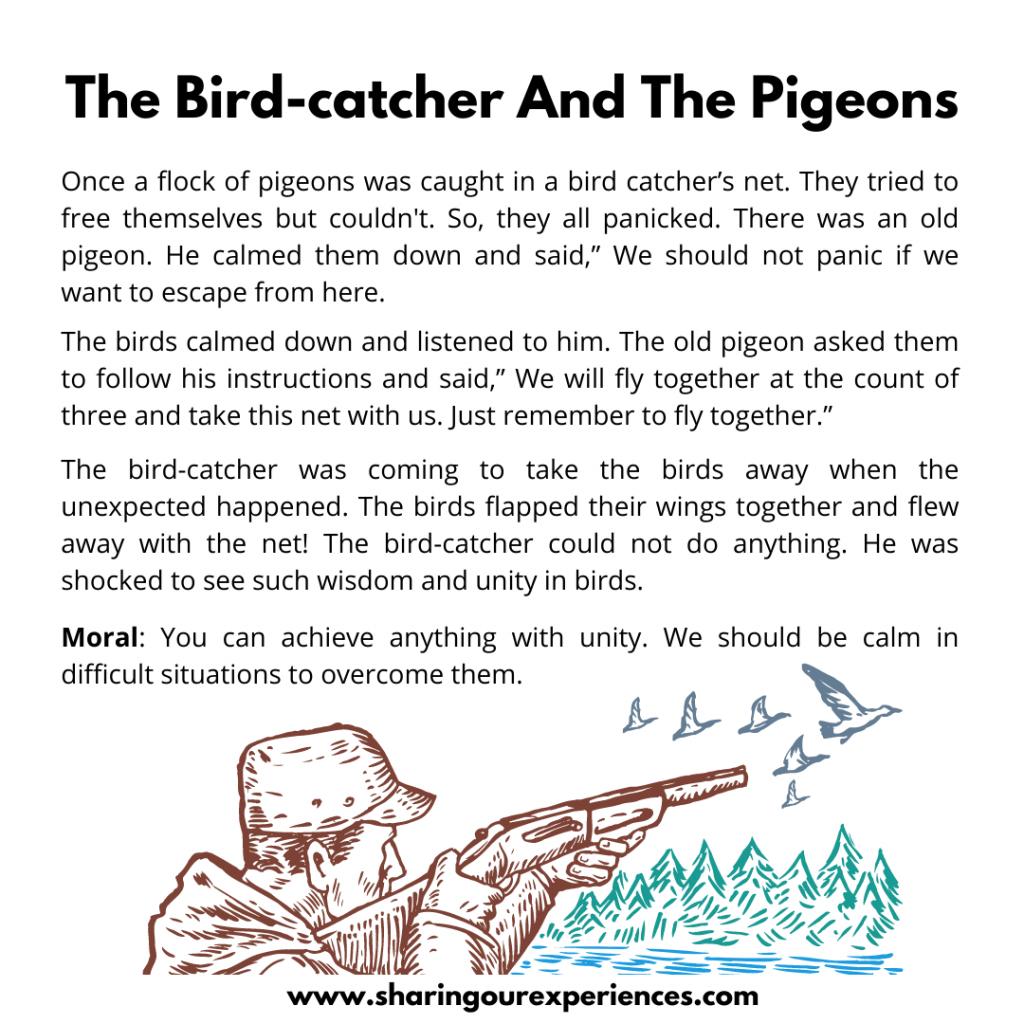
There lived a kind woodcutter in a village. He once freed an eagle from a trap. One day he went to the hills to cut trees for wood. The hill was steep, so the woodcutter could not come down and needed help.
Upset, he sat down on the rock and waited for some help. Suddenly, an eagle flew down close to him and took away his hat. The woodcutter was angry and he started chasing the bird. After some time, he realized he has found the way down the hill.
It then occurred to him that the bird was the same eagle he had once rescued. He now understood why the eagle flew away with his hat. He thanked the eagle for its brilliant idea and said,†You took away my hat so that I can follow you and reach here. You are my true friend. Thank you!”
Moral: Kindness is always rewarded. We should always help others selflessly.
Also Read – Raising Kind Kids: Expert Tips for Developing Empathy in Children
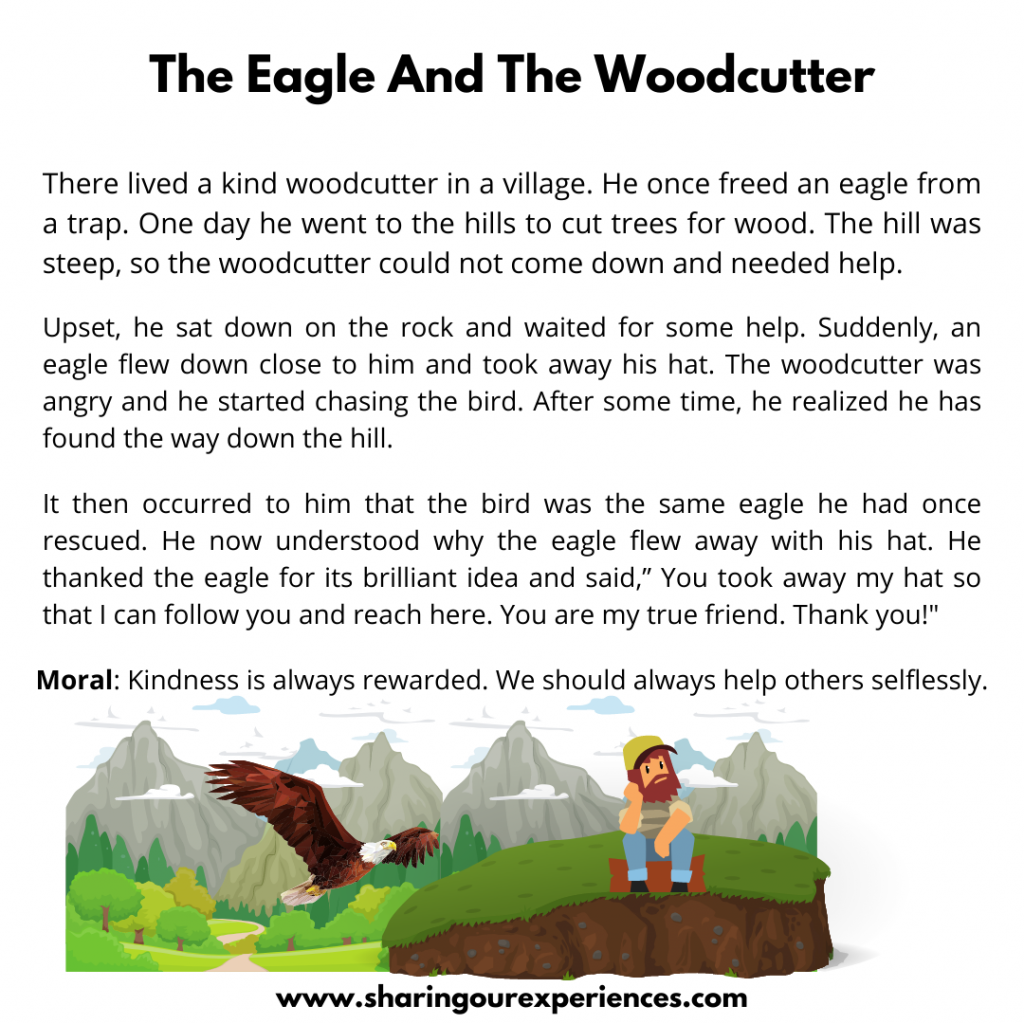
Also, Read – 30 Fun and Easy Random Acts of Kindness Ideas for Kids – Spread Love and Positivity!
Once, there lived a lion in a jungle. He was very cruel and greedy. He used to hunt and kill other animals even when wasn’t hungry. All the animals were afraid of him.
One day, they gathered together and went to the lion. They said,†Oh king of the jungle, if you hunt at this rate, we all will be killed soon, and you will soon run out of food. Every day, we will send you one animal for food. This way you will have easy food and we will get a chance to survive.
The lion agreed and from that day on he would get an animal as his meal at his home. This continued for several days.
One day, it was the turn of a young hare. He was clever and did not want to be eaten away by the cruel lion. He thought of a plan to get rid of the lion altogether.
The next day he got up late and walked very slowly toward the lion’s den. He even slept on the way. Finally, he reached the lion after sunset. Seeing the hare, the lion roared fiercely as he was very hungry.
The small rabbit was a little food for him. But the rabbit did not get scared. Instead, he told the lion -†Oh mighty king! I was stopped by another lion. He said that he was the new king of the jungle. He even took the other two hares that the animals had sent with me. He wanted to eat me too, but somehow I escaped and came to you.â€
Hearing this the hungry lion got angrier and told the hare to take him to this new lion so that he could kill him. The hare readily agreed and led him to a well and said, “ See, he is here, growling and staring at me.â€
The lion looked into the well. He saw his own reflection growling back. Furious, he jumped into the well and died. The clever hare rejoiced and ran away to share this news with the other animals.
Moral: We should keep calm in times of crisis. We should not believe whatever we hear.
Also Read – How To Help Your Child Cope With Anger And Calm Down
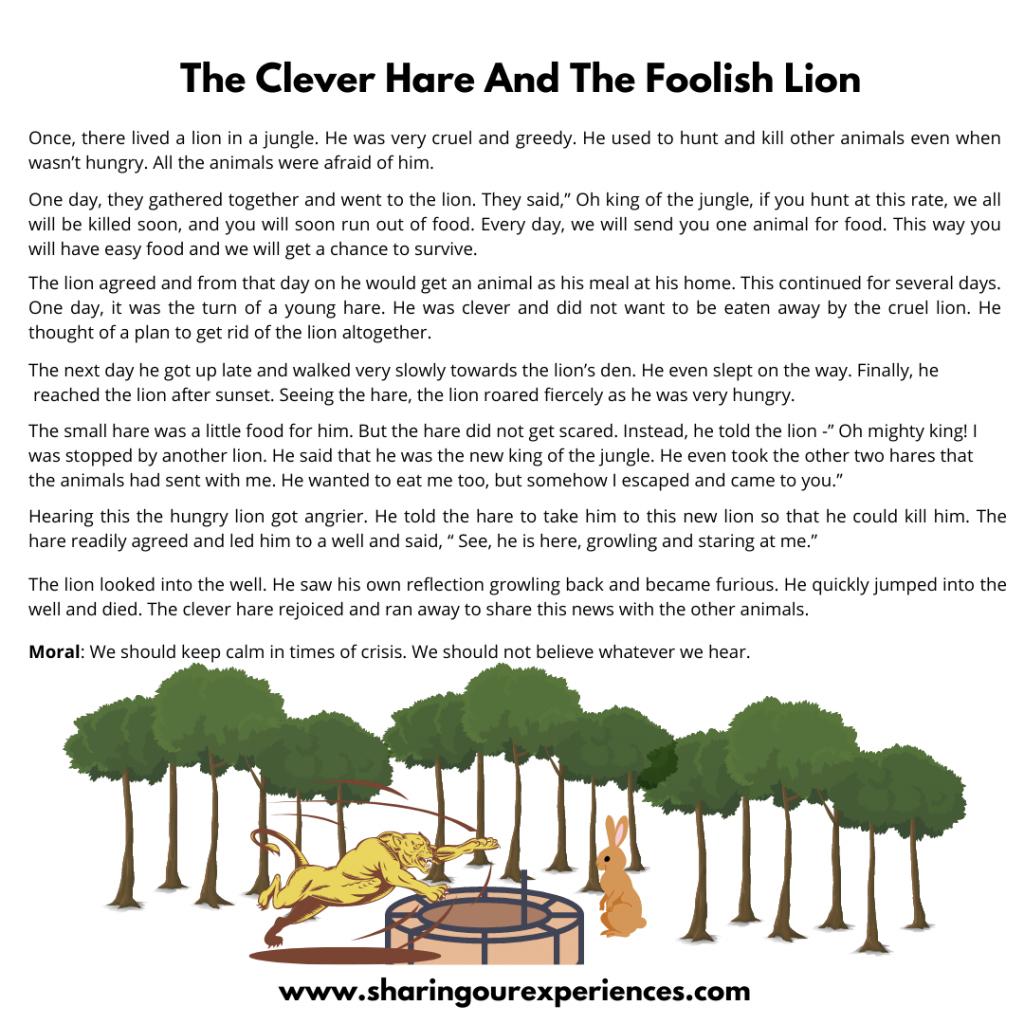
✅ We don’t want you to miss our Trending Article >>> Krishna Shloka for Children <<< Perfect and Easy shlokas with meaning.
If you want to teach shlokas to your child, you will absolutely love this recommendation from us- My First Shloka Book – This book has activities too and is favouite among many kids I know. Makes for a great gift.
Once there lived a farmer with his wife. They had an infant baby. One day, the farmer found an injured mongoose while returning home from the fields.
He told his wife that he would nurse the mongoose to health and keep it as a pet. The wife didn’t like the idea but agreed reluctantly. The mongoose recovered soon and played around in the house. The wife kept it away from her infant son.
One day, the wife left the sleeping baby with her husband and went out to fetch some groceries. She told him to keep the mongoose away from the child. Meanwhile, the farmer got an urgent call from the field and he left the son with the mongoose. He trusted the mongoose and was sure that his child was safe with him.
After some time, the farmer’s wife returned with a big grocery basket. She saw the mongoose standing outside the gate with blood on his mouth and paw. Without a second thought, she yelled and smashed the poor animal with the basket full of groceries. She ran inside crying and wailing but was shocked to see her son sleeping peacefully near a dead snake.
Now, the reality dawned upon her. She understood that a snake must have come to bite her son, but the mongoose killed the snake to save the baby. The bloodstain was that of the snake’s. She rushed out to check on the mongoose. The poor loyal mongoose was dead.
Moral: We should not jump to conclusions. We should not take decisions in a hurry.
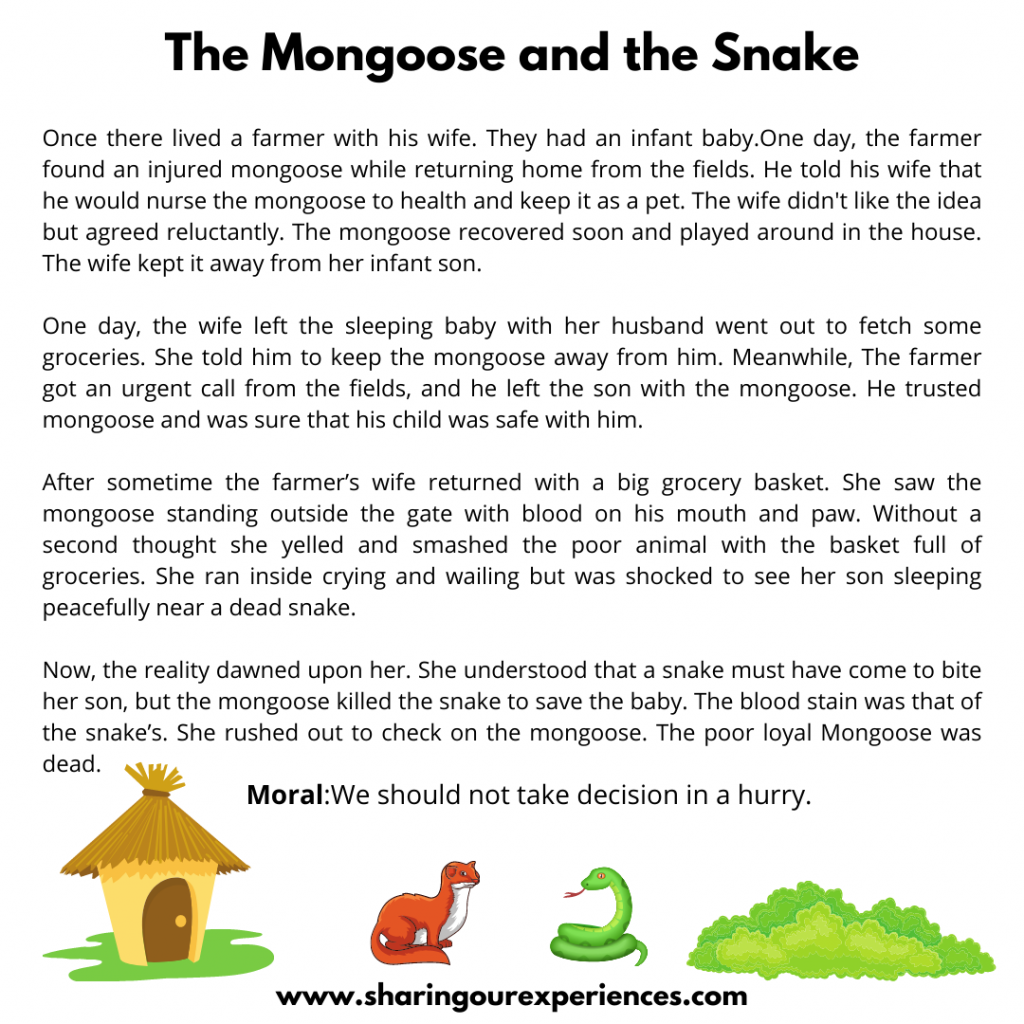
Mohan and Sohan were good friends and lived in a city. One day, Mohan decided to visit his family in the village and left a heavy iron chest with Sohan. He said,†Sohan, I would return in a couple of months. Till then take care of my belongings.â€
The next day, Mohan went away to his village. Three months later, he returned to the city and went straight to meet Sohan. Sohan welcomed him and served him food. While leaving he told Sohan that he wants to take his iron chest with him. Sohan was greedy, he didn’t want to return the chest to Mohan. The iron box would fetch him good money if he were to sell it in the market.
He said to Mohan that his house has many mice, and they ate away his iron chest and said,†I am sorry my friend.†Mohan immediately understood the dishonest intentions of Sohan. He asked his friend not to be sorry as it was not his fault. And went away. Before leaving he asked Soham to send his son to his house so that he could give him the gifts he had bought. Soham sent his son with Mohan.
Soham thought Mohan had fallen for his lie and was very happy. Mohan locked the child in a room. When the child didn’t return by the evening, the father went to Mohan to enquire about his son.
Mohan casually said that an eagle flew away with his son. He tried to save him but could not. Soham was furious as he knew that it was a lie. Soon both the friends began to quarrel and took the matter to the court.Â
The judge asked Mohan to return the child as he was lying. To this, he replied,†If mice can eat iron, then an eagle can carry away a child too.†The judge now asked for the entire matter to be revealed. Mohan told the entire story. Sohan understood he had been caught. He accepted his mistakes and returned the iron chest to Mohan and got back his son.
Moral : Greed has its downfall.

A lion was once sleeping in his den when a mouse started running up and down his body just for fun. This woke up the lion , and he was quite angry.
He was about to eat the mouse when the mouse pleaded with the lion to set him free. “I promise you, I will be of great help to you someday if you save me.†The lion laughed at the mouse’s confidence and let him go.
One day, a few hunters came into the forest and trapped the lion in a net. They tied him up against a tree. The lion started to roar and struggled to free himself.
Soon, the mouse walked past and noticed the lion in trouble. He ran and called his friends for help. Together they gnawed on the ropes to set the lion free. They ran off into the jungle and remain friends thereafter.
Moral : A small act of kindness can go a long way.
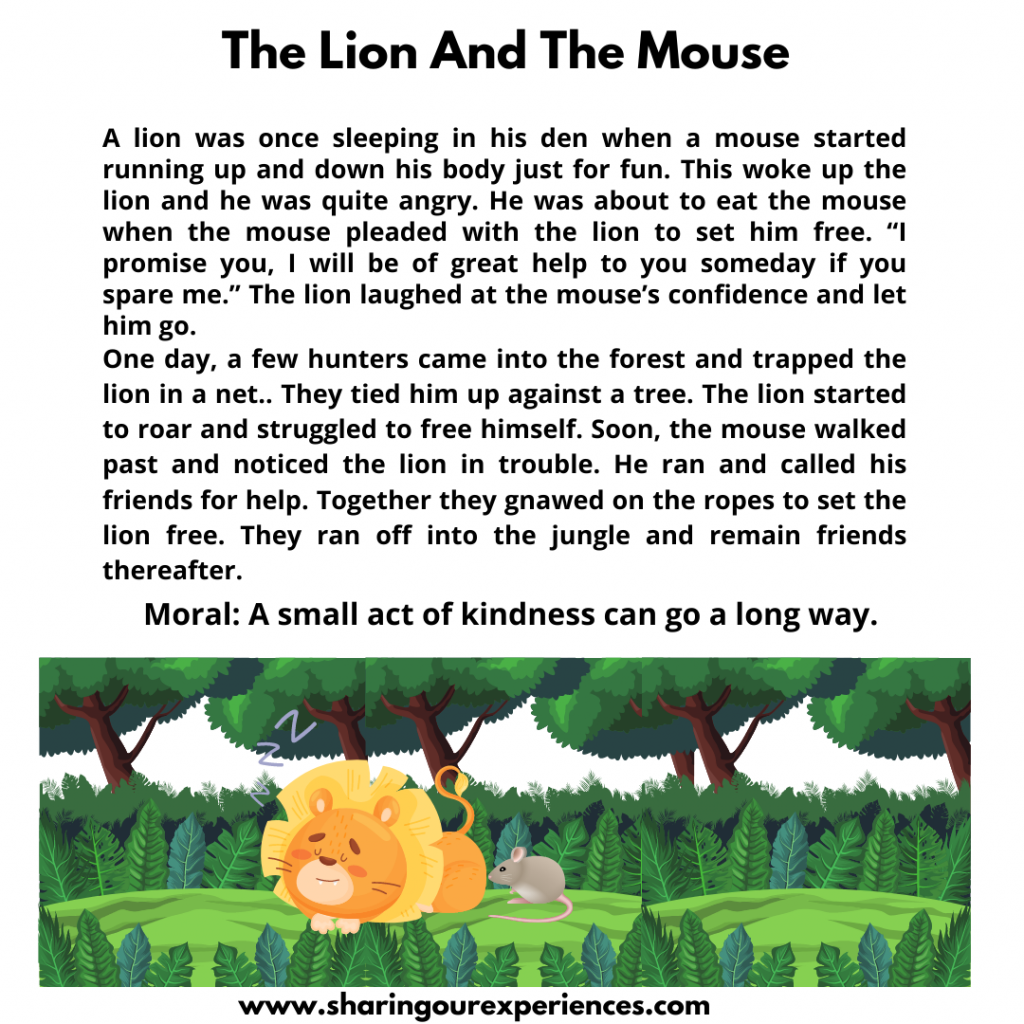
Also Read – How to teach kindness to kids
One day, a wicked fox invited a crane for dinner. The crane was very happy with the invitation. She reached the fox’s home on time and knocked at the door with her long beak. She has been excited the whole day and was extremely hungry.
The fox soon served some soup in shallow bowls for both of them. The crane was surprised and angry too, as she couldn’t have soup at all. Her long beak couldn’t help her drink from the bowl.
But, the fox licked up his soup quickly. Feeling cheated and humiliated, she decided to teach the fox a lesson soon.Â
She didn’t show her anger and behaved politely with the fox. Before leaving she invited him for dinner the next day. She made rice porridge for the dinner and served it in two tall narrow vases.
She happily drank her porridge from the vase. The fox tried hard but couldn’t, as the neck of the vessel was narrow. The fox understood everything. He had learned his lesson and had to go home hungry.
Moral : A selfish act backfires sooner or later.

If your child likes stories and storybooks, then he/she will love this set of books- Best story books by Sudha Murty <<< The most amazing stories you’ll ever read to your kid!

Once a fox wandered across the jungle in order to get some food. It was very hot, and the fox was very hungry. He looked everywhere, but couldn’t find anything that he could eat.
His stomach was hurting by now, but he continued his search. Soon, he spotted a vineyard that was laden with big juicy grapes. He looked around and saw no one. He thought to himself that the grapes must be really sweet to eat. So he decided to steal some grapes.
He jumped high, but he couldn’t reach the grapes. He tried again and again, but he could not catch a bunch of grapes. He went back and forth to build up speed but still, the grapes were beyond his reach.
The grapes were too high, but he refused to give up. He tried a few more times, and jumped high in the air but couldn’t reach the grapes.
 It was getting dark and the fox was getting angry. He finally gave up as his legs started to hurt. Walking away, he said, “I’m sure the grapes are sour. I am wasting my time and energy on them.
Moral : We pretend to hate something when we can’t have them.

Once there lived a woodcutter in a village. He was poor but hard-working. He used to go to the forest to cut down trees for wood. He sold them in the market and earned money for some food.
One day as he was cutting a tree, his axe accidentally fell into the river. The river was deep and was flowing fast. It carried away his axe swiftly. The woodcutter sat at the bank of the river and began to cry.
Suddenly, the Goddess of the river arose and asked him what happened. The woodcutter told her the story. The Goddess of the river offered to help him by looking for his axe.
She disappeared into the river and soon came up with a golden axe. The Goddess asked the woodcutter if it was his axe, but the woodcutter said it was not his.
She disappeared again and this time came back with a silver ax. Again, She asked him if it belongs to him, but the woodcutter said that that was not his either.
The Goddess disappeared into the water again and this time came back with an iron axe. The woodcutter jumped with joy and said it was his. The Goddess was impressed with the woodcutter’s honesty and gifted him both the golden and the silver axes.
Moral : Honesty is the best policy.
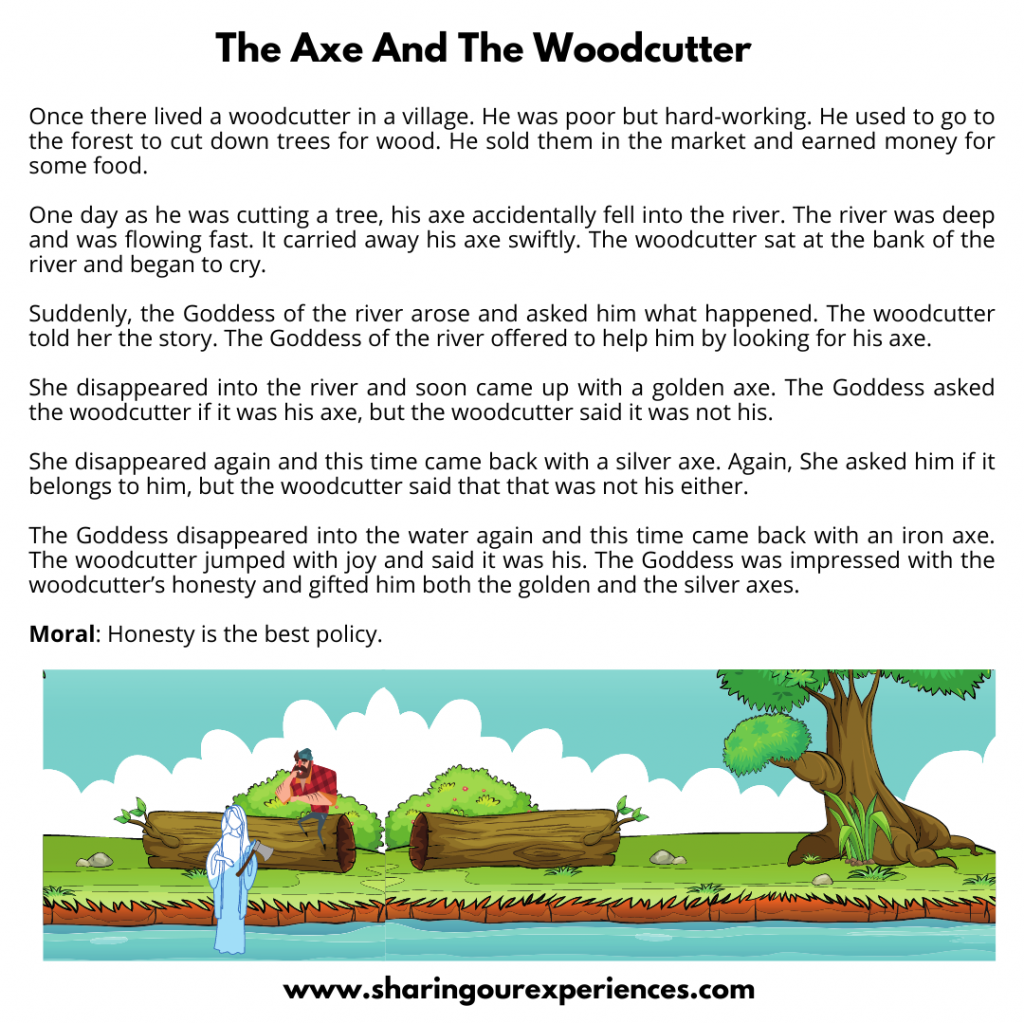
On a hot summer day, a lion in the forest started feeling hungry. He went hunting for food. Soon he spotted a rabbit roaming around alone. He thought to himself, “Such a small rabbit as this can’t satisfy my hunger.â€Â
Instead of catching the rabbit, the lion let it go. Just then, a beautiful deer passed by, and the lion decided to hunt it down.
So, he ran behind the deer. Since he was weak because of the hunger, he could not keep up with the deer’s speed. Soon, he was tired and could no longer chase the deer.
He let go of the deer and went backing looking for the rabbit to fill his stomach for some time. But, the rabbit was gone. The lion was sad and remained hungry for a long time.
Moral :Greed is never a good thing. We should be happy with whatever we get.
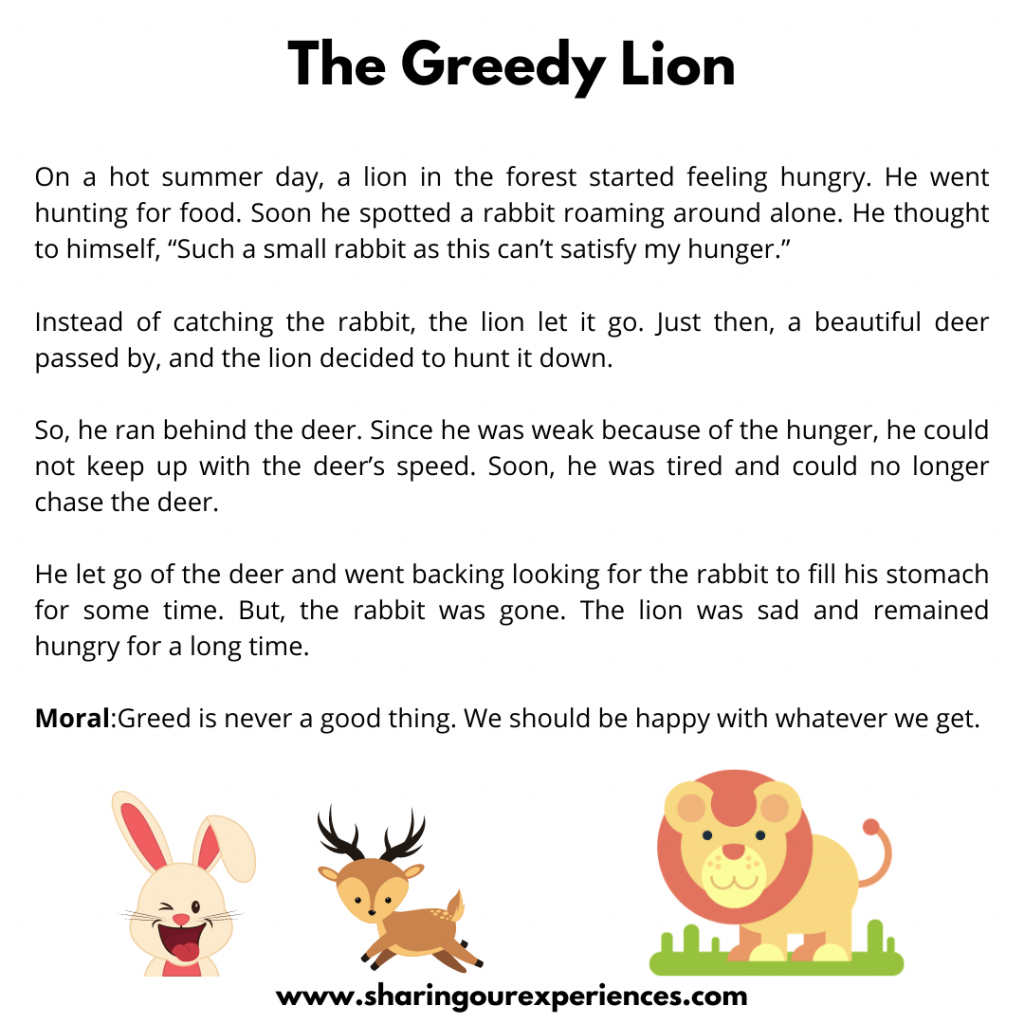
There lived a simple brahmin in a village. One day, he went to another village to attend a religious ceremony. As a gift, he received a goat. He put the animal on his shoulder and started walking towards home.
On the way, a group of three cheats spotted him with the goat. They wanted to feast on the goat. They knew the brahmin would not give the goat to them easily, so they decided to trick him. They made a plan and started working on it.
They hid behind a tree in some distance and waited for the brahmin to pass by. As soon he passed by, the first cheat approached him and said in a surprised tone,†Why are you carrying a dog on your shoulder?. You are such a pious man.†The brahmin replied angrily that it was a goat, not a dog. The cheat smiled inwardly and apologized.
The Brahmin walked away cursing the cheat. A few minutes later, the second cheat approached the brahmin and enquired,†Why are you carrying a dead animal on your shoulder. You are a holy man, it doesn’t suit you.â€
Now, the brahmin was furious. He shouted back angrily and started cursing the man. He said,†Are you blind? Can’t you see that I am carrying a goat, you blind fool!†The rogue pretended innocence and said,” I say whatever I see in front of me.” The brahmin called him an idiot and began to walk very fast towards his home.
As planned, the third cheat now approached the brahmin. He stopped him and asked,†Why are you carrying a donkey on your shoulder?†The brahmin grew impatient and started abusing the cheat. But the trickster continued with his lies and convinced him that he was indeed carrying a donkey and walked away.
Now, the Brahmin started shaking in fear. The three cheats gathered at a distance and watched everything. Their plan was successful. The brahmin was convinced that he was carrying some evil creature on this shoulder. Every person he met on the way saw a different creature on his shoulder. He started to shake in fear. He threw the goat on the road and ran away hurriedly to his home without looking back.
The cheats laughed heartily. They took the goat home and feasted on it. They enjoyed the fact that they could fool the brahmin easily.
Moral : We should not let go of our common sense. We should not believe whatever anyone says.

A hunter once caught a rabbit. The rabbit was very scared. He then calmed down and thought of a plan to save himself.Â
He was a clever rabbit. He said to the hunter,†I know of a place which is full of gold. You can have it all for yourself. You can become so rich that you will not need to work for your living.”
Now, the hunter was greedy. He was easily trapped in the rabbit’s plan. He said,†You take me to that place.â€The rabbit said,†First you have to free me, and then follow me to reach that place.â€Without a second thought, the hunter placed the rabbit on the ground.
Without wasting another second, the rabbit ran away swiftly. The hunter was left wondering and he regretted his decision. But now, it was too late to do anything. He never got to see any gold and even lost the rabbit he had captured.
Moral : Greed leads to loss. We should be patient in every situation.
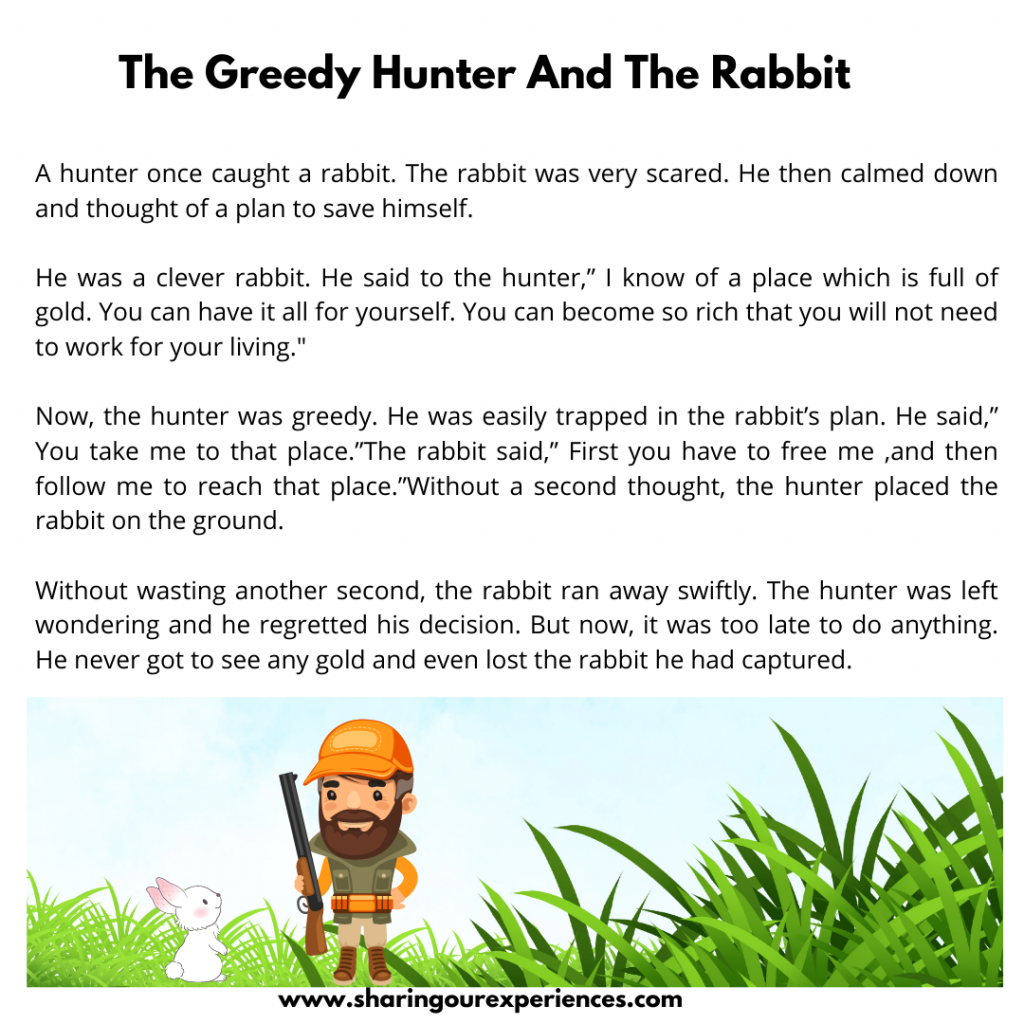
There once lived an elephant in a jungle. He was very arrogant and short-tempered. He was very proud of his strength and huge body. The other animals in the jungle feared him a lot. He enjoyed doing things that showed off his strength and always troubled other small animals in the jungle.
In that jungle, there also lived a family of ants in a tiny hole. The ant used to despise the elephant for his haughty nature. One day, when the ants were away to collect food, the elephant stopped them and sprayed a trunk full of water on them.
The ants got angry and said,†You should not trouble others for your pleasure.â€The elephant shouted angrily and said,†You tiny creatures, keep quiet, or I will crush you to death.â€
Now, the ants decided to reach the arrogant animal a lesson for life. They slowly crept under his trunk and spread to his ears and started biting him. The elephant became restless and started crying for help.
None of the animals came forward to rescue him. They were happy to see him getting punished for his acts. He kept apologizing to the ants, but they continued to bite him.
When they were sure that he has learned his lesson, they let him go and said, “This is how others feel when you hurt them.†The ants marched off leaving a wailing elephant there. Then on, the elephant never troubled anyone in the jungle.
Moral : Pride and arrogance never go unpunished.
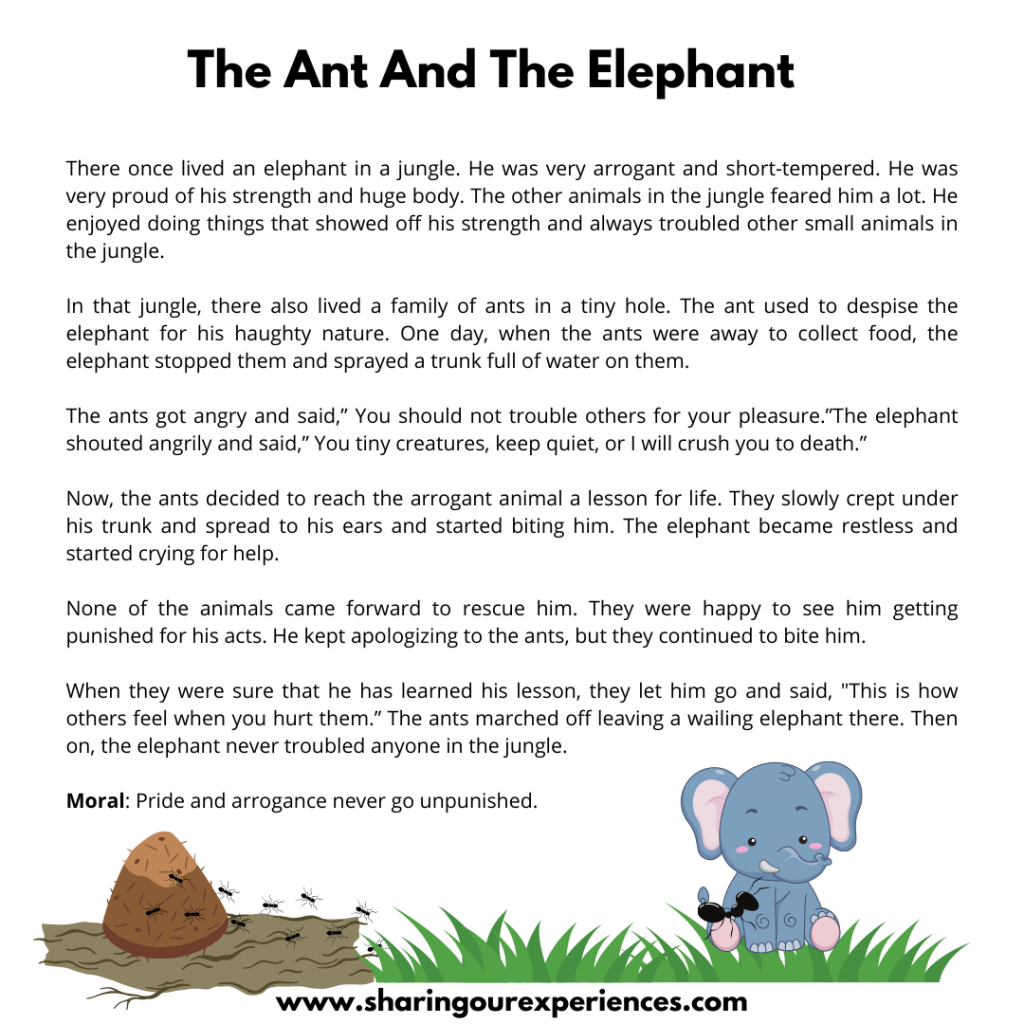
Once a monkey and a crocodile were friends. The monkey lived on a jamun tree on the bank of the river where the crocodile lived. The monkey used to feed on the jamuns and share them with the crocodile.
One day, the crocodile took some fruits home for his wife. The wife tasted it and loved the fruit. She asked her husband,†Where did you get these from?†The crocodile then told her about his friend, monkey. The wife expressed her desire to eat the monkey’s heart.
The crocodile refused, but she continued to persuade her husband. Finally, he gave in. He was upset as he loved the monkey much and did not want to see him killed. The next day he lied to the monkey that his wife had invited him (the monkey) for dinner. The monkey gladly accepted the invitation. He jumped on the crocodile’s back and reached the middle of the river.Â
The monkey noticed that the crocodile was looking lost. The crocodile could no longer hide anything. He said that his wife would eat his heart. He didn’t want to cheat his friend but was left with no other option.
The monkey was shocked, but he calmed himself and said in a friendly tone,†Why did not tell me earlier? I left my heart on the tree. Let’s swim back to the bank to get it .â€The foolish crocodile immediately agreed and quickly swam back to the river bank.
The monkey quickly jumped off the crocodile’s back and climbed up to the topmost branch of the tree. He shouted,†You fool, how can someone live without his heart. You don’t deserve to be my friend. Get lost.â€The crocodile was sad to lose his good friend forever.
Moral : Foolishness can make you take wrong decisions.

There was a cap seller . He used to make and sell caps to neighboring villages and markets. One day, he packed all his caps in a basket and set afoot on his journey. It was a hot day. He got tired of walking and decided to rest under a big banyan tree. Since he was very tired, he fell asleep.Â
After some time, he woke up. He was shocked to see his basket empty. The caps were missing. He started looking everywhere when he suddenly spotted a monkey wearing a cap.Â
He looked up to the tree and saw many monkeys wearing his cap. He now understood everything.When he was sleeping, several monkeys came down the tree and pulled the cap seller’s basket. They picked up the caps and climbed back up the trees.Â
The cap seller became very upset. He shouted at the monkeys on the tree. The monkeys yelled back at him. The cap seller was irritated. He picked up few stones from the ground and threw them at the monkeys to scare them. But the monkeys started pelting stones in return too.Â
The cap seller was frustrated now. He started crying. The monkeys started crying too. Now, he realized that the monkeys were imitating him.
He thought of an idea and threw his cap on the ground. Seeing this, all the monkeys copied his action and did exactly the same. The cap seller quickly collected his caps in the basket and ran away.
Moral : Wisdom is powerful than strength.
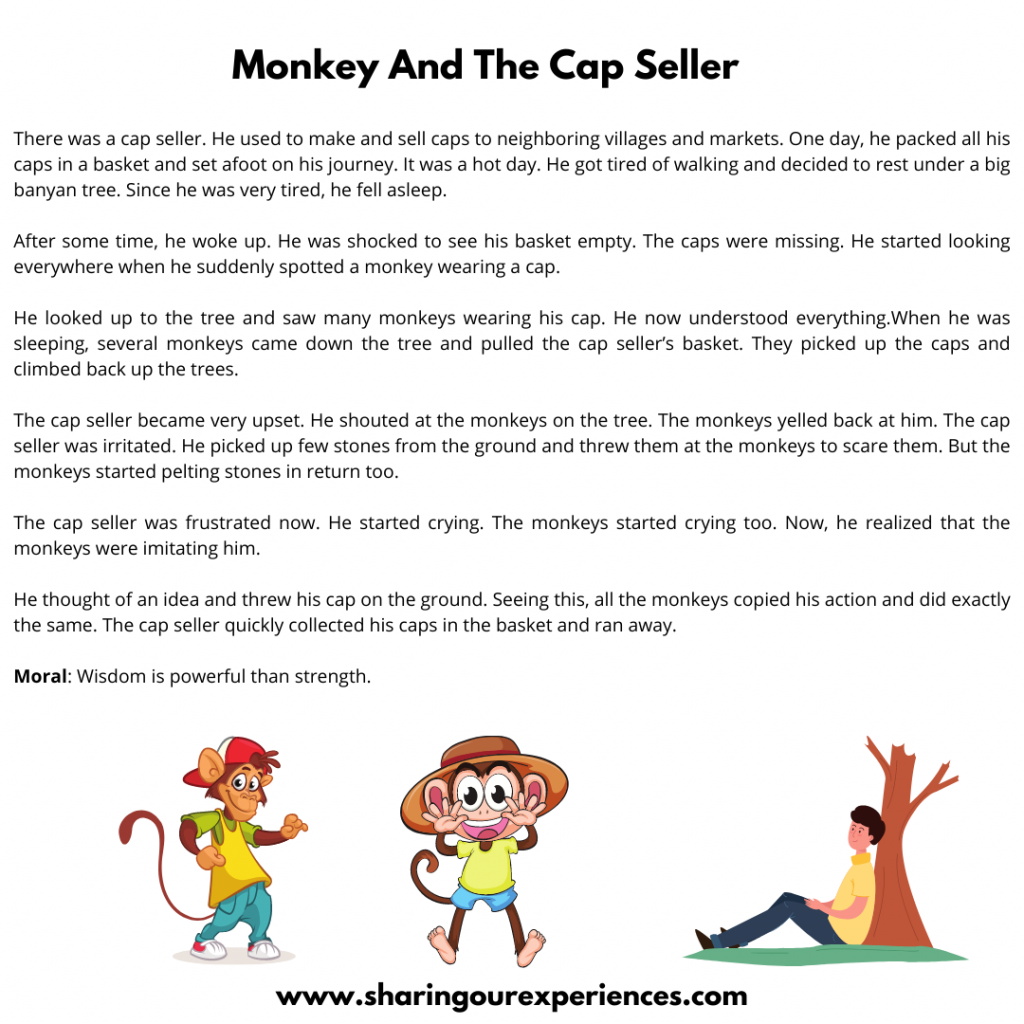
There once lived a hare in a jungle. He was very proud of himself. In the same jungle lived an old tortoise. The arrogant hare found him funny and always made fun of his slow pace in front of other animals.
The tortoise lost his cool one day and challenged the hare for a race. Everybody was surprised, and the hare was laughing loudly. Nevertheless, he accepted the challenge. The race was to take place the next day. The winner had to reach the bank of the river. They started the running race.
The hare ran very fast. But the tortoise walked very slowly. Within no time, the proud hare was halfway through the distance. He thought to himself that the tortoise with his slow pace can never match him. So, he decided to rest under a tree for some time. But, he soon fell asleep.
On the other hand, the tortoise continued to walk towards the finishing point without pausing for a rest. He passed by the sleeping hare. Soon, it was sunset. There was a loud noise of clapping.Â
That day the hare had slept longer than usual. When he woke up, he heard the clapping sound at a distance. He ran fast towards the finishing line. He was shocked to see the old tortoise at the finishing line. All the animals were celebrating his victory. The hare had learned his lesson for life. He never mocked anybody thereafter.
Moral :Slow and steady wins the race.
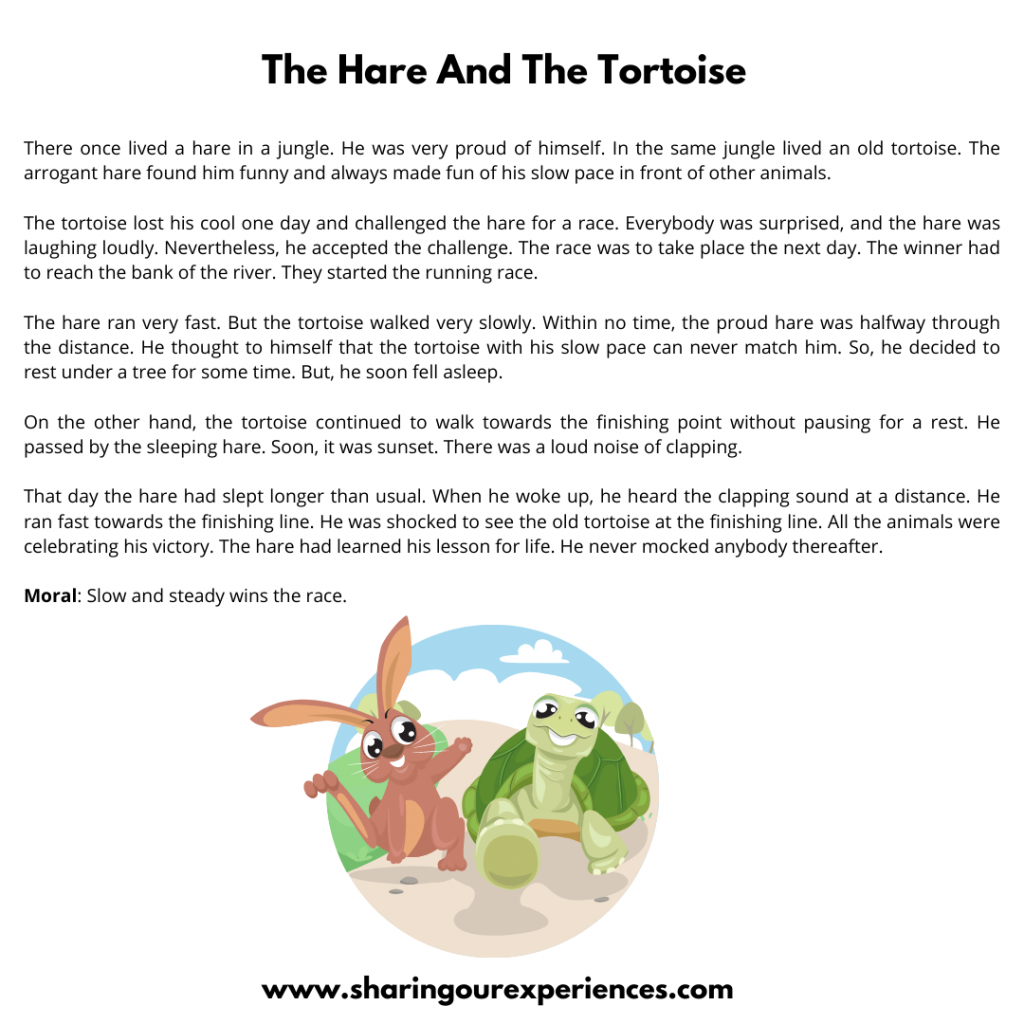
We found amazing and irresistible deal on Kindle Paperwhite 10th gen Kindle gives you access to a variety of free, unlimited books; makes your investment worth it.
Once upon a time, there lived a poor milkman. He was extremely lazy. He did not want to do any hard work. He was, always busy daydreaming about getting rich.
One morning he milked his cows and set out to sell the milk in the market. While walking, he began to dream about becoming rich.
He dreamt: “ I will sell the milk in the market. With the money, I would buy a hen. The hen will lay eggs. Some will be sold in the market. Some will hatch and become chicks. These chicks will become cocks and hens, who, in turn, will lay hundreds of eggs. I would soon have his poultry farm
He kept on imagining:â€.Again, I will sell all the hens to buy some bull. And finally, sell the bulls to buy a small house. While thinking about all this, he overlooked a stone on the way.
He fell over it and the milk spilled on the ground. All his dreams were broken in a second, and he realized he was daydreaming.
Moral : Work hard to fulfil your dreams.

Two cats once found a piece of bread. They both were very hungry. They were not willing to share the food with each other. They started fighting for the bread. One cat said, “I found it first it’s mine.” Another cat said, “No I found it first, it’s mine”Â
A monkey was seeing this from a distance. He wanted to eat the bread too. He thought of a plan to eat it himself. He approached the cats and asked them why they were quarreling. The cats told him everything. He then offered to solve the matter. He said,†I will divide the bread into two equal halves and give it to you.â€
Both the cats agreed to his proposal and gave him the bread. He cunningly divided the bread into two uneven pieces- one was bigger than the other. He then took a big bite from the bigger part. But this made the other part bigger than the other. He continued doing this until he ate the whole of the bread.
The two cats were too late to realize his cleverness. The monkey fled away after eating their bread right in front of them. They now realized that had they shared the bread with each other, they would not have been left hungry.
Moral : If two people fight, the third one takes an undue advantage.
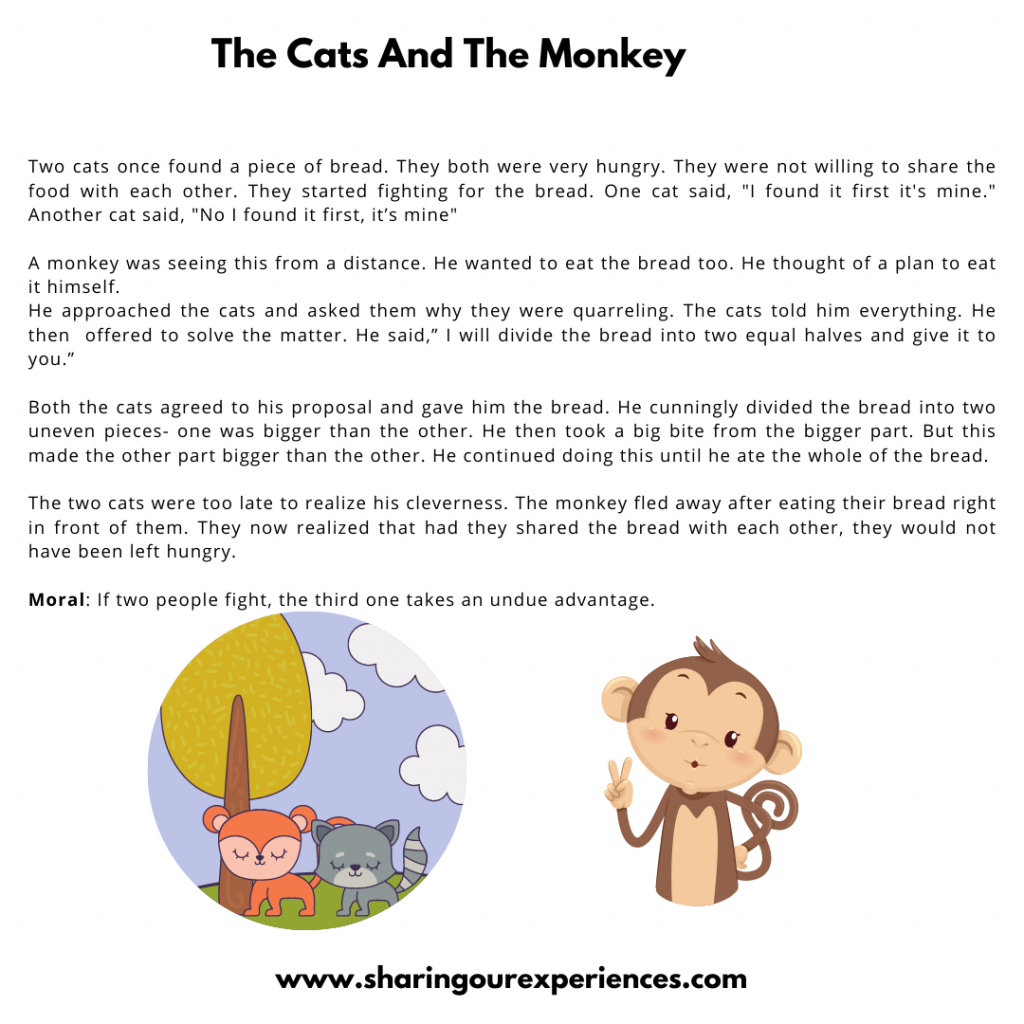
A greedy dog once found a juicy bone lying near a meat shop. He picked it up and held it tightly in his mouth. He looked here and there, and then, ran away to a lonely place. He stopped at a bridge over the river that ran nearby.Â
There he saw his reflection in the water. He thought that there was another dog with a bone in the water. He got greedier and thought of taking away that bone from the other dog.Â
He immediately started barking at his reflection in the water. The moment he opened his mouth, the bone in his mouth fell into the river. The greedy dog did not get any bone and even lost the one he had. He realized his mistake and left the place feeling upset.
Moral : Greed causes pain and brings regret.
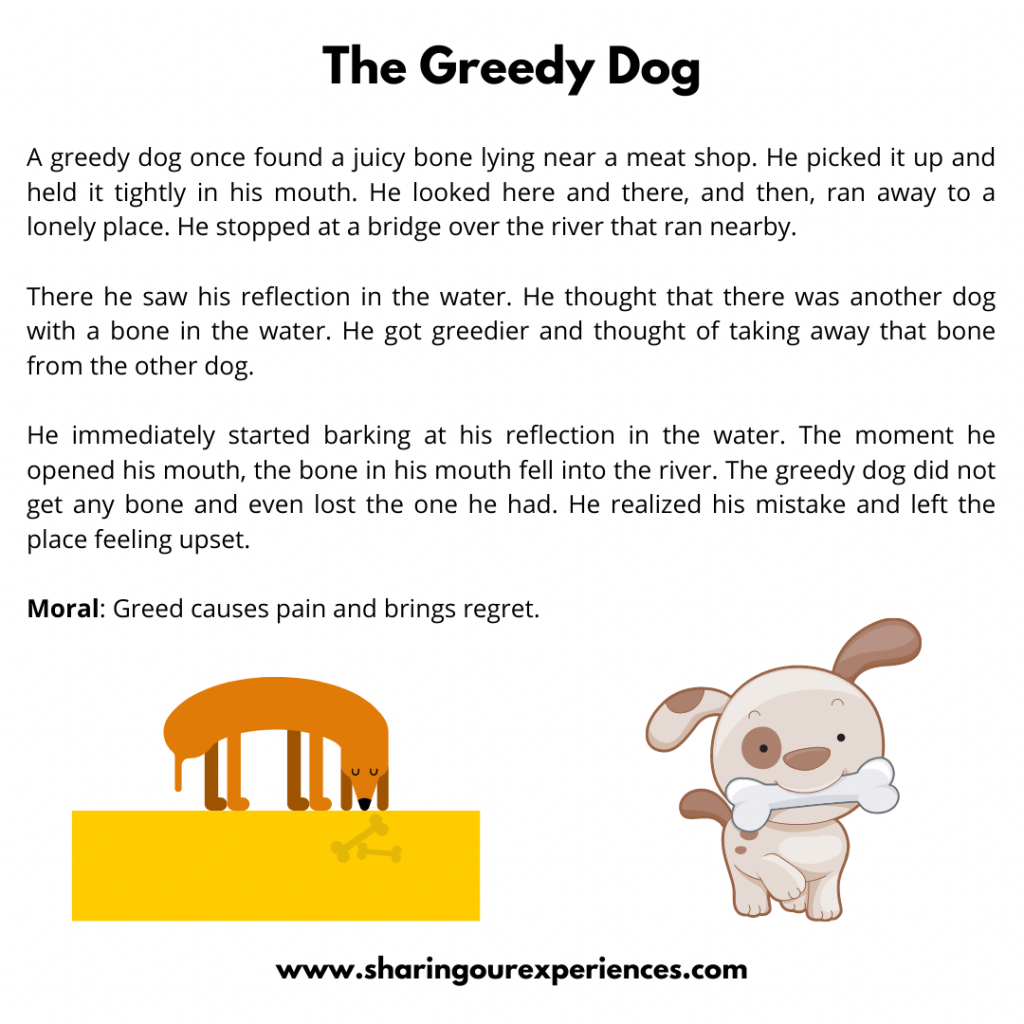
H ave you checked out Caravan mini for stories, Poems, songs, shlokas and bhajans ?? It is an awesome device that will make your life easy and something your child will truly love!! Check out Caravan Mini for kids Reviews
Once a fairy gifted a magical goose to a poor farmer. It laid one golden egg every morning. The farmer made money by selling that golden egg in the market. Slowly, he became rich.
Now, the farmer became greedy. He wanted more wealth. He thought to himself,†This goose gives me just one golden egg a day. What if I cut it open and take out all the golden eggs at once? I will be the wealthiest person in the village.â€
Without a second thought, the farmer took a knife and killed the goose. He cut open his belly, but could not find any egg there. He started crying when he realized his mistake. He not only lost the goose but also the golden egg it laid every day.
Moral : Greed causes miseries.
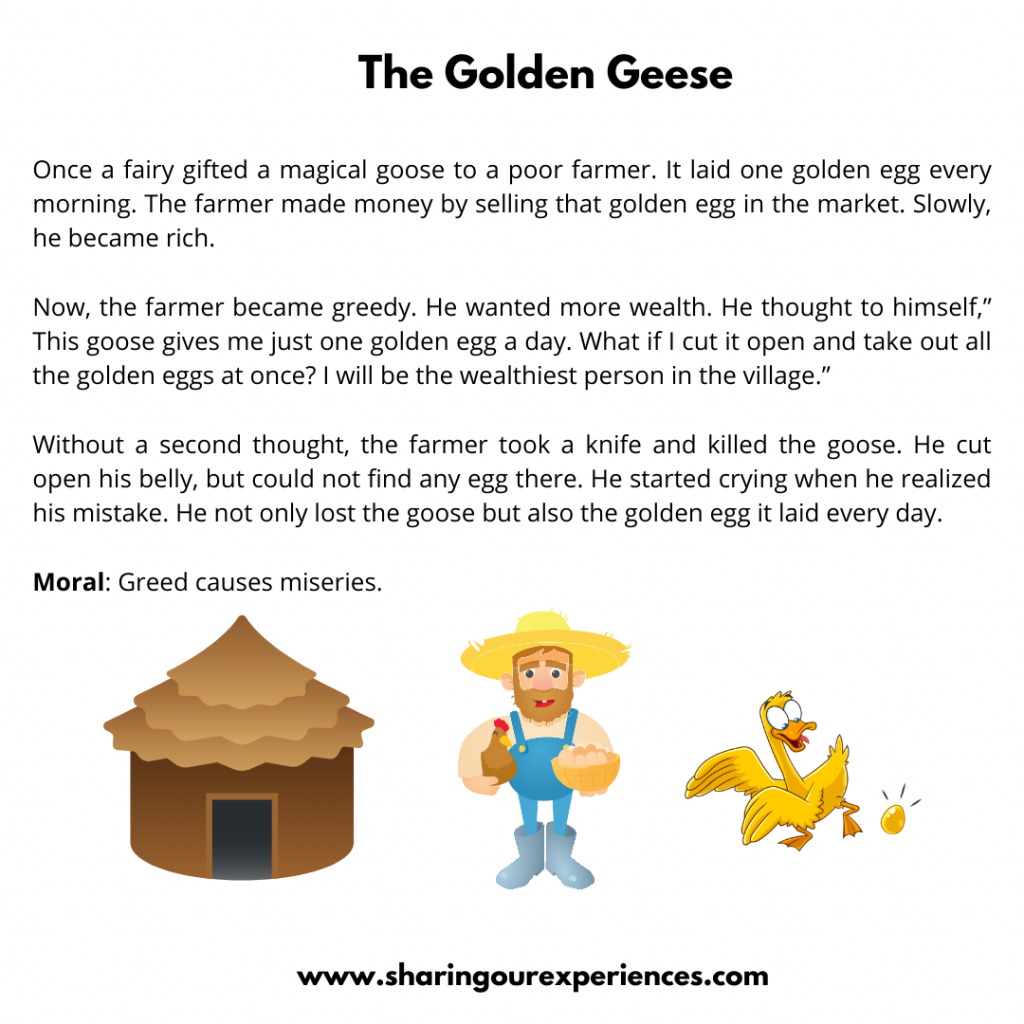
Once there lived an old farmer in a village. He had four sons. They were always quarreling with each other. The farmer tried hard to bring unity among them. He would request them to live with love and peace, but they would never listen to his advice. He was always worried about their future.
One day, he fell sick. He thought that it was his chance to bring harmony among his sons. So, he called his sons and asked each of them to bring a few sticks. They brought the sticks to their father.
The farmer asked one of them to tie the sticks in a bundle. He then asked each of them to try and break the sticks.
One by one, all the four sons tried to break the bundle but failed. Then, the farmer untied the bundle. He gave one stick to each of them and asked them to break it. This time they were able to do it easily.
The farmer said, “I just wanted to show you that if you are united nobody can defeat you. But you keep quarreling among yourself, you will be easily broken by anyone.â€The sons learned their lesson and lived happily with their father thereafter.
Moral : Unity is strength.
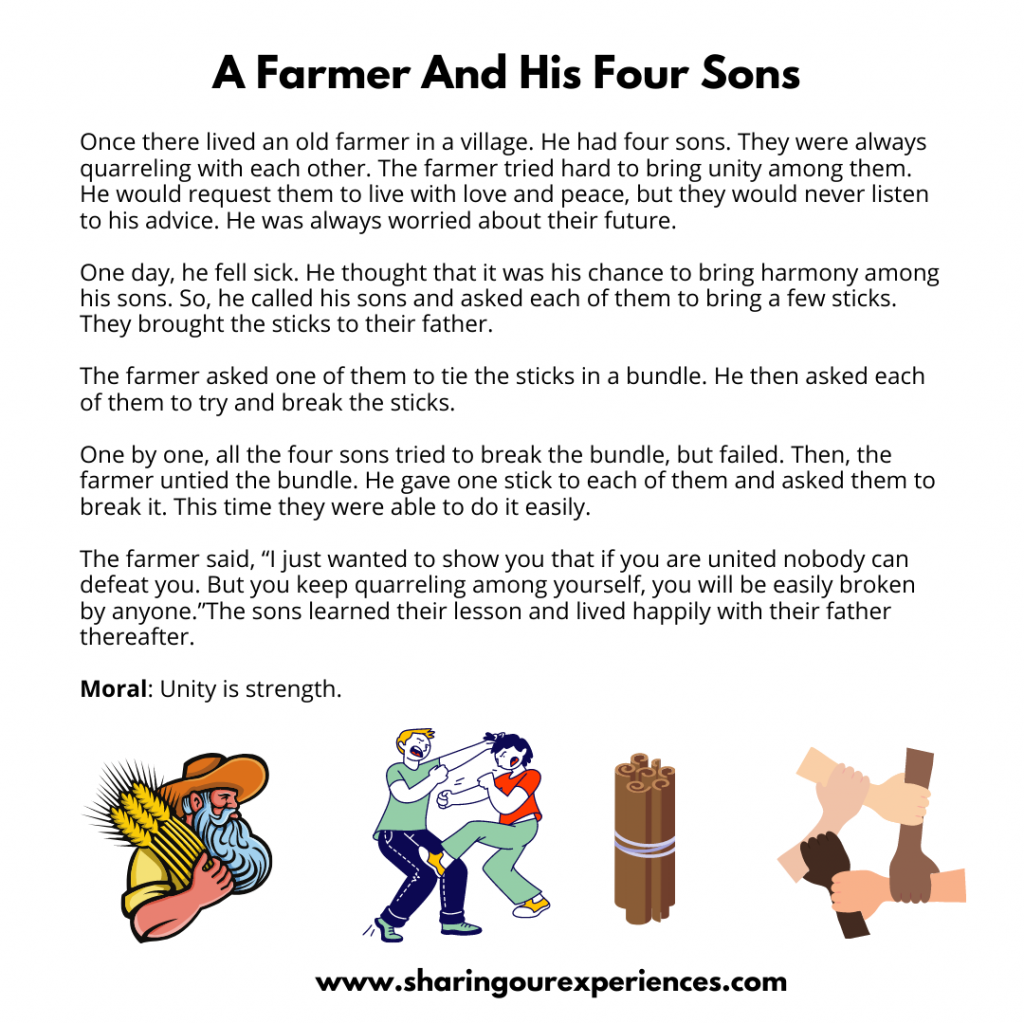
Once there was a big warehouse full of rice bags. Many rats lived there and ruined the grains. The owner was tired of finding ways to keep the rats away. So, he bought a cat and left it in the warehouse.
The cat would silently play around and chased the rats away. The rats were terrified and decided to have a meeting. They gathered together one evening at a secluded place and started their discussion. They were very confused and couldn’t think of any solution to stop the cat.Â
Suddenly one of the rats said, ” We should tie a bell around the cat’s neck. If we tie a bell around the cat’s neck, we can hear the sound of the bell when the cat comes. This way we would be alerted.”Â
The rats found the idea interesting. Then a rat asked, “who will tie the bell around the cat’s neck?” Now, all the rats fell silent as no one was willing to take a risk. They understood that it is easier said than done.
Moral :Most things are easier said than done.            Â

There was a shepherd boy who had to look after a flock of sheep. He was very lazy and always troubling others. One day, he took his flock to the hills to graze. He felt bored and decided to play a trick on the villagers for some fun.
He shouted, “Help! Wolf! Wolf!†The villagers who were working on the farm heard his cries. They took some tools and rushed out of the village to help the shepherd boy. On reaching the hills, they were surprised to see that there was no wolf.
The boy laughed loudly, “Ha, Ha, Ha! I fooled you all. I was only playing a trick on you.†The villagers were enraged, and they went back.
A few days later, the boy played this trick again. Again he cried, “Help! Help! Wolf! Wolf!â€Â This time, too, the villagers rushed up the hills to help him. Again, they found that the boy had tricked them. They were very angry with him for being so naughty and reckless. But, the boy laughed at them.
Then one day, a wolf actually came to the hills where the sheep were grazing. The wolf attacked the sheep one by one. The boy cried out for help. He shouted, “Help! Help! Wolf! Help! Somebody!â€
The villagers heard his cries, but they thought the boy was tricking them again. They continued to work ignoring his cries. The boy somehow escaped from there, but his sheep were eaten by the wolf. He now learned his lesson for life. He promised himself to never lie again and trouble others.
Moral : No one trusts a person who lies, even if he is telling the truth.
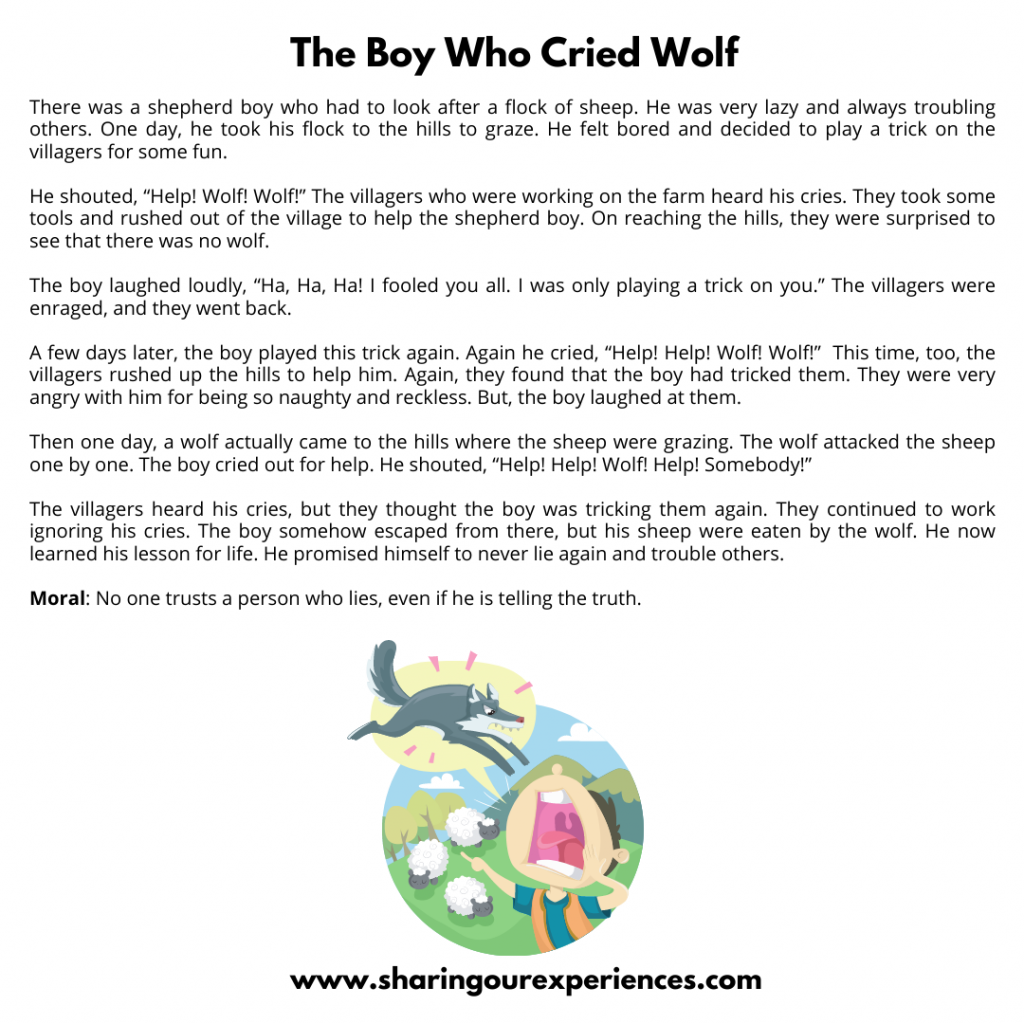
AÂ crow once found a big piece of cheese. He held the cheese in his beak and flew away to a nearby tree. A fox was passing by when he saw the crow with the big piece of cheese in his mouth.Â
He went to the crow and said ” Good morning, dear crow. You have a lovely piece of cheese with you. Could you please share a bit with me?”.Â
The crow refused and looked away. The fox begged a little, but the crow wouldn’t listen. He just sat there, quietly eating his cheese.Â
But the fox didn’t give up. He continued persuading the crow. He called the crow handsome and praised his black feathers. He said,†You have a beautiful voice too. Everyone in the forest is praising your voice. Can you sing a sweet song for me?”.Â
The fox saw the crow swelling with pride. The foolish crow believed the cunning fox. He suddenly forgot all about the cheese and began to sing.Â
As soon as the crow began to sing, the piece of cheese fell down to the ground. The fox immediately picked it up and ran away. The crow was left crying on the tree all by himself.Â
Moral:Â Beware Of flatterer.
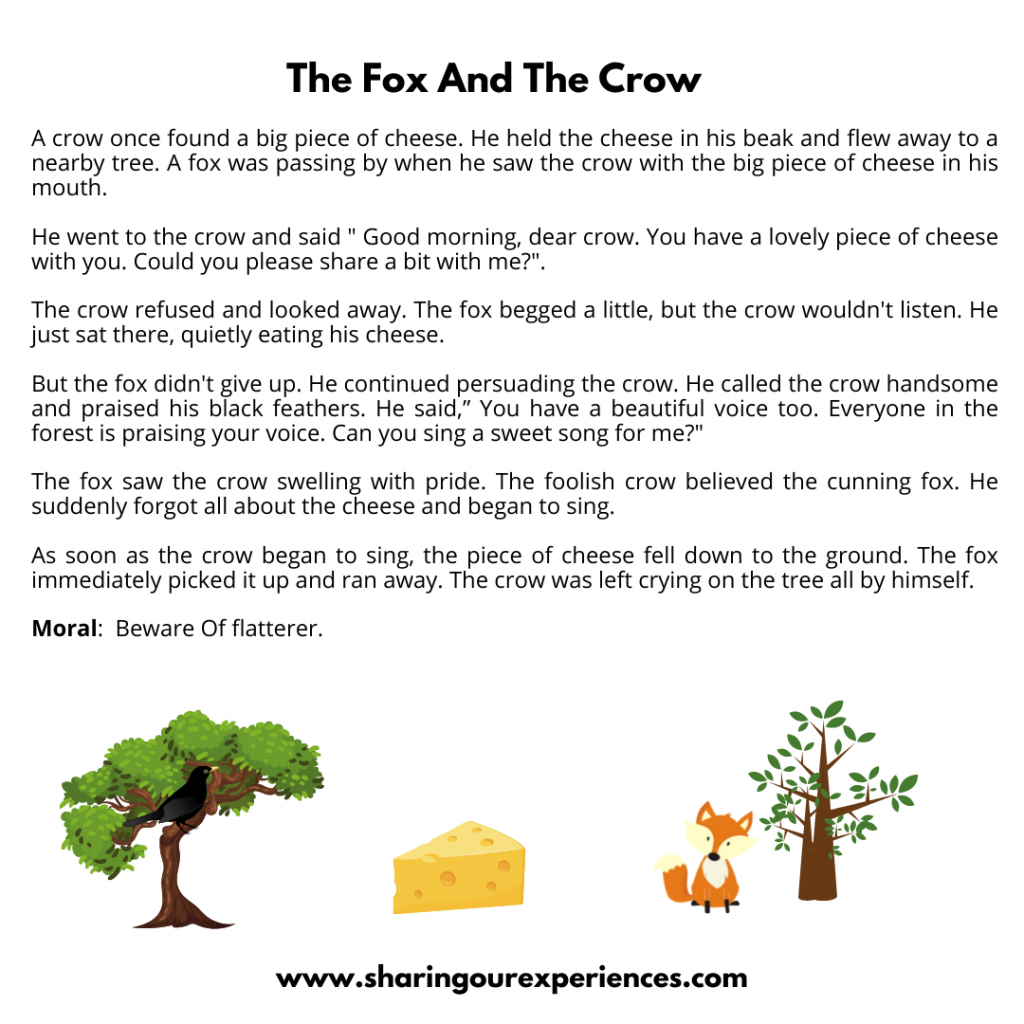
Long ago, a pigeon flew down to drink water from a river. While drinking, she noticed an ant flowing away with the water. She thought of helping the ant. She looked around and plucked some leaves from the tree. She then flew over the river and dropped it into the water near the struggling ant.Â
The ant quickly climbed over the leaf and reached the shore safely. The ant was grateful to the bird and thanked her. The pigeon smiled and said that it was her duty to help someone in need. She then flew away.
 A few days later, a hunter came to the jungle. He was aiming at a pigeon that sat on a nearby tree. The ant was walking through the forest when she noticed the hunter with a gun.
She immediately recognized the pigeon who had saved her life. She decided to return the favor by helping the bird. She crept into the hunter’s trousers and bit him hard.
The hunter fired the shot but missed his target because of the ant bite. The pigeon heard the gunshot and was alarmed. She flew away.
The ant, too, quickly jumped off the hunter’s leg and fled into the forest. The hunter sat there upset and saw the pigeon flying away.
Moral : We should always help others selflessly.
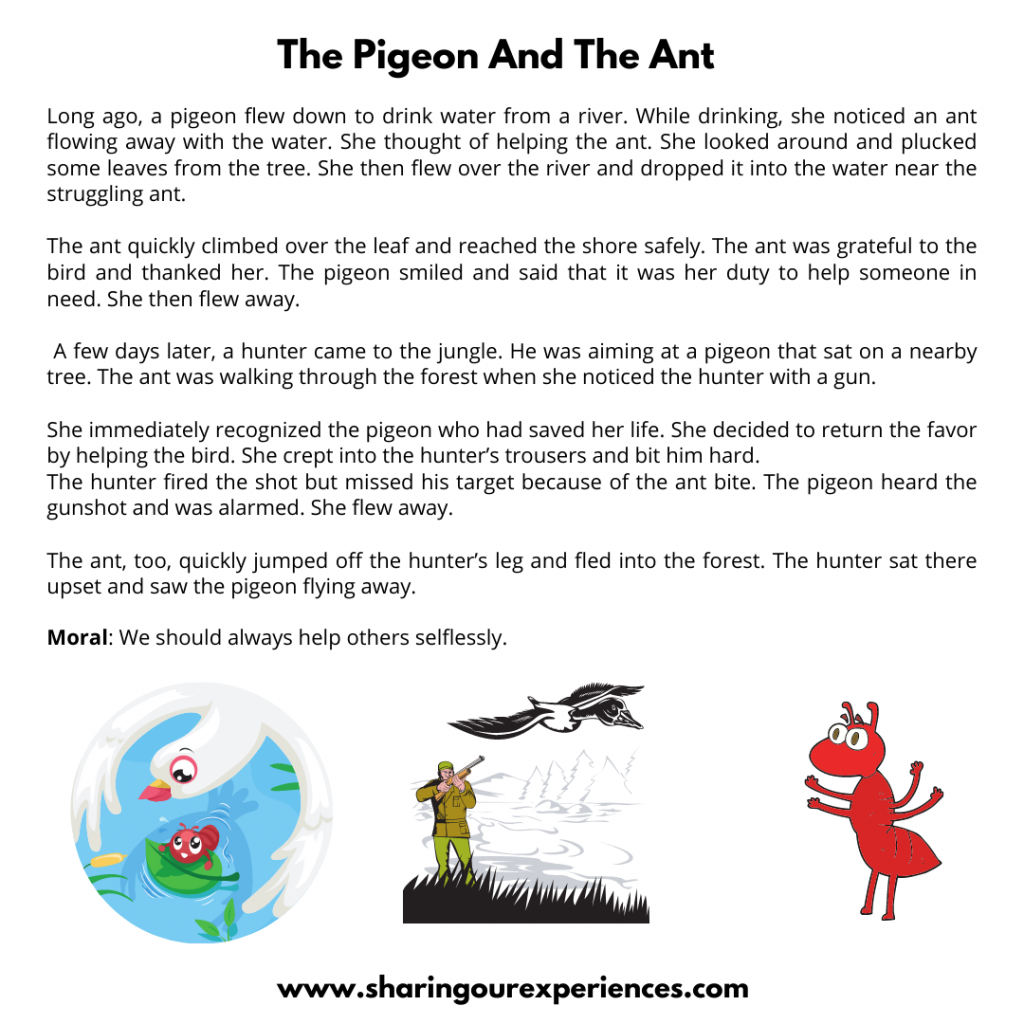
Once there lived three fishes in a lake. They were very good friends. They loved playing with the other fishes in the lake. One day, some fisherman came near the lake. They saw many fishes there and decided to come back the next day to catch them all.
One of the three fish heard the fishermen talking. She hurried back to her friends and alerted them. She suggested that they should leave the lake immediately and go to some safer place. To this, the second fish agreed, but the third fish refused to go.Â
She said, “ It is not wise to run away from here. If we are destined to die, then we will surely die. Nobody can save us. So, I am not going anywhere.
The first fish said her goodbyes to her friends and immediately left with her family to some other lake. The second fish waited for the morning. When she saw the fishermen, she, too, left the lake with her family.
The fishermen spread their nets and captured all the fish from the lake. The third fish was also captured, and they all died.
Moral : We should act immediately when we see a danger approaching.
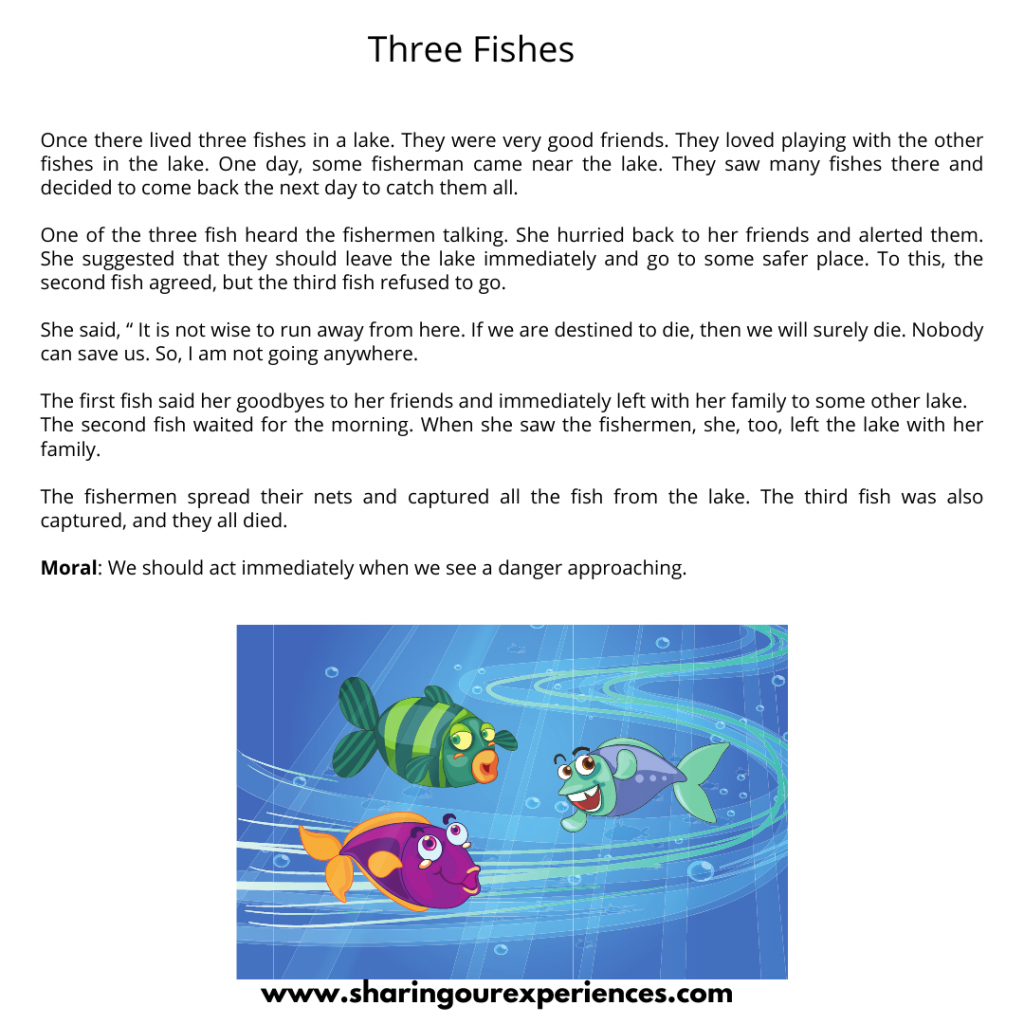
Long ago, there lived a tortoise and two swans in a pond. They were very good friends. The tortoise was very talkative. He used to talk to swans for a very long time. All of them were happy.
Once there was a drought and it lasted for a long time. The water in the pond dried up. There was no water to drink even and it was now impossible to live there. So, the swans decided to fly away to some other place.
The tortoise requested the swans to take him along too. But, since he couldn’t fly, they sat down to think and found a way. The swans suggested an idea according to which the tortoise would have to hold a piece of the stick by its mouth and the swans will hold the ends of that stick.
They warned the tortoise to not talk during their journey. The tortoise promised, and the three friends set out to fly. On their way, they crossed several villages. Many villagers saw the tortoise and made fun of the tortoise.Â
This enraged the tortoise and he couldn’t control himself. He opened his mouth to speak. As soon as he did so, he fell down and died. The swans were shocked to see their friend die. The tortoise lost his life because of his foolishness.
Moral : We should listen to our friend’s advice.
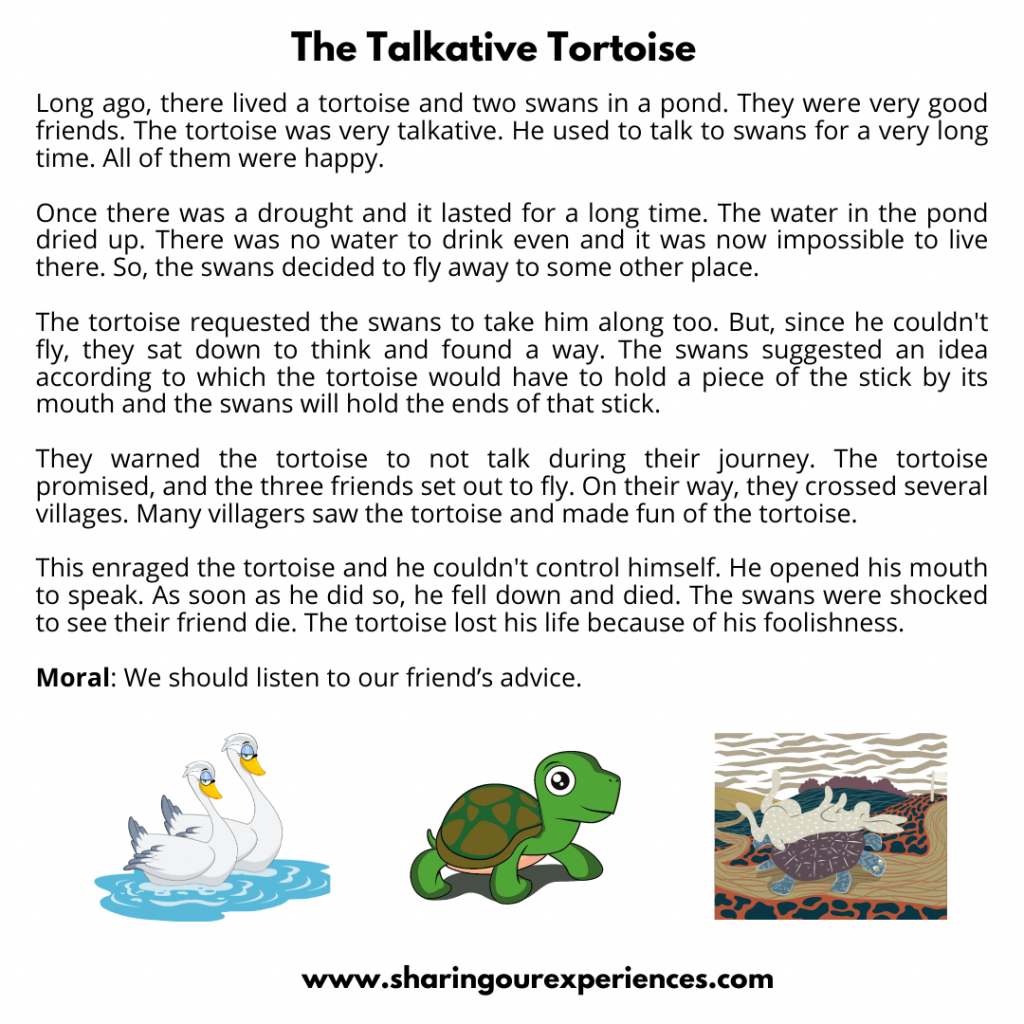
Emperor Akbar was famous for asking tricky questions to his courtiers. One day, his question left everyone in the courtroom puzzled. Just then, Birbal walked in and asked what the matter was.
The other courtiers repeated the question to him. The question was, “How many crows are there in the city?â€
Birbal thought for a moment and smiled. He replied,†There were ten thousand, six hundred and twenty-nine crows in the city.” When asked how he knew the answer, Birbal replied, “Ask your men to count the number of crows. If there are more, then the relatives of the crows must be visiting them from nearby cities. If there are fewer, then the crows from our city must be visiting their relatives who live outside the city.â€Â
The courtiers applauded the witty answer of Birbal. Pleased with the answer, Akbar presented Birbal with precious gifts.
Moral : Having an explanation for your answer is just as important as having an answer.

Long ago, King Midas ruled in ancient Greece. He was a fair and wise king. His people were happy and prosperous under his rule. The king was known for his love for gold and his love for his only daughter, Marigold.
One day, he gave royal treatment to Silenus, the best friend of God Dionysus( the God of wine). Pleased with the king’s selfless hospitality, Dionysus granted him a wish.
Midas was overjoyed. He thought for a second and asked a boon that whatever he touches turns into gold. God granted him the wish. He said that from the following morning his mere touch will turn everything gold.
Midas eagerly waited for the sunrise. He couldnt wait to use his newly-acquired powers. He went about touching various objects and they turned into gold!
He was shouting with joy. After some time, he became hungry. The moment he touched a glass of water he could not drink it. It became solid gold. As he picked the bread, he could not eat it. It turned into gold.
He groaned in dismay and realized his folly. Just then, his daughter came to hug him. The moment she touched her father, she turned into a gold statue.
The king started wailing and realized that his golden touch is not a blessing. He begged God Dionysus to pardon his mistake and take back his boon. Since Midas was a kind-hearted man, Dionysus appeared before him and took away the golden touch power he had given to the king.
Everything turned back to normal immediately. Marigold came and hugged her father. Midas no longer considered gold as the greatest thing in the world. He had a hearty breakfast with his daughter.
Moral : Greed always causes pain and brings about downfall.

One day, a farmer named Bholaram, bought a well from his neighbor, Dharma. Dharma was a cunning man. When Bholaram went to fetch water from the well the next day, Dharma stopped him.
When asked why, he said that he had sold only the well to Bholaram, not the water. In order to use the water, Bholaram must pay for it.
Bholaram was shocked to see the cunningness of his neighbour. He took the matter to the court of Emperor Akbar. There, his minister, Birbal was given the responsibility to solve the matter.
Birbal called Dharma and asked why he was not letting Bholaram take the water from the well. To this, he replied,” I just sold the well, not the water within it. So, Bholaram has no right over the water.”
Birbal thought for a second and said, ” Since you have sold the well to the farmer, you have no right to keep your water in it. If you do so, you have to pay him the rent for using his well. Else, take out all your water immediately.
Dharma was caught off guard. He realized his cunning scheme stood no chance before the razor-sharp wit of Birbal. He apologized and went home.
Moral : Cheating can never lead to happy endings. You have to pay for your mistakes.

One day, a group of students were sitting in class when their teacher walked in. She had a stack of papers in her hand and began passing them out to the students.
“These are your mid-term exams,” she said. “I’ll be grading them and returning them to you tomorrow.”
The students groaned as they took their exams. They all knew that this was going to be a long night.
As the students worked on their exams, one of the boys began to cheat. He looked around the room to see if anyone was watching, and then he began to copy the answers from the student next to him.
The boy continued to cheat for a few minutes, but then he started to feel guilty. He knew that he was doing something wrong, and he didn’t want to get caught.
So, the boy stopped cheating and finished the exam on his own.
When the teacher returned the exams the next day, the boy was relieved to see that he had gotten a good grade. He had learned his lesson and realized that cheating is never the right thing to do.
Once upon a time, a wise man said that time is the most valuable thing a person can have. He was right! Just think about all the things you can do with your time: learn new things, play with friends, explore the world, help others, and so much more.
So don’t waste your time! Use it wisely, and you’ll be sure to achieve great things in life.
Another short story below,
One day, a little girl was playing in her backyard when she found a watch. She was excited to have found such a pretty thing and ran to show her mom. Her mom was very pleased and told her that she could keep the watch, but she must always remember that time is very valuable. The little girl was very happy and thanked her mom. She wore the watch all the time and made sure to be extra careful with it. Whenever she looked at the watch, she remembered her mom’s words and was reminded of how valuable time is.
Another short story about a girl below
Once upon a time there was a little girl who had a very special gift. She could make time stand still. She used her gift to help other people. She would help them finish their chores or tasks so they could have more free time. One day, she met a woman who was very sad. She had lost her husband and was having a hard time coping. The little girl used her gift to help the woman. She made time stand still so the woman could grieve and spend time with her husband’s spirit. The woman was very grateful and the little girl realized that her gift was very valuable. She used it to help others and make their lives better.
If you like this article on short stories do not forget to share it with others. Anything else we would love to hear from you, so do let us know your inputs in the comments below
Tag – short stories with moral , best English story with moral , moral value story in English , moral stories in English matter , small story in english with moral

How to Potty Train your Toddler- toilet training essentials you need to buy

80+ Heartfelt Father's Day Quotes for Father and Son
A curious mind who loves to reason and dig for facts, a part- time blogger and a full-time mother to a super active baby doll, and a mythology lover. I love to muse over anything that piques my curiosity and pen down my feelings as and when possible.

10+ Best Moral Stories for Puppet Show

50+ short folktale stories with moral lesson

Empowering Parents: 10 Lines short stories with Morals – Your Solution to Engaging and Educating Your Children
Leave a reply cancel reply.
- Free worksheets
- Early Childhood Education
- Parenting Tips
- Kids Activities and Crafts
- Money-Making and Saving tips
- Downloadable Worksheets
- Bestsellers
- Sharing our Experiences – Our Story: Get to Know Us Better
- How to earn money FAQs
- Get in Touch: Contact Us Today
- Shipping and Delivery
- Return and Refund Policy
- Privacy Policy

Easter Fun Activity Bundle

Shopping cart
- Craft and Criticism
- Fiction and Poetry
- News and Culture
- Lit Hub Radio
- Reading Lists

- Literary Criticism
- Craft and Advice
- In Conversation
- On Translation
- Short Story
- From the Novel
- Bookstores and Libraries
- Film and TV
- Art and Photography
- Freeman’s
- The Virtual Book Channel
- Behind the Mic
- Beyond the Page
- The Cosmic Library
- The Critic and Her Publics
- Emergence Magazine
- Fiction/Non/Fiction
- First Draft: A Dialogue on Writing
- Future Fables
- The History of Literature
- I’m a Writer But
- Just the Right Book
- Lit Century
- The Literary Life with Mitchell Kaplan
- New Books Network
- Tor Presents: Voyage Into Genre
- Windham-Campbell Prizes Podcast
- Write-minded
- The Best of the Decade
- Best Reviewed Books
- BookMarks Daily Giveaway
- The Daily Thrill
- CrimeReads Daily Giveaway

10 Short Stories with Great Dialogue That Aren’t “Hills Like White Elephants”
Do you believe in life after hemingway.
Before you get excited: I have no problem with “Hills Like White Elephants.” In this classic story, Ernest Hemingway demonstrates a masterful, subtle use of dialogue—so much so that it has become, if not a totally clichéd, then at least a ubiquitous text in creative writing classrooms. I myself encountered it at least four times by the time I got to grad school—where I proceeded to teach it to my own Introduction to Creative Writing class. It’s the circle of life. This is only to say that I’m not immune—but I also know there are plenty of other stories with strong dialogue out there, and as another school year (such as it is, in 2021) gets going, they’re probably worth a look too. Just for fun, you know?
So I asked the Literary Hub staff to suggest some of their other favorite short stories that do cool things with dialogue, and I’ve collected a few of them here. Obviously this list is not exhaustive—among other things, we also shied away from some other tried-and-true dialogue-heavy classics, like “The Dead” and “What We Talk About When We Talk About Love,” and “Steady Hands at Seattle General”—and of course these stories are mostly not doing the same thing as “Hills Like White Elephants,” but they’re all doing something interesting. Just in case you want to mix it up a little this year.
Sam Lipsyte, “ The Dungeon Master ,” from The Fun Parts
Sample Dialogue:
The Dungeon Master has detention. We wait at his house by the county road. The Dungeon Master’s little brother Marco puts out corn chips and orange soda.
Marco is a paladin. He fights for the glory of Christ. Marco has been many paladins since winter break. They are all named Valentine, and the Dungeon Master makes certain they die with the least possible amount of dignity.
It’s painful enough when he rolls the dice, announces that a drunken orc has unspooled some Valentine’s guts for sport. Worse are the silly accidents. One Valentine tripped on a floor plank and cracked his head on a mead bucket. He died of trauma in the stable.
“Take it!” the Dungeon Master said that time. Spit sprayed over the top of his laminated screen. “Eat your fate,” he said. “Your thread just got the snippo!”
The Dungeon Master has a secret language that we don’t quite understand. They say he’s been treated for it.
Whenever the Dungeon Master kills another Valentine, Marco runs off and cries to their father. Dr. Varelli nudges his son back into the study, sticks his bushy head in the door, says, “Play nice, my beautiful puppies.”
“Father,” the Dungeon Master will say, “stay the fuck out of my mind realm.”
“I honor your wish, my beauty.”
Dr. Varelli says things like that. It’s not a secret language, just an embarrassing one. Maybe that’s why his wife left him, left Marco and the Dungeon Master, too. It’s not a decent reason to leave, but as the Dungeon Master hopes to teach us, the world is not a decent place to live.
Danielle Evans, “ Virgins ,” from Before You Suffocate Your Own Fool Self
“Look what Eddie gave me,” said Cindy, all friendly. She pulled a pink teddy bear out of her purse and squeezed its belly. It sang “You Are My Sunshine” in a vibrating robot voice.
“That’s nice,” said Jasmine, her voice so high that she sounded almost like the teddy bear. Cindy smiled and walked off with Eddie, swinging her hips back and forth.
“I don’t have a teddy bear neither,” said Eddie’s friend Tre, putting an arm around Jasmine. She pushed him off. Tre was the kind of boy my mother would have said to stay away from, but she said to stay away from all men.
“C’mon, Jasmine,” Tre said. “I lost my teddy bear, can I sleep with you tonight?”
Jasmine looked at Tre like he was stupid. Michael put an arm around each of our shoulders and kissed us both on the cheek, me first, then Jasmine.
“You know these are my girls,” he said to Tre. “Leave ’em alone.”
His friends mostly left me alone anyway, because they knew I wasn’t good for anything but a little kissing. But I was glad he’d included me. Michael nodded good-bye as he and his friends walked toward their movie. Eddie and Cindy stayed there, kissing, like that’s what they had paid admission for. I grabbed Jasmine’s hand and pulled her toward the ticket counter.
“That’s nasty,” I said. “She looks nasty all up on him in public like that.”
“No one ever bought me a singing teddy bear,” said Jasmine. “Probably no one ever will buy me a singing teddy bear.”
“I’ll buy you a singing teddy bear, stupid,” I said.
“Shut up,” she said. She’d been sucking on her bottom lip so hard she’d sucked the lipstick off it, and her lips were two different colors. “Don’t you ever want to matter to somebody?”
“I matter to you. And Michael.”
Jasmine clicked her tongue. “Say Michael had to shoot either you or that Italian chick who’s letting him hit it right now. Who do you think he would save?”
“Why does he have to shoot somebody?” I said.
“He just does.”
“Well, he’d save me then. She’s just a girl who’s fucking him.”
“And you’re just a girl who isn’t,” Jasmine said. “That’s your problem, Erica. You don’t understand adult relationships.”
“Where are there adults?” I asked, turning in circles with my hand to my forehead like a sea captain looking for land.
“You’re right,” she said. “I’m tired of these little boys. Next weekend we’re going to the city. We’re gonna find some real niggas who know how to treat us.”
That was not the idea I meant for Jasmine to have.
Ottessa Moshfegh, “ The Beach Boy ,” from Homesick for Another World
The friends wanted to know what the prostitutes had looked like, how they’d dressed, what they’d said. They wanted details.
“They looked like normal people,” Marcia said, shrugging. “You know, just young, poor people, locals. But they were very complimentary. They kept saying, ‘Hello, nice people. Massage? Nice massage for nice people?’ ”
“Little did they know!” John joked, furrowing his eyebrows like a maniac. The friends laughed.
“We’d read about it in the guidebook,” Marcia said. “You’re not supposed to acknowledge them at all. You don’t even look them in the eye. If you do, they’ll never leave you alone. The beach boys. The male prostitutes, I mean. It’s sad,” she added. “Tragic. And, really, one wonders how anybody can starve in a place like that. There was food everywhere. Fruit on every tree. I just don’t understand it. And the city was rife with garbage. Rife! ” she proclaimed. She put down her fork. “Wouldn’t you say, hon?”
“I wouldn’t say ‘rife,’ ” John answered, wiping the corners of his mouth with his cloth napkin. “Fragrant, more like.”
The waiter collected the unfinished plates of pasta, then returned and took their orders of cheesecake and pie and decaffeinated coffee. John was quiet. He scrolled through photos on his cell phone, looking for a picture he’d taken of a monkey seated on the head of a Virgin Mary statue. The statue was painted in bright colors, and its nose was chipped, showing the white, chalky plaster under the paint. The monkey was black and skinny, with wide-spaced, neurotic eyes. Its tail curled under Mary’s chin. John turned the screen of his phone toward the table.
“This little guy,” he said.
“Aw!” the friends cried. They wanted to know, “Were the monkeys feral? Were they smelly? Are the people Catholic? Are they all very religious there?”
“Catholic,” Marcia said, nodding. “And the monkeys were everywhere. Cute but very sneaky. One of them stole John’s pen right out of his pocket.” She rattled off whatever facts she could remember from the nature tour they’d taken. “I think there are laws about eating the monkeys. I’m not so sure. They all spoke English,” she repeated, “but sometimes it was hard to understand them. The guides, I mean, not the monkeys.” She chuckled.
“The monkeys spoke Russian, naturally,” John said, and put away his phone.
Sarah Gerard, “ The Killer ,” from Guernica
They paid the bill and left, gathering on the sidewalk.
Nathan said to them, “We live down the beach. Come over.”
Amy tried to decline. Benjamin held her by the elbow. She allowed him to lead her, and by the time they reached the sand behind the Pelican, she’d managed to free herself, and catch up with Carol.
They walked the waterline.
“There is another option if you don’t want to kill them yourself,” Carol told her. Then, turning to Nathan: “We can put them in touch with Chance.”
Nathan fell into step with them. He draped an arm around his wife’s waist.
“Is Chance an exterminator?” said Amy.
“I hesitate to tell you more about our relationship,” Nathan joked. “I don’t talk God or politics in mixed company.”
“I’m a registered Democrat,” said Benjamin.
“He comes out and shoots the iguanas, then disposes of the carcasses,” said Carol. “He charges a reasonable fee.”
Nathan smiled.
“He actually became somewhat notorious when he posted some pictures of one of his hunts on Facebook recently,” Carol continued. “He can guarantee up to one hundred iguanas in a single hunt. He had them all laid out in rows with their legs bound, and huge plastic bins of dead lizards, rooms and hallways full of them. Then these happy white men in t-shirts with the sleeves cut off, posing.”
“You can imagine,” said Nathan.
“Thousands of shares. People calling him a murderer.”
“He’s doing our community a service, really.”
They climbed a narrow path worn into the sea grass. It led to the screened-in pool of a stone lanai furnished in rattan. Nathan went behind the bar with his phone to his ear. He fixed their drinks out of earshot. Carol invited them to sit on a loveseat. She offered them each a cigarette. They declined.
“I suppose you know too much about the consequences of smoking.” She lit the cigarette and drew out the motion of removing it from her mouth. A slip of smoke hovered between her lips. “My father was a pack-a-day smoker until he died at ninety-two. I figure I’m immune.”
“I’m not sure that would stand up to peer review,” said Benjamin.
“You’re right. Too emotional.”
Kevin Barry, “ Fjord of Killary ,” from Dark Lies the Island
So I bought an old hotel on the fjord of Killary. It was set hard by the harbor wall, with Mweelrea Mountain across the water, and disgracefully gray skies above. It rained two hundred and eighty-seven days of the year, and the locals were given to magnificent mood swings. On the night in question, the rain was particularly violent—it came down like handfuls of nails flung hard and fast by a seriously riled sky god. I was at this point eight months in the place and about convinced that it would be the death of me.
“It’s end-of-the-fucking-world stuff out there,” I said.
The chorus of locals in the hotel’s lounge bar, as always, ignored me. I was a fretful blow-in, by their mark, and simply not cut out for tough, gnarly, West of Ireland living. They were listening, instead, to John Murphy, our alcoholic funeral director.
“I’ll bury anythin’ that fuckin’ moves,” he said.
“Bastards, suicides, tinkers,” he said.
“I couldn’t give a fuckin’ monkey’s,” he said.
Behind the bar: the Guinness tap, the Smithwicks tap, the lager taps, the line of optics, the neatly stacked rows of glasses, and a high stool that sat by a wee slit of window that had a view across the water toward Mweelrea. The iodine tang of kelp hung in the air always, and put me in mind of embalming fluid. Bill Knott looked vaguely from his Bushmills toward the water.
“Highish, all right,” he said. “But now what’d we be talkin’ about for Belmullet, would you say? Off a slow road?”
The primary interest of these people’s lives, it often seemed, was how far one place was from another, and how long it might take to complete the journey, given the state of the roads. Bill had been in haulage as a young man and considered himself expert.
“I don’t know, Bill,” I said.
“Would we say an hour twenty if you weren’t tailbacked out of Newport?”
“I said I really don’t fucking well know, Bill.”
“There are those’ll say you’d do it in an hour.” He sipped, delicately. “But you’d want to be grease fuckin’ lightnin’ coming up from Westport direction, wouldn’t you?”
“We could be swimming it yet, Bill.”
Toni Cade Bambara, “ The Lesson ,” from Gorilla, My Love
“Will you look at this sailboat, please,” say Flyboy, cuttin her off and pointin to the thing like it was his. So once again we tumble all over each other to gaze at this magnificent thing in the toy store which is just big enough to maybe sail two kittens across the pond if you strap them to the posts tight. We all start reciting the price tag like we in assembly. “Hand-crafted sailboat of fiberglass at one thousand one hundred ninety-five dollars.”
“Unbelievable,” I hear myself say and am really stunned. I read it again for myself just in case the group recitation put me in a trance. Same thing. For some reason this pisses me off. We look at Miss Moore and she lookin at us, waiting for I dunno what.
“Who’d pay all that when you can buy a sailboat set for a quarter at Pop’s, a tube of glue for a dime, and a ball of string for eight cents? It must have a motor and a whole lot else besides,” I say. “My sailboat cost me about fifty cents.”
“But will it take water?” say Mercedes with her smart ass.
“Took mine to Alley Pond Park once,” say Flyboy. “String broke. Lost it. Pity.”
“Sailed mine in Central Park and it keeled over and sank. Had to ask my father for another dollar.”
“And you got the strap,” laugh Big Butt. “The jerk didn’t even have a string on it. My old man wailed on his behind.”
Little Q.T. was staring hard at the sailboat and you could see he wanted it bad. But he too little and somebody’d just take it from him. So what the hell.
“This boat for kids, Miss Moore?”
“Parents silly to buy something like that just to get all broke up,” say Rosie Giraffe.
“That much money it should last forever,” I figure.
“My father’d buy it for me if I wanted it.”
“Your father, my ass,” say Rosie Giraffe getting a chance to finally push Mercedes.
“Must be rich people shop here,” say Q.T.
“You are a very bright boy,” say Flyboy. “What was your first clue?” And he rap him on the head with the back of his knuckles, since Q.T. the only one he could get away with. Though Q.T. liable to come up behind you years later and get his licks in when you half expect it.
Ali Smith, “ The Child ,” from The First Person and Other Stories
You’re a really rubbish driver, a voice said from the back of the car. I could do better than that, and I can’t even drive. Are you for instance representative of all women drivers, or is it just you among all women who’s so rubbish at driving?
It was the child speaking. But it spoke with so surprisingly charming a little voice that it made me want to laugh, a voice as young and clear as a series of ringing bells arranged into a pretty melody. It said the complicated words, representative and for instance, with an innocence that sounded ancient, centuries old, and at the same time as if it had only just discovered their meaning and was trying out their usage and I was privileged to be present when it did.
I slewed the car over to the side of the motorway, switched the engine off and leaned over the front seat into the back. The child still lay there helpless, rolled up in the tartan blanket, held in place by it inside the seatbelt. It didn’t look old enough to be able to speak. It looked barely a year old.
It’s terrible. Asylum seekers come here and take all our jobs and all our benefits, it said preternaturally, sweetly. They should all be sent back to where they come from.
There was a slight endearing lisp on the “s” sounds in the words asylum and seekers and jobs and benefits and sent.
What? I said.
Can’t you hear? Cloth in your ears? it said. The real terrorists are people who aren’t properly English. They will sneak into football stadiums and blow up innocent Christian people supporting innocent English teams.
The words slipped out of its ruby-red mouth. I could just see the glint of its little coming-through teeth.
It said: The pound is our rightful heritage. We deserve our heritage. Women shouldn’t work if they’re going to have babies. Women shouldn’t work at all. It’s not the natural order of things. And as for gay weddings. Don’t make me laugh.
Then it laughed, blondly, beautifully, as if only for me. Its big blue eyes were open and looking straight up at me as if I were the most delightful thing it had ever seen.
I was enchanted. I laughed back.
ZZ Packer, “The Ant of the Self,” from Drinking Coffee Elsewhere
My father just got a DUI—again—though that didn’t stop him from asking for the keys. When I didn’t give them up, he sighed and shook his head as though I withheld keys from him daily. “C’mon, Spurge,” he’d said. “The pigs aren’t even looking.”
He’s the only person I know who still calls cops “pigs,” a holdover from what he refers to as his Black Panther days, when “the brothers” raked their globes of hair with black-fisted Afro picks, then left them stuck there like javelins. When, as he tells it, he and Huey P. Newton would meet in basements and wear leather jackets and stick it to whitey. Having given me investment advice, he now watches the world outside the Honda a little too jubilantly. I take the curve around the city, past the backsides of chain restaurants and malls, office parks and the shitty Louisville zoo.
“That’s your future,” he says winding down from his rant. “Sound investments.”
“Maybe you should ask the pigs for your bail money back,” I say. “We could invest that.”
“You keep getting money from debate, we could invest.”
When most people talk about investing, they mean stocks or bonds or mutual funds. What my father means is his friend Splo’s cockfighting arena, or some dude who goes door to door selling exercise equipment that does all the exercise for you. He’d invested in a woman who tried selling African cichlids to pet shops, but all she’d done was dye ordinary goldfish so they looked tropical. “Didn’t you just win some cash?” he asks. “From debate?”
“Bail,” I say. “I used it to pay your bail.”
He’s quiet for a while. I wait for him to stumble out a thanks. I wait for him to promise to pay me back with money he knows he’ll never have. Finally he sighs and says, “Most investors buy low and sell high. Know why they do that?” With my father there are not only trick questions, but trick answers. Before I can respond, I hear his voice, loud and naked. “I axed you, ‘Do you know why they do that?'” He’s shaking my arm as if trying to wake me. “You answer me when I ask you something.”
I twist my arm from his grasp to show I’m not afraid. We swerve out of our lane. Cars behind us swerve as well, then zoom around us and pull ahead as if we are a rock in a stream.
“Do you know who this is ?” he says. “Do you know who you’re talking to ?”
I haven’t been talking to anyone, but I keep this to myself.
Jhumpa Lahiri, “ A Temporary Matter ,” from Interpreter of Maladies
The microwave had just beeped when the lights went out, and the music disappeared.
“Perfect timing,” Shoba said.
“All I could find were birthday candles.” He lit up the ivy, keeping the rest of the candles and a book of matches by his plate.
“It doesn’t matter,” she said, running a finger along the stem of her wineglass. “It looks lovely.”
In the dimness, he knew how she sat, a bit forward in her chair, ankles crossed against the lowest rung, left elbow on the table. During his search for the candles, Shukumar had found a bottle of wine in a crate he had thought was empty. He clamped the bottle between his knees while he turned in the corkscrew. He worried about spilling, and so he picked up the glasses and held them close to his lap while he filled them. They served themselves, stirring the rice with their forks, squinting as they extracted bay leaves and cloves from the stew.
Every few minutes Shukumar lit a few more birthday candles and drove them into the soil of the pot.
“It’s like India,” Shoba said, watching him tend his makeshift candelabra. “Sometimes the current disappears for hours at a stretch. I once had to attend an entire rice ceremony in the dark. The baby just cried and cried. It must have been so hot.”
Their baby had never cried, Shukumar considered. Their baby would never have a rice ceremony, even though Shoba had already made the guest list, and decided on which of her three brothers she was going to ask to feed the child its first taste of solid food, at six months if it was a boy, seven if it was a girl.
“Are you hot?” he asked her. He pushed the blazing ivy pot to the other end of the table, closer to the piles of books and mail, making it even more difficult for them to see each other. He was suddenly irritated that he couldn’t go upstairs and sit in front of the computer.
“No. It’s delicious,” she said, tapping her plate with her fork. “It really is.”
He refilled the wine in her glass. She thanked him.
They weren’t like this before. Now he had to struggle to say something that interested her, something that made her look up from her plate, or from her proofreading files. Eventually he gave up trying to amuse her. He learned not to mind the silences.
“I remember during power failures at my grandmother’s house, we all had to say something,” Shoba continued. He could barely see her face, but from her tone he knew her eyes were narrowed, as if trying to focus on a distant object. It was a habit of hers.
“Like what?”
“I don’t know. A little poem. A joke. A fact about the world. For some reason my relatives always wanted me to tell them the names of my friends in America. I don’t know why the information was so interesting to them. The last time I saw my aunt she asked after four girls I went to elementary school with in Tucson. I barely remember them now.”
Shukumar hadn’t spent as much time in India as Shoba had. His parents, who settled in New Hampshire, used to go back without him. The first time he’d gone as an infant he’d nearly died of amoebic dysentery. His father, a nervous type, was afraid to take him again, in case something were to happen, and left him with his aunt and uncle in Concord. As a teenager he preferred sailing camp or scooping ice cream during the summers to going to Calcutta. It wasn’t until after his father died, in his last year of college, that the country began to interest him, and he studied its history from course books as if it were any other subject. He wished now that he had his own childhood story of India.
“Let’s do that,” she said suddenly.
“Say something to each other in the dark.”
“Like what? I don’t know any jokes.”
“No, no jokes.” She thought for a minute. “How about telling each other something we’ve never told before.”
Grace Paley, “ My Father Addresses Me on the Facts of Old Age ,” from Here and Somewhere Else
My father had decided to teach me how to grow old. I said O.K. My children didn’t think it was such a great idea. If I knew how, they thought, I might do so too easily. No, no, I said, it’s for later, years from now. And, besides, if I get it right it might be helpful to you kids in time to come.
They said, Really?
My father wanted to begin as soon as possible. For God’s sake, he said, you can talk to the kids later. Now, listen to me, send them out to play. You are so distractable.
We should probably begin at the beginning, he said. Change. First there is change, which nobody likes—even men. You’d be surprised. You can do little things—putting cream on the corners of your mouth, also the heels of your feet. But here is the main thing. Oh, I wish your mother was alive—not that she had time—
But Pa, I said, Mama never knew anything about cream. I did not say she was famous for not taking care.
Forget it, he said sadly. But I must mention squinting. don’t squint. Wear your glasses. Look at your aunt, so beautiful once. I know someone has said men don’t make passes at girls who wear glasses, but that’s an idea for a foolish person. There are many handsome women who are not exactly twenty-twenty.
Please sit down, he said. Be patient. The main thing is this—when you get up in the morning you must take your heart in your two hands. You must do this every morning.
That’s a metaphor, right?
Metaphor? No, no, you can do this. In the morning, do a few little exercises for the joints, not too much. Then put your hands like a cup over and under the heart. Under the breast. He said tactfully. It’s probably easier for a man. Then talk softly, don’t yell. Under your ribs, push a little. When you wake up, you must do this massage. I mean pat, stroke a little, don’t be ashamed. Very likely no one will be watching. Then you must talk to your heart.
- Share on Facebook (Opens in new window)
- Click to share on Twitter (Opens in new window)
- Click to share on Google+ (Opens in new window)
- Click to share on LinkedIn (Opens in new window)
- Click to share on Reddit (Opens in new window)
- Click to share on Tumblr (Opens in new window)
- Click to share on Pinterest (Opens in new window)
- Click to share on Pocket (Opens in new window)

Emily Temple
Previous article, next article, support lit hub..

Join our community of readers.
to the Lithub Daily
Popular posts.

Follow us on Twitter

On Finally Being Old Enough to Love Proust
- RSS - Posts
Literary Hub
Created by Grove Atlantic and Electric Literature
Sign Up For Our Newsletters
How to Pitch Lit Hub
Advertisers: Contact Us
Privacy Policy
Support Lit Hub - Become A Member
Become a Lit Hub Supporting Member : Because Books Matter
For the past decade, Literary Hub has brought you the best of the book world for free—no paywall. But our future relies on you. In return for a donation, you’ll get an ad-free reading experience , exclusive editors’ picks, book giveaways, and our coveted Joan Didion Lit Hub tote bag . Most importantly, you’ll keep independent book coverage alive and thriving on the internet.

Become a member for as low as $5/month
Summaries, Analysis & Lists
Ethical Stories: Short Stories With Moral Dilemmas, Ethical Dilemmas and Ethics
These ethical stories feature characters who face moral quandaries, ethical dilemmas or who are otherwise put in difficult moral situations. In other stories, the ethics of the situation are clear, but the character has strong motivation for ignoring their conscience.
Short Stories with Moral Dilemmas
“the shadow of the thing” by tyler w. kurt.
Dakota goes to Maeve and Jason’s place. Maeve is a travel blogger. Jason is an extreme-sports enthusiast and computer programmer. Dakota knows that Maeve has something important to say. She’s decided to do something and she wants Dakota to be with her during the experience.
“The Shadow of the Thing” is the first story in the Amazon preview of After Dinner Conversation: Season One .
“Bread” by Margaret Atwood
The narrator tells the reader to imagine a piece of bread in a few vastly different situations. ( Summary & Analysis )
“Button, Button” by Richard Matheson
A hand addressed package is left at the door of Arthur and Norma Lewis. Inside is a contraption with a button on it, and a note saying that Mr. Steward will call on them at 8 PM. He arrives at the appointed time and makes them a startling proposition.
This is the first story in the preview of The Box: Uncanny Stories .
“The Bewitched Jacket” by Dino Buzzati
A man gets a referral to a little-known master tailor and has a suit made. The tailor has an unsettling effect on him and he puts off wearing the new suit when it arrives. When he finally puts it on, it’s more remarkable than he could ever imagined. ( Summary )
This story presents a different take on a similar premise to “Button, Button”.
“Abrama’s End Game” by David Shultz
Abrama is summoned to the Grand Temple by Sir Gödel. Abrama is a native, but she understands the language of the outsiders who can appear and disappear suddenly. Sir Gödel has bad news about Abrama’s world. She doesn’t accept that there’s nothing to be done to prevent what’s coming.
“Abrama’s End Game” is the second story in the Amazon preview of After Dinner Conversation: Season One .

“The Coup de Grace” by Ambrose Bierce
In a regiment are two brothers, Caffal and Creede Halcrow. Caffal is a sergeant under Captain Madwell, and they are long-time friends. Creede is a major and has a hostile relationship with Madwell. Madwell’s company is ordered to hold the head of a ravine, but they are driven from their position with heavy losses.
This story can be read in the preview of The Devil’s Dictionary, Tales, & Memoirs.
“Curly Red” by Joyce Carol Oates
Lili Rose wasn’t allowed to return home until her father was weakened and dying at seventy-three. She was exiled at thirteen, sent to live with an aunt and uncle. She had four older brothers who were often in trouble. Things changed when a local boy was attacked and beaten, and died soon after from his injuries. Lili Rose overheard some conversation. She made a decision that alienated her from her family.
This story can be read in the preview of I Am No One You Know: And Other Stories . (9% in)
“Boule de Suif” by Guy de Maupassant
The Prussian army advances while the French army retreats. Ten passengers are given clearance to board a carriage and leave the city, with the possibility of crossing into England. Among the passengers is Boule de Suif, a prostitute who has to make a moral decision that will affect the whole group.
This is the second story in the preview of Classic Short Stories .
“A Jar of Goodwill” by Tobias S. Buckell
Alex Mosette works on a space station and has low status. Alex is in oxygen debt. The harbormaster could put Alex in stasis between jobs and take a percentage to pay off the debt. He gives another option—a ship is looking for a professional Friend. They’re secretive about the mission and are offering half a point on the profits, which they claim will be high. Despite some safety concerns, Alex takes the risk.
This story can be read in the preview of The Final Frontier: Stories of Exploring Space, Colonizing the Universe, and First Contact . (10% in)
“The Lady, or the Tiger?” by Frank Stockton
A long time ago, a barbaric king had a peculiar method of putting criminals on trial. They’re placed in an arena and the public is allowed to attend the proceedings. The accused is brought out before the king. Opposite him are two doors. Behind one is a beautiful woman; behind the other, a hungry tiger. The accuser must choose.
This is the first story in the preview of The Lady, or the Tiger? and Other Stories . (Select Paperback preview first, then Kindle)
“The Ones Who Walk Away From Omelas” by Ursula K. Le Guin
The citizens of Omelas are happy, but the narrator is vague as to what exactly they have which makes them so. However, the people’s happiness depends on one thing, which all the citizens are aware of.
“The Ones Who Walk Away From Omelas” is the third story in the Amazon preview of The Penguin Book of the Modern American Short Story .
“Barn Burning” by William Faulkner
Abner Snopes is being tried in a small-town court for allegedly burning down his landlord’s barn. He’s kicked out of town, and finds a new job working as a sharecropper.
This story can be read in the preview of Collected Stories .
“Bright Moment” by Daniel Marcus
Arun floats on an ammonia ocean on his powersled for a little relaxation. His e-field protects him from the elements and allows him to live in this foreign environment. A monstrous wave is approaching and he prepares to ride it. He notices something below the surface—a large squid-like creature. He loses control and awakens back on Athena Station. They’re going to terraform the moon he just came from. A wormhole allows travel between the sites.
This is the first story in the preview of Bright Moment and Others . (22% into preview)
“Conspiracy on Callisto” by Frederik Pohl
Duane and Stevens are in a ship’s corridor ready to draw their guns. Duane found out his payout from this job won’t be what he was expecting. Stevens has a private arrangement with their employer, Andrias, and won’t give up any of his share. An alarm bell sounds throughout the ship, indicating a change of course in one minute. Everyone needs to get to their cabins and strap in.
This story can be read in the preview of The 15th Science Fiction MEGAPACK . (4% into preview)
“The Cold Calculations” by Michael A. Burstein
A non-human is dying in the vacuum of space. Before his mental pathways deteriorate completely, he wants to leave a record of what happened. Lieutenant Jason Sawyer was leading the Zecca on a rescue mission to Titan base. They were down to their last backup generator and the lives of the fifteen crew members were at risk. Jason’s only crewman was Zec, a robotic AI that could run the ship.
This story can be read in the preview of Fantastic Stories Presents: Science Fiction Super Pack #1 . (10% into preview)
Short Stories With Moral Dilemmas, Cont’d
“The Epsilon Directive” by David Bruns
The war with the Scythians is essentially over; their fleet’s been destroyed and they’ve scattered. Epsilon Units are hunting down the last Scythians and killing them. Noog finds himself in one of these squads, even though he was against the war. He succumbed to family pressure and joined anyway. When they scan Talos 5 for Scythian life signs, they get a hit.
This story can be read in Best of Beyond the Stars . (17% into preview)
“The Day of the Execution” by Henry Slesar
Warren Selvey, a prosecuting attorney, has just secured his first big conviction. The accused has been found guilty and will get the death penalty. He’s not a junior anymore. He takes in the admiration of his peers, and looks forward to celebrating with Doreen.
This story can be read in the preview of Alfred Hitchcock’s Mystery Magazine Presents Fifty Years of Crime and Suspense . (50% in)
“Transgalactic Consciousness Transfer” by Mark Starlin
Dr. Roosa and Dr. Nooft have teamed up to build the technology that can send consciousness across galaxies. This procedure has been outlawed due to a major ethical concern which they’re comfortable ignoring.
This story can be read in the preview of A Sci-Fi Shorts Anthology: Vol 1 . (79% in)
“Softly Spoke the Gabbleduck” by Neal Asher
Tameera, her brother Tholan, and his assistant Anders are accompanied by a guide on Myral hunting gabbleduck. The species isn’t native to the planet, but have been rumored to be there. Their trip is interrupted when Tameera kills a sheq, a native species. This puts them in danger, both from the sheq and the authorities.
This story can be read in the preview of The Gabble And Other Stories . (8% in)
“A Retrieved Reformation” by O. Henry
Jimmy Valentine, an expert safe-cracker, is released from jail after serving nearly ten months. The warden urges him to go straight. He goes to see Mike Dolan at his café; Jimmy’s room is upstairs. Starting a week after Jimmy’s release, there’s a string of burglaries. When Jimmy starts going straight he’s faced with a dilemma.
This story can be read in the preview of The Gift of the Magi and Other New York Stories . (14% in)
“Everything’s Eventual” by Stephen King
Dinky Earnshaw, a nineteen-year-old dropout, has a good job. It doesn’t pay a lot, but it comes with a house, a car, and weekly delivery of what he wants. He’s not allowed to contact any of his old friends. He’s also not allowed to save any money—whatever is left at the end of the week has to be discarded. Dinky has only met his boss, Mr. Sharpton, once. He doesn’t see who drops off his pay or the cleaners. Mr. Sharpton recruited Dinky for a special ability he possesses.
“Rest Stop” by Stephen King
John Dykstra, a suspense novelist, drives home from a writer’s meeting. He thinks about who he is at different times—John Dykstra or his writing alter-ego Rick Hardin. He had several beers before leaving and desperately needs to stop somewhere. He pulls off at a rest stop he’s used before. There’s only one other car there. As he walks toward the men’s room he hears a commotion from the women’s room.
“The Book of Martha” by Octavia E. Butler
Martha had just gone to her kitchen for some food after a night of writing. She suddenly finds herself with God, surrounded by grayness. God has selected her for a job—to help humankind through its tumultuous adolescence and enable it to live better. She can ask questions and think about her decisions as long as she wants. It’s an overwhelming job with many potential pitfalls.
“The Secret Sharer” by Joseph Conrad
A ship is anchored in the Gulf of Siam. The new captain sees another ship anchored nearby. The second mate identifies it as the Sephora, which is transporting coal. The Captain decides to take the first watch himself. He notices the rope ladder over the side hasn’t been hauled in. As he deals with it, he sees the pale body of a man in the water. The man has been swimming a long time. He doesn’t want to raise an alarm. The Captain learns the man was under arrest on the Sephora but escaped. He has to decide what to do with him.
Read “The Secret Sharer”
“The Photograph” by Will Weaver
Bobby Johnson tells some teammates that his father happened to see the phys ed teacher, Ms. Jenson, skinny-dipping in the lake by her home. Lance, the quarterback, tells Bobby and the narrator, who’s a photographer, to stay and talk about it. He has a plan.
Some of “The Photograph” can be read in the Amazon preview of No Easy Answers: Short Stories About Teenagers Making Tough Choices .
“The Extra” by Greg Egan
Keeping a stock of Extras—clones of oneself with minimal cortex—is legal, but most are discreet about it. Not so with Daniel Gray, who houses his Extras near his own home. He goes so far as to parade them in front of his guests at a garden party. He has five batches of them, each batch ten years apart. Daniel has already had several transplants from Extras to keep himself in great shape. Eventually, he plans to have his brain moved into one of the clones.
This story is in the anthology Clones .
Ethical Stories, Cont’d
“An Unnatural Mother” by Charlotte Perkins Gilman
A few village women make a negative judgment on Esther Greenwood who recently died. They claim she deserted her child and, as a result, the child is now under the care of the town. One of the women points out how the village benefitted from Esther’s actions, but she’s quickly contradicted. A boarder from the city overhears the gossip about this unnatural mother and wants the full story.
“The Last Sixty Minutes” by Susan Glaspell
The clock strikes eleven as Governor John Morrison sits in his office. In exactly one hour his term ends and the newly elected Leyman will take his place. Governor Morrison, an old man now, thinks about his time in office, especially how everyone knows he’s merely been a figurehead. The real power has always been with Harvey Francis. He thinks of his idealism as a young man and how little he’s accomplished.
Read “The Last Sixty Minutes”
“The No-Guitar Blues” by Gary Soto
Fausto wants a guitar more than anything. When he finds a lost dog, he is sure there will be reward money that he can use for a guitar, especially if he embellishes the story.
Read “The No-Guitar Blues”
“Four O’Clock” by Price Day
Mr. Crangle is at home at 3:47 in the afternoon. Three weeks ago he realized he had the power to mark all evil people in some way. He would be the judge, and he had no moral qualms about using his ability. He sets 4:00 in the afternoon as the time when he will execute his judgment.
“Pelt” by Carol Emshwiller
A hunter and his dog are on the frozen planet Jaxa. The dog senses they are being watched, but she doesn’t know how to signal this to her master. The hunter is looking for trophies to add to his collection, and furs to sell.
Read “Pelt”
“The Doctor’s Heroism” by Villiers De L’isle Adam
Doctor Hallidonhill is a renowned lung specialist with a steady stream of patients. One day a man in terrible condition comes to see him. He is tall, has enlarged pupils, is emaciated, and he’s looking for help.
“The Howling Man” by Charles Beaumont
The narrator recounts his experiences traveling through Europe before he commenced his professional life. He ended up falling sick with pneumonia in Germany. He woke up in the Abbey of St. Wulfran’s, under the care of a monk, Brother Christophorus.
“The Enemy” by Pearl Buck
Dr. Sadao Hoki, who’s a surgeon, and his wife, Hana, live on the coast of Japan. Japan and America are at war. On a foggy night, the Hoki’s are out on the verandah. Through the mist, they see someone stagger out of the sea. Thinking he might be a lost fisherman, they run to him. To their surprise, and consternation, he’s a wounded white man—an escaped American prisoner of war. They don’t know what to do with him.
Read “The Enemy”
I’ll keep adding ethical stories and short stories with moral dilemmas as I find more.


37 Best Inspirational & Motivational Short Stories [2024 Update]
There might be affiliate links on this page, which means we get a small commission of anything you buy. As an Amazon Associate we earn from qualifying purchases. Please do your own research before making any online purchase.
Have you ever watched a movie or read a book that had a lasting impact on you?
Stories are one of the most powerful ways to guide, teach, and inspire people. Storytelling is effective because it helps to establish connections among people, as well as between people and the ideas that unite humanity.
Inspirational stories move past creating a sense of connection, and allow the listener to identify with the story wherever they are in their own life , which makes them more receptive to learning.
Some of the best stories contain several different meanings or lessons so they’re effective in communicating complex ideas in ways that are easy to understand.
Finally, storytelling has characteristics that benefits the three main types of learning: visual, auditory, and kinesthetic.
Visual learners benefit from the mental pictures that stories evoke.
Auditory learners are able to focus on the words and voice of the storyteller.
And kinesthetic learners can retain the emotional connections that they feel were created in the story.
No matter what type of learner you are , you can benefit from an inspirational story that comes with a moral.
In this article, I will share 23 short inspirational stories that can teach you valuable lessons .
Table of Contents
23 Best Inspirational Short Stories with a Motivating Moral
1. three feet from gold.
Watch the Video of This Story:
During the gold rush, a man who had been mining in Colorado for several months quit his job, as he hadn’t struck gold yet and the work was becoming tiresome. He sold his equipment to another man who resumed mining where it had been left off.
The new miner was advised by his engineer that there was gold only three feet away from where the first miner stopped digging.
The engineer was right, which means the first miner was a mere three feet away from striking gold before he quit.
When things start to get hard, try to persevere through the adversity.
Many people give up on following their dreams because the work becomes too difficult, tedious, or tiresome–but often, you’re closer to the finish line than you may think , and if you push just a little harder, you will succeed.
2. Rocks, Pebbles, and Sand
A philosophy professor once stood up before his class with a large empty mayonnaise jar. He filled the jar to the top with large rocks and asked his students if the jar was full.
His students all agreed the jar was full .
He then added small pebbles to the jar, and gave the jar a bit of a shake so the pebbles could disperse themselves among the larger rocks. Then he asked again, “Is the jar full now?”
The students agreed that the jar was still full.
The professor then poured sand into the jar to fill up all the remaining empty space.
The students then agreed again that the jar was full .
The Metaphor:
In this story, the jar represents your life and the r ocks, pebbles, and sand are the things that fill up your life .
The rocks represent the most important projects and things you have going on, such as spending time with your family and maintaining proper health. This means that if the pebbles and the sand were lost, the jar would still be full and your life would still have meaning .
The pebbles represent the things in your life that matter, but that you could live without.
The pebbles are certainly things that give your life meaning (such as your job, house, hobbies, and friendships), but they are not critical for you to have a meaningful life.
These things often come and go, and are not permanent or essential to your overall well-being.
Finally, the sand represents the remaining filler things in your life, and material possessions. This could be small things such as watching television , browsing through your favorite social media site , or running errands.
These things don't mean much to your life as a whole, and are likely only done to waste time or get small tasks accomplished.
The metaphor here is that if you start with putting sand into the jar, you will not have room for rocks or pebbles.
This holds true with the things you let into your life. If you spend all of your time on the small and insignificant things, you will run out of room for the things that are actually important.
In order to have a more effective and efficient life, pay attention to the “rocks,” because they are critical to your long-term well-being .
3. The Elephant Rope
When walking through an elephant camp, a man noticed that the elephants were only secured with a small rope that was tied around one ankle. He wondered why the elephants didn’t break free from the rope, as the elephants were certainly strong enough to do so.
He asked a trainer why the elephants didn’t try to break free, and the trainer responded by saying that they use the same size rope for baby elephants all the way up to adulthood.
Because they’re too small when they’re babies to break free from the rope, they grow up being conditioned that the rope is stronger than they are . As adults, they think the rope can still hold them, so they don’t try to fight it.
The elephants in this case are experiencing learned helplessness . This phenomenon occurs when someone has been conditioned to anticipate discomfort in some way without having a way to avoid it or make it stop.
After enough conditioning, the person will stop any attempts to avoid the pain, even if they see an opportunity to escape.
If you go through life thinking that you can’t do something just because you have failed at doing it in the past, you’re living with a fixed mindset .
You have to let go of your limiting beliefs in order to make the breakthroughs that are required for your ultimate success.
Don’t let other people tell you that you can’t do something, and don’t hold onto an assumption that you can’t grow and learn from past failures.
4. A Wise Man’s Jokes
A wise man once faced a group of people who were complaining about the same issues over and over again. One day, instead of listening to the complaints, he told them a joke and everyone cracked up laughing.
Then, the man repeated the joke. A few people smiled.
Finally, the man repeated the joke a third time– but no one reacted .
The man smiled and said, “You won’t laugh at the same joke more than once. So what are you getting from continuing to complain about the same problem?”
You’re not going to get anywhere if you keep complaining about the same problem but do nothing to fix it.
Don’t waste your time complaining, expecting other people to continue to react to your complaints. Instead, take action to make a change.
5. It’s Never Too Late
In the 1940s, there was a man who, at the age of 65, was living off of $99 social security checks in a small house, driving a beat-up car.
He decided it was time to make a change , so he thought about what he had to offer that other people may benefit from. His mind went to his fried chicken recipe, which his friends and family loved.
He left his home state of Kentucky and traveled throughout the country, trying to sell his recipe to restaurants. He even offered the recipe for free, asking for only a small chunk of the money that was earned.
However, most of the restaurants declined his offer. In fact, 1,009 restaurants said no .
But even after all of the rejections, he persisted. He believed in himself and his chicken recipe.
When he visited restaurant #1,010, he got a YES .
Colonel Hartland Sanders.
There are a few lessons that you can take away from this story.
First, it’s never too late in life to find success . In a society that often celebrates young, successful people, it’s easy to start to think you’re never going to be successful after a certain age.
However, Colonel Sanders is an example that proves that argument wrong.
This story also demonstrates the power of persistence. You have to have confidence in yourself and believe in your work for other people to believe it also.
Disregard anyone who tells you “no” and simply move on.
6. The Boulder and the Gold
There once was a king who decided to do a little experiment. He had a giant boulder put right in the middle of the street. He then hid near the boulder to see who, if anyone, would try to move it out of the way.
First, some wealthy merchants walked by. They walked around the boulder, complaining that the king hasn’t been maintaining the roads very well.
Next, a peasant walked by, heading home with his arms full of food for his family. When he noticed the boulder, he put his groceries down and attempted to move it out of everyone’s way. It took him a while to move it, but he eventually succeeded.

After the peasant gathered up his groceries to carry on home, he noticed a bag lying in the middle of the road, just where the boulder once was.
He opened the bag to find that it was stuffed full of gold coins , along with a letter from the king saying that the bag’s gold was a reward for the peasant to keep.
The king gave this gift because the peasant had taken the time and energy to move the boulder out of the road for the convenience of others who would be traveling the road in the future.
The peasant in this story was taught by the king that every obstacle you face offers an opportunity to improve.
If you’re able to push through moments that are challenging, you may end up being much better off than you were before you started trying.
This story also offers a lesson of personal responsibility.
If you see a job ahead of you, don’t leave it for the next person to do. Rather, step up and get the job done to help the people who come after you.
(To learn more about this concept, here are 8 key ingredients of personal responsibility .)
7. Dirty Money
A well-respected speaker began a seminar by showing an audience of 150 people a crisp $20 bill.
He asked, “Who wants this $20 bill?”
All 150 people nodded.
He said, “I am going to give this money to someone, but first….”
Then he proceeded to crumple the bill up.
He asked the crowd again if anyone wanted it.
All 150 hands went up in the air.
The speaker then dropped the money on the floor and stomped all over it.
He then raised it in the air to show the crowd. The money was filthy.
“Does anyone want it now?”
Every hand went up.
The speaker proceeded to tell the crowd that no matter what he did to ruin the money, people still wanted it because its value remained the same .
It was still worth $20.
Life often beats us up to the point where we feel inadequate. We deal with bad circumstances and make bad choices that we have to deal with later. However, no matter what you go through, your value will remain the same .
You have something special to offer that no one can take away from you.
8. The Ultimate Test
One night, four college students stayed up late partying, even though they knew they had a test the next day. The next morning, they came up with a plan to get out of having to take their test.
Each student rolled around in dirt and then went to the teacher’s office.
They told the teacher that they had gotten a flat tire the night before, and they spent the entire night pushing their car back to campus.
The teacher listened, and to the students’ delight, he offered a retest three days later.
On the day of the test, the students went to their teacher’s office. The teacher put all four of the students in separate rooms to take the test. The students were okay with that because they had been given a chance to study.
The test had 2 questions:
1) Your Name __________ (1 Points)
2) Which tire was flat? __________ (99 Points)
- Front Right
Aside from making wise decisions, you always need to take responsibility for your actions .
This means not blaming other people for your mistakes, not complaining about the reality of the present moment, and not giving in to other people’s pressure.

9. What a Waste
A mother camel and her baby were lying down, soaking up the sun.
The baby camel asked his mom, “Why do we have these big bumps on our back?”
The mom stopped to think and then said, “We live in the desert where there is not much water available. Our humps store water to help us survive on long journeys.”
The baby camel then stopped to think and said, “Well, why do we have long legs with rounded feet?”
His mother replied, “They are meant to help us walk through sand.”
The baby asked a third question, “Why are my eyelashes so long?”
The mother replied, “Your long eyelashes offer you protection from sand when it blows in the wind.”
Finally, the baby said, “If we have all of these natural abilities given to us to walk through the desert, what’s the use for camels in the Zoo?”
The skills and abilities that you possess won’t be useful if you’re not in the right environment.
You’ve probably heard of a professional who ditched his or her career to follow their dreams–or the person who remains unfulfilled in their job, but doesn’t try to make a change .
If you’re stuck in a career that isn’t the right fit, you have to do some self-reflection to realize where you strengths lie that are going to waste. ( Here is a five-step process to identify your personal strengths .)
Turn to people that you know the best as well as professionals in any given market so you can start thinking about what may be better for you.
Think big and remain open to new ideas.
10. Breathing With No Air
A boy once asked a wise old man what the secret to success is.
After listening to the boy’s question, the wise man told the boy to meet him at the river in the morning and he would be given the answer there.
In the morning, the wise man and the boy began walking toward the river. They continued on into the river, past the point of the water covering their nose and mouth. At this time, the wise man ducked the boy into the water.
As he struggled to get out, the wise man continued to push him further down. The boy felt a fish slip by his leg and squirmed to get up even harder. The man eventually pulled the boy’s head up so he could get air. The boy gasped as he inhaled a deep breath of air.
The wise man said, ‘What were you fighting for when you were under water?”
The boy replied, “Air!”
The man said, “There you have the secret to success. When you want to gain success as much as you wanted air when you were under water, you will obtain it. That’s the only secret.”
Success starts with the desire to achieve something.
If your motivation is weak , your results will follow suit.
Think about what you desire the most in life and work towards getting it. Don’t allow your environment or other people to influence the things that you truly want.
Just because the fish swimming by is comfortable with being under water doesn’t mean that you are.
11. Sweet Dreams
A young boy and girl were enjoying a pleasant afternoon playing outside in their neighborhood together.
The boy showed the girl his collection of beautiful, unique marbles. In turn, the girl showed the boy the handful of candy that she had just gotten for her birthday.
The boy proposed that the two of them switch–he would give her all of his marbles if she handed over all of her candy.
The girl agreed, as she found the marbles to be beautiful as well.
The boy handed over all of his marbles, but kept one–the most exquisite one of them all–in his pocket.
The girl kept her promise and gave the boy all of her candy.

That night, the girl was happy with the exchange and peacefully went to sleep.
The boy, however, couldn’t sleep, as he was up wondering if the girl had secretly kept some of her candy, just like he did with the marble.
If you don’t give 100% in your relationships, you will always assume your partner isn’t giving 100% either.
If you want your relationships to be built on trust, you have to be a participating factor in that.
Honesty grows your character.
By being honest in relationships, you’re holding your partner accountable to do the same. It allows both you and your partner to continuously think about your choices and how you can help (or hurt) your partner and your relationship.
12. Teamwork
There was once a man who lived with his three sons. His sons were hard workers, but they constantly fought with each other .
Even though the man continuously tried to help his sons make peace with each other, he was never successful. In fact, their fighting got to a point where their neighbors would make fun of them.
Eventually, the father became ill. He begged his sons to learn how to work together because of his impending death, but they didn’t listen. The father then decided to teach his sons a practical lesson to help his sons forget their differences and become a united team.
The father called his sons and said, “I’ll give you each an equal collection of sticks to break in half. Whoever breaks the sticks the fastest will be rewarded.”
After agreeing to the task, the father gave each of his sons 10 sticks and instructed them to break each stick in half.
This task took the sons mere minutes to complete, but once they were finished, they started to fight about who finished first.
The father said, “Dear sons, the task isn’t finished. Now I’ll give each of you 10 more sticks, however, you must break the sticks in half as a bundle rather than snapping each one separately.”
His sons agreed and attempted to do what he had asked. They each tried their best, but none could break the bundle in half.
They told their father that they had failed.
In response, their father said, “See, it was easy to break the sticks in half individually, but you couldn’t break all 10 of them at the same time.
Similarly, if the three of you stay united as a team, nobody will be able to harm you. However, if you fight all the time, anyone will be able to defeat you. Please come together as a united team.”
This lesson helped the man’s sons understand the power of being a team and promised their father that, moving forward, they would work together as a team, no matter what the situation was.
Being an effective member of a team helps contribute to the overall moral and motivation of the team.
Strong teams are naturally aligned to work harder, support each other, and be cooperative with working toward a mutual goal.
Individuals each have diverse talents, strengths, and weaknesses to contribute to teamwork, so staying focused on the task at hand rather than allowing personal disputes to get in the way will help you achieve your desired results.

13. Frogs for Dinner
A lady was once heating up a pot of water on a gas stove with the intent of cooking pasta for her family for dinner.
A frog fell into the pot while it was sitting on the stove. While it wasn’t his intention to be stuck in a pot of water, he didn’t try to escape. He was comfortable enough as he was.
The lady soon turned on the flame to begin boiling the water.
As the water’s temperature began to rise, the frog was able to adjust his body temperature accordingly, so he remained in the pot without trying to do anything to change the situation.
However, as the water approached its boiling point, the frog’s body temperature could no longer keep up. He finally tried to jump out of the pot, but with water temperature continuing to increase, he didn’t have it in him to make the leap.
It was too late for the frog to save himself.
Things don’t always go as planned in life, and they certainly don’t always go the way we want them to. But, no matter how bad a situation is, it’s critical to be proactive and face the problem head-on.
Unlike the frog, who waited until the last minute to try to do anything about the problem he was clearly facing, it’s important to project the future outcomes of the obstacles that hinder you and mediate them before they get past the point of no return .
You have to avoid wasting time and take appropriate action before problems get out of hand or become too much to handle.
14. Will You Marry Me?
Centuries ago, in a small Italian town, there was a business owner who was in a great amount of debt.
His banker, who was an old, unattractive man, strongly desired the business owner’s younger beautiful daughter.
The banker decided to offer the businessman a deal to forgive the debt that he owed the bank completely. However, there was a bit of a catch.
In order for the businessman to become debt-free, he was to have his daughter marry the banker.
The businessman didn’t want to concede to this agreement, but he had no other choice, as his debt was so extreme.
The banker said he would put two small stones into a bag–one of which was white, and the other black .
The daughter would then need to reach into the bag and blindly choose a stone.
If she chose the black stone, the businessman’s debt would be cleared and the daughter would have to marry the banker.
However , if she chose the white stone, the debt would be cleared and the daughter would not have to marry him.
While standing in the stone-filled path in the businessman’s yard, the banker reached down and chose two small stones, not realizing that the businessman’s daughter was watching him. She noticed that he picked up two black stones and put them in the bag.
When it came time for the daughter to pick a stone out of the bag, she felt she had three choices:
- Refuse to do it.
- Take out both stones and expose the banker’s cheating.
- Pick a stone, knowing it would be black, and sacrifice herself to get her father out of debt.
She picked a stone from the bag, and immediately ‘accidentally’ dropped it into the abundance of stones where they were all standing.
She said to the banker, “I’m sorry, I’m so clumsy! Oh well. Just look in the bag to see what color stone is in there now so you will know what color stone I picked.”
Of course, the remaining stone was black . Because the banker didn’t want his deceit to be exposed, he played along, acting as if the stone that the businessman’s daughter dropped had to have been white.
He cleared the businessman’s debt and the daughter remained free from having to spend the rest of her life with the banker.
While you may have to think outside of the box sometimes, it’s always possible to conquer a difficult situation.
You don’t have to always give in to the options you’re presented with.
Challenge the status quo.
Think creatively.
Engage in productive nonconformity when possible.
Don’t be afraid to question the things that are expected to be true. In order to overcome challenges, you have to think in ways that you’ve never thought before.
15. Wait…What?
A carpenter who was nearing retirement told his boss that he was ready to end his career and spend his time with his wife and family. He would miss his work, but he felt it was time to spend his time with the people who were important to him.
His boss was saddened by this news, as this carpenter had been a good, reliable employee for many years. He asked the carpenter if he could do him a favor and build just one more house.
The carpenter reluctantly conceded, even though his passion for building had faded.
While he was building this last house, his normal work ethic faded and his efforts were mediocre, at best. He used inexpensive and inferior materials and cut corners wherever he could. It was a poor way to finish such a dedicated career that he once had.
When the carpenter was finished, his boss came to look at the house. He gave the key to the carpenter and said, “This house is my gift to you for all of the hard work you have done for me over the years.”
The carpenter was astonished.
What a generous gift this was to receive from his boss, but if he had known he was building a house for himself, he would have made his usual efforts to create a high-quality home.
The same idea applies to how you build your life.
Every day that you wake up offers an opportunity for you to put your best foot forward, yet we often do mediocre work, saving the more important things for “another” day .
Then one day, we find ourselves shocked that our lives aren’t what we had hoped they would be. The “house” we built to live in has a lot of flaws due to a lack of effort.
However, you can’t go back and rebuild it in a day or two.
As people say, “Life is a do-it-yourself project.”
Your attitude and choices help build the life you will live tomorrow. So…build carefully.
16. Toothpaste Recant
One night in July at an all-girls summer camp, the campers were gathered around in a circle for their nighttime devotions.
The counselor asked if any of the girls wanted to share something that had happened that day that impacted them.
One camper raised her hand and said a girl from another camp cabin had said something that hurt her feelings and she was really upset about it.
The camp counselor went to the bathroom to grab a tube of toothpaste.
She took the tube and squeezed it just a bit so some toothpaste came out. She then tried to put the toothpaste back in the tube, but it just created a mess. Then she squeezed the tube even more, pushing more toothpaste out and creating even more of a mess, but none of it would go back into the tube.
The counselor then told the campers, “this toothpaste represents the words you speak. Once you say something that you want to take back, it’s impossible and it only creates a mess. Think before you speak, and make sure your words are going to good use before you let them out.”
Speaking is a fundamental social skill required for living a successful life.
However, many are careless with their words, but they hold so much power. They can have a direct impact on the outcome of a situation, creating a helpful or hurtful reaction in our world. T
he problem is, once words come out of your mouth, no amount of “I’m sorrys” will make them go back in: blurting something out and then attempting to take it back is like shutting the gate after the horse has taken off.
Thinking before you speak allows you the time to consider the potential impact of your words.
Be careful when choosing where and when you let your words out. You can easily hurt other people, and once you do, you can’t take it back.

Words define who we are by revealing our attitudes and character, giving people an indication of our intellect or ignorance.
Stop for a minute before you speak and question yourself about why you’re saying what you are. Are you trying to relay information? Relate to someone else?
Make sure you’re able to take responsibility for whatever you’re about to say.
17. Just Be
One evening, after spending several days with his new wife, a man leaned over and whispered into her ear, “I love you.”
She smiled – and the man smiled back – and she said, “When I’m eighty years old and I’m thinking back on my entire life, I know I will remember this moment.”
A few minutes later, she drifted off to sleep.
The man was left with the silence of the room and the soft sound of his wife’s breathing.
He stayed awake, thinking about everything they had done together, from their first date to their first vacation together and ultimately to their big wedding. These were just some of the life choices that the couple had made together that had led to this very moment of silence in the presence of each other.
At one point, the man then realized that it didn’t matter what they had done or where they had gone. Nor did it matter where they were going.
The only thing that mattered was the serenity of that very moment.
Just being together. Breathing together. And resting together.
We can’t let the clock, calendar, or pressure from external sources take over our lives and allow us to forget the fact that every moment of our lives is a gift and a miracle – no matter how small or seemingly insignificant it is.
Being mindful in the special moments that you spend in the presence of the ones that you love are the moments that truly give your life meaning. (For more on this, here are 71 mindfulness exercises you can use to live in the present moment .)
18. The Weight of the World
Once, a psychology professor walked around his classroom full of students holding a glass of water with his arm straightened out to the side.
He asked his students, “How heavy is this glass of water?”
The students started to shout out guesses–ranging anywhere from 4 ounces to one pound.
The professor replied, “The absolute weight of this glass isn’t what matters while I’m holding it. Rather, it’s the amount of time that I hold onto it that makes an impact.”
“If I hold it for, say, two minutes, it doesn’t feel like much of a burden. If I hold it for an hour, its weight may become more apparent as my muscles begin to tire.
If I hold it for an entire day– or week –my muscles will cramp and I’ll likely feel numb or paralyzed with pain, making me feel miserable and unable to think about anything aside from the pain that I’m in. “
“In all of these cases, the actual weight of the glass will remain the same, but the longer I clench onto it, the heavier it feels to me and the more burdensome it is to hold.”
The class understood and shook their heads in agreement.
The professor continued to say, “This glass of water represents the worries and stresses that you carry around with you every day. If you think about them for a few minutes and then put them aside, it’s not a heavy burden to bear.
If you think about them a little longer, you will start to feel the impacts of the stress. If you carry your worries with you all day, you will become incapacitated, prohibiting you from doing anything else until you let them go.”

Put down your worries and stressors. Don’t give them your entire attention while your life is passing you by.
Let go of things that are out of your control.
Don’t carry your worries around with you everywhere you go, as they will do nothing but bring you down.
Put your “glass down” each night and move on from anything that is unnecessarily stressing you out.
Don’t carry this extra weight into the next day.
19. Cherish Your Struggles
One day, a girl came upon a cocoon, and she could tell that a butterfly was trying to hatch.
She waited and watched the butterfly struggle for hours to release itself from the tiny hole. All of a sudden, the butterfly stopped moving–it seemed to be stuck.
The girl then decided to help get the butterfly out. She went home to get a pair of scissors to cut open the cocoon. The butterfly was then easily able to escape, however, its body was swollen and its wings were underdeveloped.
The girl still thought she had done the butterfly a favor as she sat there waiting for its wings to grow in order to support its body. However, that wasn’t happening.
The butterfly was unable to fly, and for the rest of its life, it could only move by crawling around with little wings and a large body.
Despite the girl’s good intentions, she didn’t understand that the restriction of the butterfly’s cocoon and the struggle the butterfly had to go through in order to escape served an important purpose.
As butterflies emerge from tight cocoons, it forces fluid from their body into their wings to prepare them to be able to fly.
The struggles that you face in life help you grow and get stronger .
There is often a reason behind the requirement of doing hard work and being persistent. When enduring difficult times, you will develop the necessary strength that you’ll need in the future.
Without having any struggles, you won’t grow–which means it’s very important to take on personal challenges for yourself rather than relying on other people to always help you.
20. Seeking Happiness
There were 200 people attending a seminar on mental and physical health.
At one point, the speaker told the group they were going to do an activity. He gave each attendee one balloon and told them to write their name on it. Then, the balloons were collected and moved into a very small room.
The participants were then asked to go into the other room and were given 2 minutes to find their balloon.
It was chaos…
People were searching frantically for their balloon, pushing each other and running into one another while they grabbed a balloon, looked at it, and inevitably tossed it to the side.
At the end of the 2 minutes, no one had found the balloon that had their name on it.
Then, the speaker asked the participants to go back in the room and pick up one balloon at random, look at the name, and return it to its owner. Within minutes, everyone had been reunited with their original balloon.
The speaker then told the group, “This is what it’s like when people are frantically searching for their own happiness in life .
People push others aside to get the things that they want that they believe will bring them happiness. However, our happiness actually lies in helping other people and working together as a community.”
You will get your happiness if you help other people find theirs. The Dalai Lama says, “If you want to be happy, practice compassion.”
Helping others makes us happy because it gives us a sense of purpose.
In fact, a study from the London School of Economics found that the more you help other people, the happier you will be.
The researchers compared the variance in happiness levels of people who don’t help others on a regular basis to the happiness of weekly volunteers. They found that the participants had the same variance in happiness as those who make $75,000 – $100,000 annually vs $20,000.
Helping others brings us happiness for three reasons:
- Diversion : When you worry less about your own needs–in this case, finding your own balloon–the stress of that hunt decreases.
Taking your focus away from the fact that you can’t find your own balloon lets you divert your attention away from your own problem. The feeling of compassion replaces the feeling of need.
- Perspective : Having concern for other people helps us remember that we are all facing similar problems in life–no matter what the individual severity of the issue is.
Sometimes when we are focused on our own issues, they get put into perspective when we encounter the true suffering of others (for example, bereavement or a severe disability ).
It’s easy to then realize the excess amount of attention we’ve been giving our own problems. Having compassion helps us put our problems into perspective.
- Connection : Connecting with others by helping them can bring happiness into your life.
Humans are social beings that need to have positive connections with other people in order to be happy. Connecting with other people enriches our lives and gives us a sense of fulfillment.

21. There Was Once a Boy…
There was once a boy who was growing up in a very wealthy family.
One day, his father decided to take him on a trip to show him how others lived who were less fortunate. His father’s goal was to help his son appreciate everything that he has been given in life.
The boy and his father pulled up to a farm where a very poor family lived. They spent several days on the farm, helping the family work for their food and take care of their land.
When they left the farm, his dad asked his son if he enjoyed their trip and if he had learned anything during the time they spent with this other family.
The boy quickly replied, “It was fantastic, that family is so lucky!”
Confused, his father asked what he meant by that.
The boy said, “Well, we only have one dog, but that family has four–and they have chickens!
We have four people in our home, but they have 12! They have so many people to play with!
We have a pool in our yard, but they have a river running through their property that is endless.
We have lanterns outside so we can see at night, but they have the wide open sky and the beautiful stars to give them wonder and light.
We have a patio, but they have the entire horizon to enjoy–they have endless fields to run around in and play.
We have to go to the grocery store, but they are able to grow their own food . Our high fence protects our property and our family, but they don‘t need such a limiting structure, because their friends protect them.”
The father was speechless.
Finally, the boy added, “Thank you for showing me how poor people live, they’re so lucky.”
True wealth and happiness aren’t measured by material belongings .
Being around the people you love, enjoying the beautiful, natural environment, and having freedom are much more valuable.
A rich life can mean different things to different people. What are your values and priorities?
If you have whatever is important to you , you can consider yourself to be wealthy.
22. A Pound is a Pound
There was once a farmer who, each week, sold a pound of butter to a baker.
After several weeks of buying a pound of butter from the farmer, the baker decided to weigh the butter that he was receiving to ensure it was indeed a full pound.
When the baker weighed it, he learned that the butter was under a pound , which enraged him. He felt he was being cheated and he decided to take the farmer to court.
When in court, the judge asked the farmer how he was weighing the butter.
The farmer said, “Your Honor, I am poor. I do not own an exact measuring tool. However, I do have a scale.”
The judge then asked if the farmer uses the scale to measure the butter.
The farmer said, “Your Honor, I have been buying a one-pound loaf of bread from the baker since long before he began purchasing butter from me.
Whenever the baker brings bread for me, I put it on the scale and then measure out the exact same weight in butter to give him in return. So, if the baker is not getting a pound of butter, he is also not giving a pound of bread like he promised.”
You get what you give. If you try to cheat others out of what you promise them, you will be cheated in return. The more honest you are, the easier it is to trust other people and not suspect they may be cheating you in some way.
When you’re honest, not only will other people trust you, but you will also feel more confident in your trust with others.
Honesty is always the best route–especially if you want others to be honest with you as well.
23. Jumping Frogs
A group of frogs was hopping through the forest when two of them accidentally hopped into a deep pit. The other frogs stood around the pit, and, seeing how deep it was, they told the two frogs that they couldn’t help them–there was no hope.
However, fighting for their lives, the two frogs ignored the others and started to try jumping out of the pit.
The frogs at the top continued to tell the frogs in the pit to give up, as there was no way they would be able to jump out.
After trying over and over, one of the frogs listened to the others and gave up, accepting his fate and falling to his death. But the other frog continued to jump with all of his might. The crowd of frogs yelled down the pit for the frog to just stop–he wouldn’t make it.
But the frog jumped even harder and persisted until he finally got out. Upon reaching the top, the other frogs said, “We thought there was no way any frog could jump that high–couldn’t you hear us?”
The frog then signaled to the others that he was deaf, and he thought that the frogs standing around the pit were encouraging him the whole time.
Others’ words can greatly impact your attitude and actions. Ignore the naysayers. Only engage with those who encourage you and believe in your ability to succeed.
Furthermore, think about what you say to people before speaking so you can make sure what you’re saying is supportive. Your support (or lack thereof) could make the difference between success and failure.
24. The Ultimate Gift
There was once a little girl who desperately needed an emergency blood transfusion to save her life.
Her only chance of surviving would be to get a transfusion from her younger brother, who had miraculously overcome the same disease she had, and therefore had antibodies in his blood that were needed to fight the illness.
The doctor explained to the little boy that it would save his sister’s life if he were to give her his blood. The boy hesitated for a moment before agreeing to give his blood if it would help his sister. At the age of 5, this was scary, but he would do anything to save his big sister’s life.
As the blood transfusion was happening, he lay next to his sister in the hospital and was overcome with happiness as he saw the color coming back to her cheeks. Then he looked up at the doctor and quietly asked, “When will I start to die?”

The boy had assumed that he was giving his life in order to save hers. The little boy’s parents were astonished over the misunderstanding that led the boy to think they were choosing his sister over him–and even more astonished that he had agreed to do so.
The doctor replied, explaining that he was not going to die, he was just going to allow his sister to live a long, healthy life alongside him.
This is an example of extreme courage and self-sacrificing love from a young boy that we can all learn from. The love and care that he showed for his sister relays an inspiring message about selflessness.
While we may not be faced with such a life or death decision, being selfless in general can help us connect with others, which is rewarding and fulfilling.
25. Angry Nails
There was once a boy who became angry so frequently with his friends at school that he was constantly getting sent home.
His temper was disruptive to the class and hurtful to other students.
His father came up with a strategy to try to deter the boy from getting angry so easily. He gave his son a hammer and some nails and told him to hammer a nail into the family’s fence every time the boy got angry in the future.
The following day, the boy got angry 37 times, and had to hammer as many nails into the fence.
Over the next few weeks, the boy got tired of hammering nails into the fence and he gradually started to control his temper. Slowly, the number of nails he was hammering into the fence started to decrease.
The boy realized that it was easier to remain calm when he started to feel angry than to gather the tools, go outside, and start hammering.
Eventually, the boy stopped losing his temper altogether. His dad noticed, and told the boy to remove a nail from the fence every day that he was able to keep his temper under control.
Eventually, as the weeks went by, all of the nails had been taken out of the fence. The father and son then stood in front of the broken fence, which was completely scattered with holes.
The father turned to his son and said, “You have done well, but look at the holes in the fence. They cannot be repaired. When you get angry at other people, it leaves a scar just like the holes you see in front of you. It doesn’t matter if you say I’m sorry one hundred times, the injury is still there.”
Control your anger toward other people. While you may not see the damage that it does, it can leave irreparable wounds that can eventually break them.
Be kind to others and think before you let your emotions get the best of you.
26. Walking on Water
Once there was a boy who lived with his family on a farm.
They had a beautiful dog who would go down to the pond for hours every day in the spring and summer with the boy to practice retrieving various items.
The boy wanted to prepare his dog for any scenario that may come up during duck season because he wanted his dog to be the best hunting dog in the whole county.
The boy and his dog had vigorous training sessions every day until the dog was so obedient, he wouldn’t do anything unless he was told to do so by the boy.
As duck season rolled in with the fall and winter months, the boy and his dog were eager to be at their regular spot down at the pond near their house.
Only a few minutes passed before the two heard the first group of ducks flying overhead. The boy slowly raised his gun and shot three times before killing a duck, which landed in the center of the pond.
When the boy signaled his dog to retrieve the duck, the dog charged through the duck blind and bushes toward the pond. However, instead of swimming in the water like he had practiced so many times, the dog walked on the water’s surface, retrieved the duck, and returned it to the boy.
The boy was astonished. His dog had an amazing ability to walk on water–it was like magic. The boy knew no one would ever believe this amazing thing that he had just witnessed. He had to get someone else down there to see this incredible phenomenon.
The boy went to a nearby farmer’s house and asked if he would hunt with him the next morning. The neighbor agreed, and met up with the boy the following morning at his regular spot by the pond.
The pair patiently waited for a group of ducks to fly overhead, and soon enough, they heard them coming. The boy told the neighbor to go ahead and take a shot, which the neighbor did, killing one duck.
Just as the day before, the boy signaled to his dog to fetch the duck. Miraculously, the dog walked on the water again to retrieve the duck.
The boy was bursting with pride and could hardly contain himself when he asked his neighbor, “Did you see that? What do you think?!”
The neighbor responded, “I wasn’t going to say anything, but your dog doesn’t even know how to swim.”
The boy sat in disbelief as his neighbor pointed out a potential flaw of the dog rather than recognizing the fact that what he had just done was a miracle.
People will often downplay others’ abilities or achievements because they’re unable to accomplish the same thing. Don’t let this bring you down. Just move on and keep working on improving yourself. Maintaining a positive mindset is a key part of being successful.
Furthermore, be conscious of instances in which you may be tempted to not give credit where it is deserved. Pointing out other people’s shortcomings does not make you a superior person.
27. It’s Not That Complicated
There was once a very wise man living in ancient times. He was elderly and educated and held knowledge and books to the highest regard.
One day while on a walk, he realized that his shoes were really starting to wear out. Because he spent a lot of time walking on a daily basis, he knew he had to find the best shoes to support and protect his feet.
But, back then, this wasn’t such an easy task, as he couldn’t jump online to do some research and have shoes delivered to his door.
The man didn’t want to make things worse by purchasing the wrong shoes and having inadequate protection, which would lead to injuries and the inability to leave his home and walk to find new books to read.
The man gathered all of the books he could that were written by only those that he admired the most to search for the answer to his question, “What do I do if my shoes have fallen apart?”
He read through several books for many hours before finding out that he had no choice but to go buy a new pair of shoes. He then spent a lot of time reading about how to know if a pair of shoes fits properly.
Once he was satisfied with the answers he found, he was proud of himself for doing the research and he felt confident in his ability to buy a high-quality replacement for his old shoes.
He figured if he hadn’t done his research, he probably would have gone barefoot for the rest of his life, as he had no one to tell him how to fix his shoes.
Following the books’ instructions, the man took a stick and measured his foot with it. He then went to the market and finally came upon a pair of shoes that he liked. However, he realized he had left the stick back at home, which was far away from the shop.
By the time the man returned to the market, the shop was closed. And, by that point, his shoes were completely split, so he had to return home barefoot.
The next morning, he walked back to the market with bare feet, but the shoes that he had chosen the day before had been sold. The wise man explained what had happened to the shopkeeper, who reacted with a sense of surprise, asking, “Why didn’t you buy the shoes yesterday?”
The wise man replied, “Because I forgot the stick that I had used to measure my feet back home. And anyone who knows anything about shoes knows that you have to have the correct measurements of your feet before you can buy shoes. I didn’t want to buy the wrong size, and I was following the normal instructions.”
Even more confused, the shopkeeper asked, “But your foot was with you, why didn’t you just try the shoes on?”
The wise man was equally confused in return and responded, “All the books say shoes must be bought with the exact same measurements of the shoes you already own.”
Laughing, the shop owner replied “Oh, no! You don’t need the advice from books to buy shoes. You just need to have your feet, some money, and some common sense to not complicate things.”
Sometimes you need to take action without overthinking things. Knowledge often comes in handy, but in some circumstances, if you lack experience or common sense , your knowledge will only get you so far. In fact, it could make things seem a lot more complicated than they actually are.
If you’re facing an issue, don’t forget to use your reasoning skills in addition to anything you’ve learned in a formal learning environment.
28. Don’t Hold Back
There was once a company whose CEO was very strict and often disciplined the workers for their mistakes or perceived lack of progress.
One day, as the employees came into work, they saw a sign on the door that read, “Yesterday, the person who has been holding you back from succeeding in this company passed away. Please gather for a funeral service in the assembly room.”
While the employees were saddened for the family of their CEO, they were also intrigued at the prospect of being able to now move up within the company and become more successful.”
Upon entering the assembly room, many employees were surprised to see the CEO was, in fact, present. They wondered among themselves, “If it wasn’t him who was holding us back from being successful, who was it? Who has died?”
One by one, the employees approached the coffin, and upon looking inside, each was quite surprised. They didn’t understand what they saw.
In the coffin, there was simply a mirror. So when each employee looked in to find out who had been “holding them back from being successful” everyone saw themselves. Next to the mirror, there was a sign that read:
The only person who is able to limit your growth is you .
You are the only person who can influence your success. Your life changes when you break through your limiting beliefs and realize that you’re in control of your life.
The most influential relationship you can have is the relationship you have with yourself.
Now you know who has been holding you back from living up to your true potential. Are you going to keep allowing that person to hold you back?
You can’t blame anyone else if you’re not living up to your potential. You can’t let other people get you down about mistakes you make or their negative perception of your efforts.
You have to take personal responsibility for your work –both the good and the bad–and be proactive about making any necessary adjustments.
29. The Chef’s Daughter
Once there was a girl who was complaining to her dad that her life was so hard and that she didn’t know how she would get through all of her struggles. She was tired, and she felt like as soon as one problem was solved, another would arise.
Being a chef, the girl’s father took her into his kitchen. He boiled three pots of water that were equal in size. He placed potatoes in one pot, eggs in another, and ground coffee beans in the final pot.
He let the pots sit and boil for a while, not saying anything to his daughter.
He turned the burners off after twenty minutes and removed the potatoes from the pot and put them in a bowl. He did the same with the boiled eggs. He then used a ladle to scoop out the boiled coffee and poured it in a mug. He asked his daughter, “What do you see?”
She responded, “Potatoes, eggs, and coffee.”
Her father told her to take a closer look and touch the potatoes. After doing so, she noticed they were soft. Her father then told her to break open an egg. She acknowledged the hard-boiled egg. Finally, he told her to take a sip of the coffee. It was rich and delicious.
After asking her father what all of this meant, he explained that each of the three food items had just undergone the exact same hardship–twenty minutes inside of boiling water.
However, each item had a different reaction.
The potato went into the water as a strong, hard item, but after being boiled, it turned soft and weak.
The egg was fragile when it entered the water, with a thin outer shell protecting a liquid interior. However, after it was left to boil, the inside of the egg became firm and strong.
Finally, the ground coffee beans were different. Upon being exposed to boiling water, they changed the water to create something new altogether.
He then asked his daughter, “Which are you? When you face adversity, do you respond by becoming soft and weak? Do you build strength? Or do you change the situation?”
Life is full of ups and downs, wins and losses, and big shifts in momentum, and adversity is a big part of this experience.
And while many of us would rather not face adversity, it doesn’t have to always be a negative thing. In fact, handling adversity can be a positive experience that can lead to personal development .
You choose how you respond to adversity, whether you let it break you down or you stand up in the face of it and learn from it. In many instances, facing adversity gives you a chance to learn important lessons that can help you grow as a person.
When facing adversity, it’s important to recognize your freedom to choose how you respond. You can respond in a way that ultimately limits you, or you can choose to have a more productive response that could potentially open windows of opportunity that we didn’t know existed.
30. Cleaning Turtles
There was once a man who walked his dog every Sunday morning around a lake near his house. Week after week, he saw the same elderly woman sitting at the edge of the water with a small metal cage next to her.
The man’s curiosity finally got the best of him and he approached the woman one day. He noticed that the cage was actually a small trap and she had three small turtles in it. In her lap, there was a fourth turtle that she was carefully wiping down with a sponge.
The man greeted her and said, “If you don’t mind my asking, what do you do with these turtles every week?”
She smiled and explained to him that she was cleaning their shells because any algae or scum that builds up on a turtle’s shell reduces its ability to absorb heat and slows down their swimming. It can also corrode their shell and weaken it over time.
The man was impressed as the woman continued, “I do this every Sunday morning to help the turtles.”
“But don’t most turtles live their entire lives with algae on their shells?” the man asked.
The woman agreed that was true.
He replied, “Well then, you’re kind to do this, but are you really making a difference if most turtles don’t have people around to clean their shells?”
The woman laughed as she looked down at the small turtle on her lap. “Young man, if this little turtle could talk, he would say I’m making all the difference in the world.'”
“To the world you may be one person; but to one person you may be the world.” — Dr. Seuss
Just because you may not be able to change the world or help everyone, you can still make a huge difference in one person’s life by offering them any help that you can. Don’t choose to not do anything because you can’t do everything .
The actions of one person can make a world of difference to someone else. When you see someone in need, you may never know how much of a difference your help can make in their life.
31. Puppy Love
A pet shop owner got a new litter of puppies and was ready to sell them to their “forever” families. A young girl walked by the shop and noticed a sign saying, “Puppies for Sale” and of course was very eager to go inside.
She asked the owner, “How much do the puppies cost?” The owner replied, “They are all around $50.”
The girl emptied her pocket change and told the store owner that she only had about $2, but she still wanted to look at them.
The shop owner whistled for the dogs, who came running down the hall of his shop. Five tiny furballs, followed by one, limping behind the rest. The girl immediately singled out the lagging puppy and asked the store owner what was wrong with him.

The owner explained that the puppy was born with a deformity– he was missing a hip socket. He would walk with a limp for the rest of his life.
The girl got excited, saying, “I want that puppy!”
The owner replied, “You don’t want to buy that puppy. If you really want him, you can have him for free.”
The girl became upset. She looked at the owner and said, “I don’t want to have him for free. That puppy is worth just as much as the others. I’ll give you the change I have now and a dollar a month until I have paid for the puppy entirely.”
The owner continued, “This dog is never going to be able to run and play like all of the other dogs, I think you’re going to regret this decision.”
To his surprise, the girl reached down and rolled up her pant leg to reveal a crippled leg that was supported by a large metal brace. She looked up at the owner and softly replied, ‘Well, I’m not much of a runner, and this puppy needs someone who understands.”
Don’t make assumptions about other people’s wants, needs, or abilities. Every one of us has our own weaknesses, whether it’s physical or mental.
The trick is to not allow your weaknesses to slow you down, and instead, find others in the world who can support you. Find and surround yourself with people who challenge you to reach your potential.
32. The Gift of the Magi
The Story :
There was once a young couple who was struggling to make ends meet during the holiday season. But despite their financial troubles, they both wanted to buy a special gift for the other.
After crying about their situation, the wife stood by the window and looked out with no interest. The next day was Christmas, and she had only $10 to buy her husband a gift. She had been saving as much as she could, but bills always cost more than expected.
But there was one thing that the wife had that would be valuable enough to sell: her long, flowy hair. She contacted a wig maker and asked them how much money she could earn if she gave them her hair. They said $100.
With that money, she quickly went from shop to shop looking for the perfect gift. And then she found it: a gold watch chain for his beloved gold watch that had been passed down for generations.
With 82 cents in change, she ran home, excited about the gift she had gotten for her husband.
While waiting for him to get home from work, the wife became nervous that he would no longer find her attractive with her new, short hair.
When he walked in, he stopped inside the door. He was as quiet and his eyes looked strangely at his wife with an expression in them that she did not understand.
She said to him, “Honey, don’t look at me like that. I sold my hair. I couldn’t live through Christmas without giving you a gift. My hair will grow back. Let’s be happy. You don’t know what a beautiful gift I got for you.”
He put his arms around her. And then from inside his coat, he took something out that was tied in paper and threw it on the table. “Listen,” he said. “Nothing like a haircut could make me love you any less. But open this.”
There lay two beautiful combs that she had seen in a shop window and loved for a long time. Combs with jewels–perfect for her beautiful hair. She knew they cost too much for them to afford. And now they were hers, but her hair was gone. She held them to her heart and said, “My hair grows so fast!”
And then she jumped up and held her gift out to him in her open hands. The gold chain sparkled. “Isn’t it perfect? I hunted all over town to find it. You’ll have to look at your watch a hundred times a day now. Give me your watch. I want to see how they look together.”
He sat down and smiled. “Honey,” he said, “I sold the watch to get the money to buy the combs. And now I think we should have our dinner.”
The Moral :
Appreciate what others do for you. The magi were wise men who were the first to give Christmas gifts. In this story, each person sold the most valuable thing they owned in order to buy a gift for the other.
This story shows the true meaning of gift-giving, which is about the thought and love behind the gift rather than its material value. The couple’s gifts to each other are ultimately meaningless in terms of their practical use, but their representation of love and sacrifice proves to be invaluable for both of them.
33. Everyone Has a Story
There was once a 24 year old boy on a train with his father. Looking out from the train’s window, he shouted…
“Dad, look, the trees are going behind us!”
His dad smiled. The young man caught a couple’s attention sitting nearby, who looked at his childish behavior with pity. Suddenly, the boy exclaimed again…
“Dad, look, the clouds are running with us!”
Annoyed by the commotion, the couple looked at the old man and said, “You should take your son to see a good doctor.”
The old man smiled at the couple and said, “I just did. We are going home from the hospital, my son was blind from birth, and he just got his eyes today.”
Everyone on the planet has a story. Don’t judge people before you truly know them. The truth might surprise you.
34. A Dish of Ice Cream
In the days when ice cream sundaes cost much less, a 10 year old boy entered an ice cream shop and sat at a table. A waitress put a glass of water in front of him.
“How much is an ice cream sundae?”
“50 cents,” replied the waitress.
The little boy pulled his hand out of his pocket that had several coins in it.
“How much is a dish of plain ice cream?” he asked.
“35 cents,” she replied impatiently.

The little boy again counted the coins. “I’ll have a plain ice cream,” he said.
The waitress brought the ice cream, put the bill on the table and walked away. The boy finished the ice cream, paid the cashier and left.
When the waitress came back, she began wiping down the table and then was surprised at what she saw.
There, placed neatly beside the empty dish, were 15 cents – her tip. The boy had enough money for a sundae, but he had ordered plain ice cream so he could leave her a tip.
In a world that constantly tells us we need to have more, it’s important to be reminded of the power of a person’s generosity.
35. A Very Special Bank Account
Let’s say you had a bank account that deposited $86,400 every morning. However, the account carries over no balance from day to day, doesn’t allow you to keep a cash balance, and every evening cancels whatever part of the amount you didn’t use during the day. What would you do?
Probably draw out every dollar every day!
We all have this bank–it is called Time. Every morning, it credits you with 86,400 seconds. Every night it writes off whatever time you have failed to use wisely. It carries over no balance from day to day.
It allows no overdraft so you can’t borrow against yourself or use more time than you have. Each day, the account starts fresh. If you fail to use the day’s deposits, it’s your loss and you can’t appeal to get it back.
There is no such thing as borrowing time. You can’t take a loan out on your time or against someone else’s. The time you have is the time you have. Just as it is with money, time management is yours to decide how you spend it.
It is rarely the case of us not having the time to do things, but the case of whether we want to do them and where they fall in our priorities.
36. Hunting Monkeys
A man once asked a child, “Do you know how hunters used to trap monkeys?”
“Instead of chasing them up a tree or shooting arrows at them, they’d lay a heavy glass jar with a narrow neck on the ground with the monkeys’ favorite food inside.
Then they would hide a short distance away, waiting for the unsuspecting monkey to approach.
When it did, the monkey would reach inside and try to grab the snack. But the narrow neck of the jar would prevent the monkey from being able to get its hand out!
It would pull and pull, but it was stuck! There was no way to get its hand out of the jar without letting go of the food.
But instead of letting go, the monkey would keep trying, refusing to drop its dinner.
It was at this moment that the hunters would approach the monkey to catch it.”
“Don’t be like that monkey,” the man warned the child. “In life, to keep fighting another day and grow, you have to know when to quit, when to move on, and when to let go of whatever’s holding you back.”
Sometimes you have to let go and give up what you have now in order to receive something better in the future. Don’t let stubbornness get in your way to success.
37. The Fisherman and the Businessman
Once there was a businessman sitting on the beach in an Italian village.
As he sat and relaxed from his day, he saw a fisherman rowing a small boat full of fish back into the harbor.
Impressed, the businessman yelled out to the fisherman, “How long does it take you to catch so many fish?” To which the fisherman replied “Oh, not so long.”
Confused, the businessman asked, “Then why don’t you fish for longer to catch even more?”
“Because this is enough to feed my family and even offer some to my neighbors,” the fisherman replied.
“So what do you do for the rest of your day?” Asked the businessman.
The fisherman said, “Well, I’ve usually caught my fish by late morning, so I go home, kiss my wife, and play with my kids. In the afternoon, I take a nap and read. In the evening, I go to the village to have a drink with my friends, play guitar, sing, and dance into the night!”

Being an entrepreneur, the businessman offered a suggestion.
“I have a PhD in business! I can help you become much more successful. From now on, you should spend longer at sea and catch as many fish as possible. When you’ve saved enough money, buy a bigger boat to catch even more fish.
From there, you’ll soon be able to buy more boats, set up your own company, build a production plant that will package the fish and control distribution, and move to the city to control your other branches.”
To this, the fisherman asks, “And after that?”
The businessman laughs, “After that, you’ll be able to live like a king, you will be rich!”
“And after that?” Asks the fisherman again.
“Well, then you can retire, move to a house by the ocean, wake up early in the morning to go fishing, then return home to play with your kids, kiss your wife, take a nap in the afternoon and join your friends in the village to drink, play guitar and dance into the night!”
Puzzled, the fisherman replies, “But isn’t that what I’m doing already?”
Be happy with the things that you have. Will having more in life bring you more happiness? Stress is often a choice. There’s joy and peace in simplicity.
Final Thoughts on Inspirational Stories
Some of these inspirational stories of success and hope left me astounded for a minute because of their strong impact, and I hope they had the same impact on you. They truly do make you think, and the images in your mind that they create are memorable.
Share these stories with friends who you think could benefit from the morals that they offer.
I’m hoping that from now on, when you’re tempted to cut corners, restrict your thinking to social conformity, remain comfortable with mediocrity, or anything else that may be holding you back in life, you will come back to these stories for a bit of a motivational boost.
And if you're looking for more inspiration, be sure to check out these other roundups:
- 15 Inspirational Poems About Life You Must Read Today
- 13 Famous Stories About Success & Overcoming Challenges
- 35 Best Songs About Success and Achievement
Finally, if you want to take your goal-setting efforts to the next level, check out this FREE printable worksheet and a step-by-step process that will help you set effective SMART goals .

Connie Mathers is a professional editor and freelance writer. She holds a Bachelor's Degree in Marketing and a Master’s Degree in Social Work. When she is not writing, Connie is either spending time with her daughter and two dogs, running, or working at her full-time job as a social worker in Richmond, VA.


- Inspiration
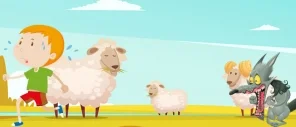
The Shepherd Boy and the Wolf
A Shepherd Boy tended his master’s Sheep near a dark forest not far from the village. Soon he […]

The Pig and The Sheep
One day a shepherd discovered a fat Pig in the meadow where his Sheep were pastured. He very […]

The Man and the Lion
A Lion and a Man chanced to travel in a company through the forest. They soon began to […]

Wealth without a Value
A Miser had buried his gold in a secret place in his garden. Every day he went to […]

The Wolf and the Crane
A Wolf had been feasting too greedily, and a bone had stuck crosswise in his throat. He could […]

The Woodcutter and the Axe
Long ago, there lived a woodcutter in a small village. He was sincere in his work and very […]
- Next →
Sponsored Links
- Privacy Policy
- Submit Story
- Terms & Conditions
- Grades 6-12
- School Leaders
FREE Poetry Worksheet Bundle! Perfect for National Poetry Month.
50 Irresistible Short Stories for Kids (Read Them All for Free!)
Quick reads with lasting impact.
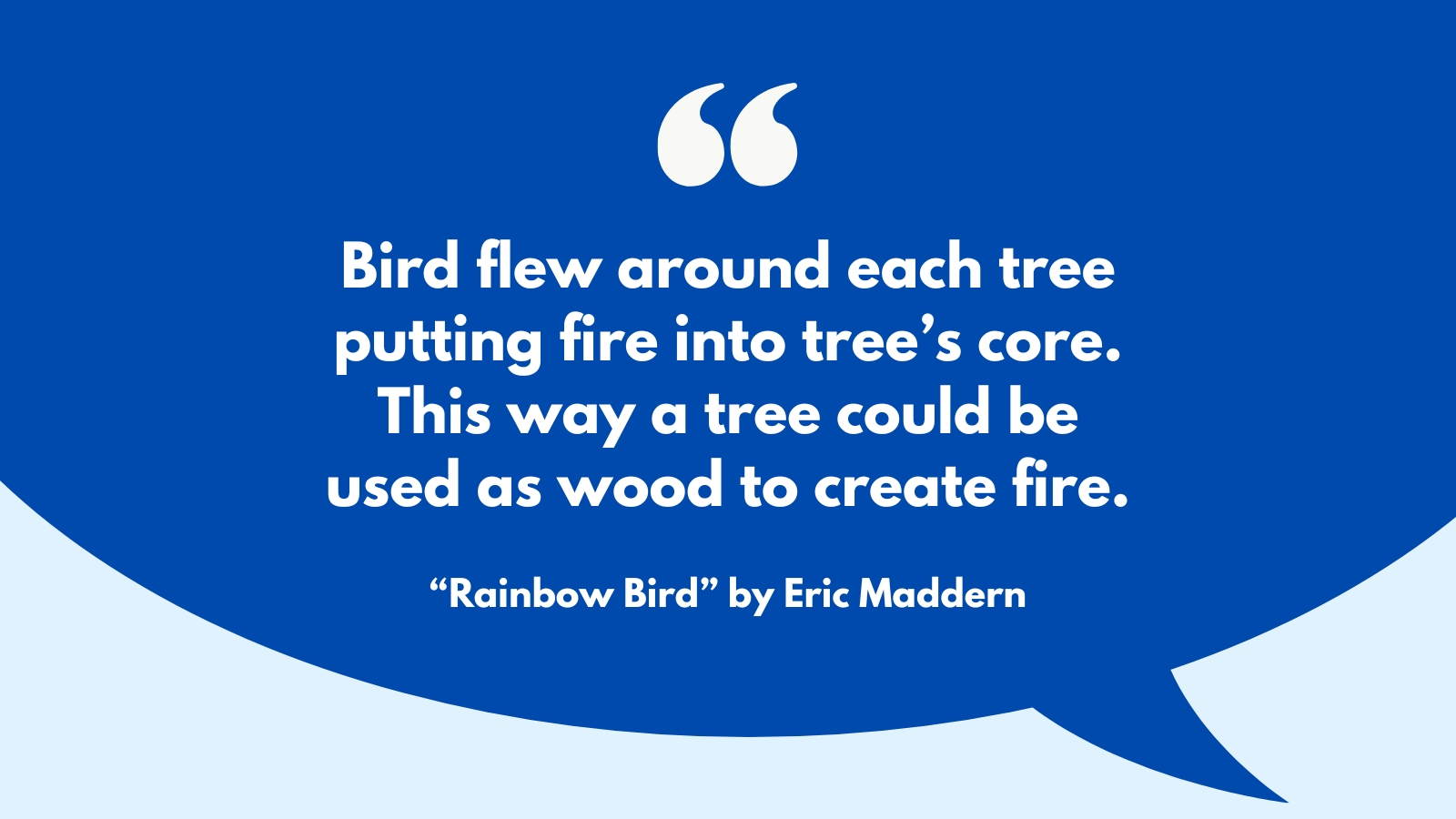
Looking for some free tales to use for close reading or classroom read-alouds? This roundup of short stories for kids has plenty of options. From quick fables with morals to old-fashioned fairy tales and folktales from around the world, this diverse collection offers something for any child. We’ve also included ways to use these short stories with kids, in the classroom or at home.
Note: Always be sure to read a selection through before sharing it with children. Some of these short stories for kids, especially ones written a long time ago, may not be appropriate for every audience.
Classic Fairy Tale Short Stories for Kids
“ cinderella ” by charles perrault, “‘do not cry, cinderella,’ she said; ‘you also shall go to the ball, because you are a kind, good girl.'”.
Why I love it: This is one of those short stories for kids that everyone probably already knows. This older version is a little different than the Disney movie, so ask kids if they can identify the changes. They can also have fun imagining what other items could be transformed to help Cinderella get to the ball!
“ The Emperor’s New Clothes ” by Hans Christian Andersen
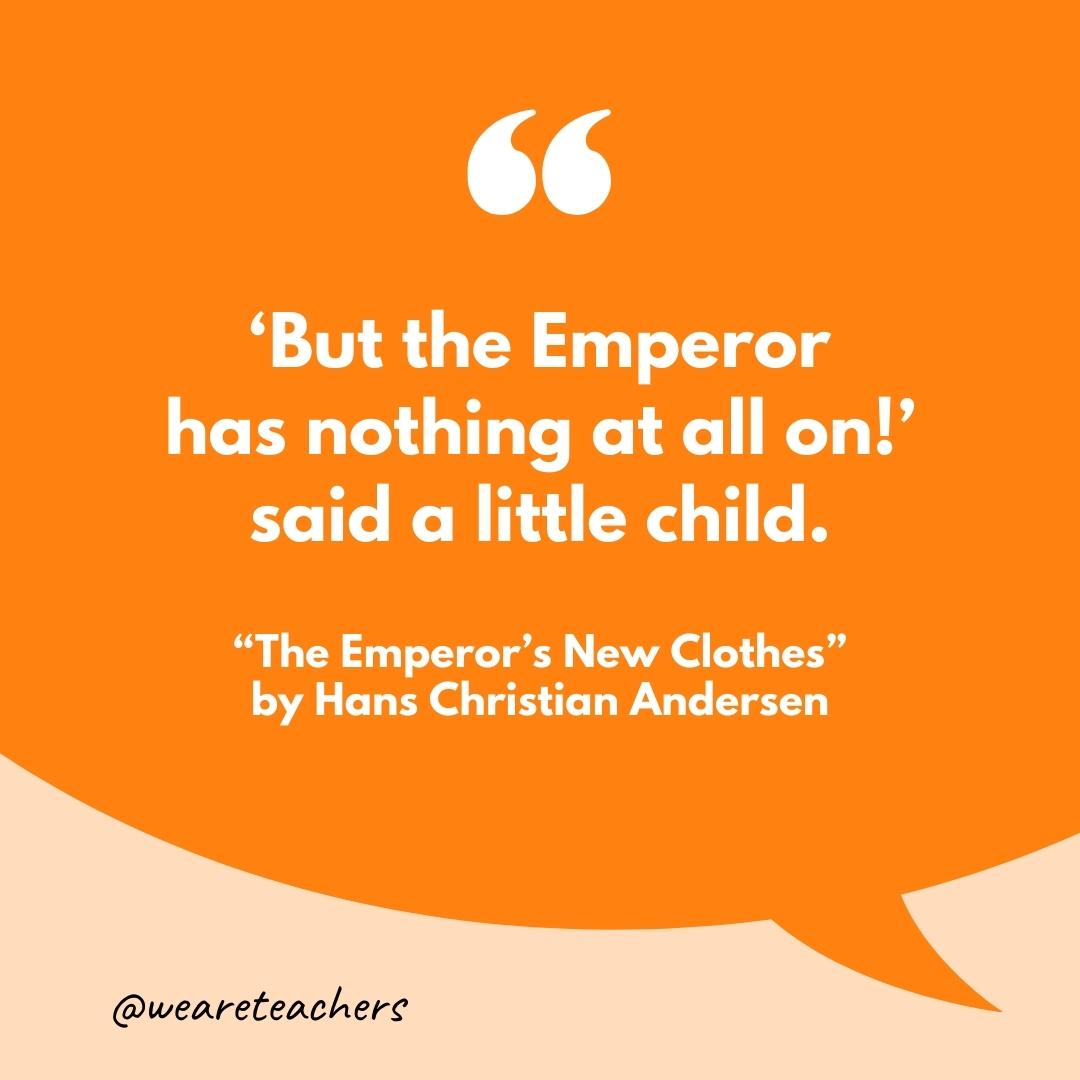
“‘But the Emperor has nothing at all on!’ said a little child.”
Why I love it: This is a wonderful story for talking about peer pressure and being brave enough to stand up for what you believe in. Kids will also enjoy drawing the imaginary suit of clothes that the king thought he saw.
“ The Frog Prince ” by the Brothers Grimm
“and the princess, though very unwilling, took him up in her hand, and put him upon the pillow of her own bed, where he slept all night long. as soon as it was light, he jumped up, hopped downstairs, and went out of the house. ‘now, then,’ thought the princess, ‘at last he is gone, and i shall be troubled with him no more.'”.
Why I love it: Kids love this familiar story about a prince in disguise and a young girl who keeps her word even though she doesn’t want to. In this version, the girl doesn’t need to kiss the frog, but she’s rewarded anyway.
“ The Gingerbread Man ” by Anonymous
“run, run as fast as you can you can’t catch me, i’m the gingerbread man”.
Why I love it: In the original tale, the Gingerbread Man is eventually caught and eaten. This retelling gives him a happy ending instead. For a fun activity, let kids decorate and eat their own gingerbread people.
“ Jack and the Beanstalk ” by Anonymous
“why, the beans his mother had thrown out of the window into the garden had sprung up into a giant beanstalk which went up and up and up until it reached the sky. so the man spoke truth after all”.
Why I love it: This story is a fun read, but use it to get your students thinking critically. Was it really OK for Jack to steal from the giant? Ask them to write an essay sharing their thoughts on the subject, or use it for a fun classroom debate.
“ Little Red Riding Hood ” by the Brothers Grimm
“‘but grandmother what big eyes you have,’ said little red riding hood. ‘the better to see you with, my dear,’ replied the wolf.”.
Why I love it: This retelling of the well-known tale is a little less gruesome, since the hunter merely frightens the wolf into spitting out poor granny (instead of slicing open his belly). Talk with kids about ways they can keep themselves safe when they’re out in the world.
“ The Pied Piper of Hamelin ” by the Brothers Grimm
“he sounded his fife in the streets, but this time it wasn’t rats and mice that came to him, but rather children: a great number of boys and girls from their fourth year on. among them was the mayor’s grown daughter. the swarm followed him, and he led them into a mountain, where he disappeared with them.”.
Why I love it: Some say this is a true story, and whether or not that’s true, it definitely has a moral—when people make a bargain, they should stick to their agreement. Ask kids to think about what kind of music the Pied Piper might have played, and why both children and rats couldn’t resist it.
“ The Princess and the Pea ” by Hans Christian Andersen
“i cannot think what could have been in the bed. i lay upon something so hard that i am quite black and blue all over.”.
Why I love it: This has long been one of the most beloved short stories for kids, and it’s ideal when you need a quick read. Then, grab some dried peas and see how thick a covering needs to be before students can no longer feel them.
“ Puss in Boots ” by Charles Perrault
“puss became a great lord, and never ran after mice anymore, except for pleasure.”.
Why I love it: All cat lovers know these animals can be pretty smart when they want to be. This one helps his poor master become a prince in a castle, all through his own clever tricks. Encourage students to come up with more creative ways Puss in Boots could help his master.
“ Rumpelstiltskin ” by the Brothers Grimm
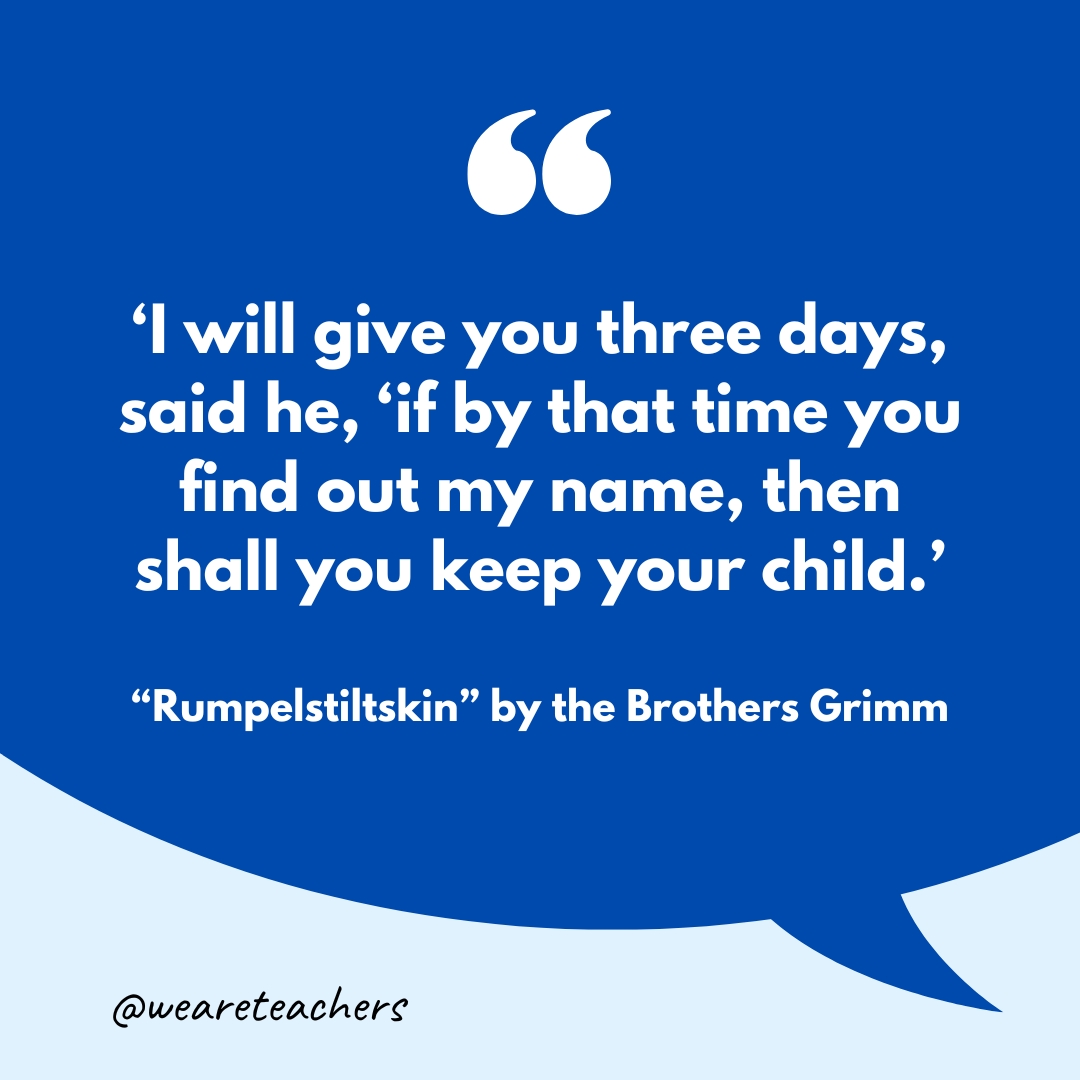
“‘I will give you three days,’ said he, ‘if by that time you find out my name, then shall you keep your child.'”
Why I love it: Pretty much everyone in this story behaves badly in one way or another. Use it to learn more about characters and their motivation.
“ Sleeping Beauty ” by the Brothers Grimm
“a great many changes take place in a hundred years.”.
Why I love it: After students read this well-known story, ask them to think about what it would be like to go to sleep today and wake up in a hundred years. What might the world be like? Or what would it be like for someone who fell asleep a hundred years ago to wake up today? How many things have changed since then?
“ Snow White ” by the Brothers Grimm
“mirror, mirror on the wall, who’s the fairest of them all”.
Why I love it: This fairy tale has all the classic elements—beautiful heroine, wicked stepmother, handsome prince—plus a handful of helpful dwarves. It’s the perfect way to start a conversation about the dangers of envy and jealousy.
“ The Three Little Pigs ” by Anonymous
“not by the hairs on our chinny chin chin”.
Why I love it: Fairy tales don’t get much more classic than this. Follow it up with a reading of The True Story of the Three Little Pigs by Jon Sciesczka to hear the story from the wolf’s perspective, and have a conversation about point of view.
“ The Ugly Duckling ” by Hans Christian Andersen
“but what did he see there, mirrored in the clear stream he beheld his own image, and it was no longer the reflection of a clumsy, dirty, gray bird, ugly and offensive. he himself was a swan being born in a duck yard does not matter, if only you are hatched from a swan’s egg.”.
Why I love it: Whether you read the original text or a shorter adaptation, this story is one every kid should know. It will teach them that everyone should be proud of who they are, even if they don’t look or feel like everyone else.
Aesop’s Fables as Short Stories for Kids
“ the boy who cried wolf ” by aesop, “so now, though he had not seen anything that even looked like a wolf, he ran toward the village shouting at the top of his voice, ‘wolf wolf'”.
Why I love it: This might be the most famous short story we use to teach kids about how important it is to tell the truth. Ask students if they’ve ever pulled a prank that went wrong, and what they learned from it.
“ The Crow and the Pitcher ” by Aesop
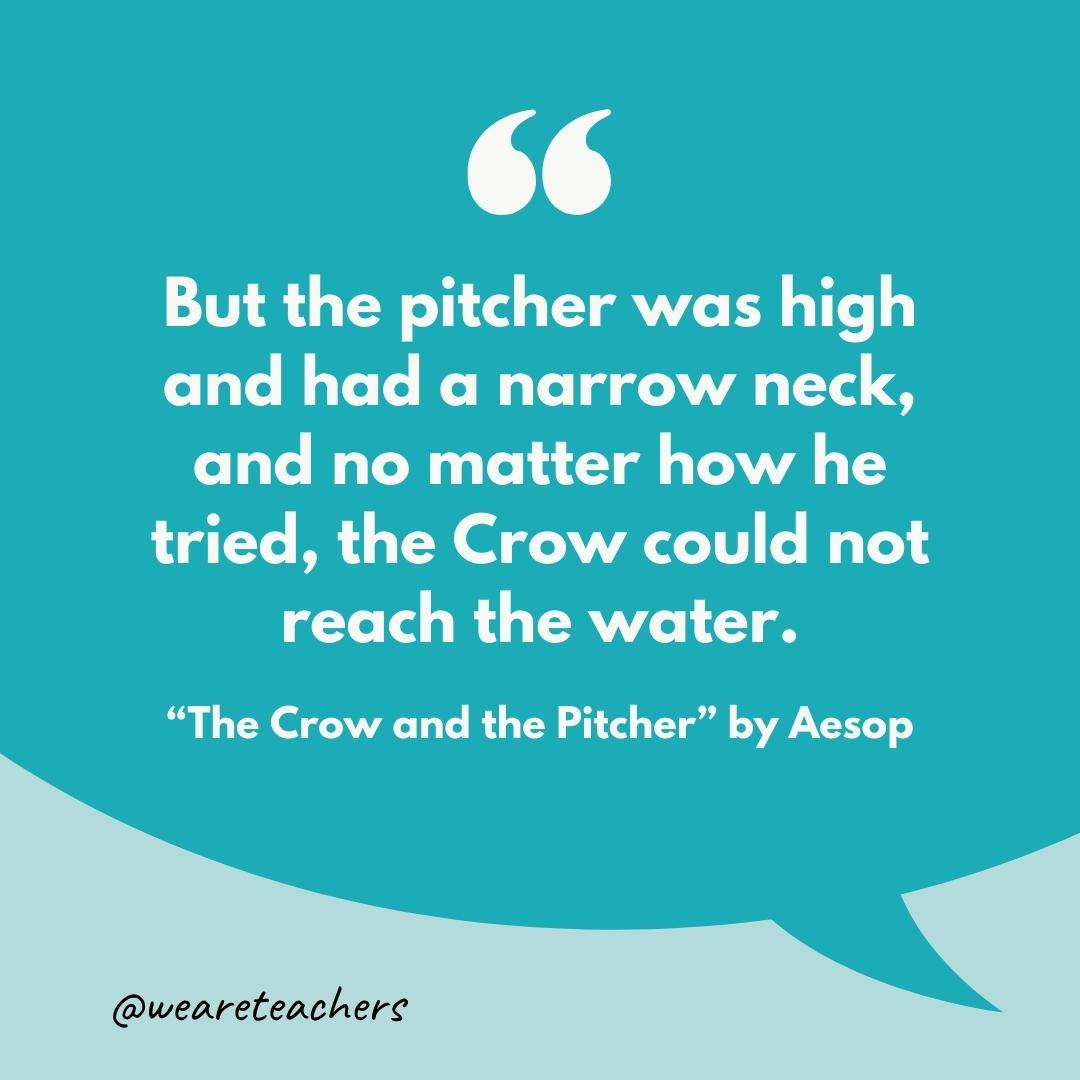
“But the pitcher was high and had a narrow neck, and no matter how he tried, the Crow could not reach the water.”
Why I love it: Aesop’s fable reads more like a STEM challenge—how can you reach the water at the bottom of the pitcher when your neck isn’t long enough? Try the same experiment with your students, using a narrow-necked bottle. Can they come up with any other solutions?
“ The Fox and the Grapes ” by Aesop
“the grapes seemed ready to burst with juice, and the fox’s mouth watered as he gazed longingly at them.”.
Why I love it: If kids have ever wondered where the phrase “sour grapes” comes from, this tale will answer that question. Talk about other idiomatic phrases, and do some research to find their origins.
“ The Lion and the Mouse ” by Aesop
“‘you laughed when i said i would repay you,’ said the mouse. ‘now you see that even a mouse can help a lion.'”.
Why I love it: This fable reminds kids that they’re never too small to make a difference in someone’s life. Ask kids to share their own stories of times they helped someone.
“ The Tortoise and the Hare ” by Aesop
“the hare was soon far out of sight, and to make the tortoise feel very deeply how ridiculous it was for him to try a race with a hare, he lay down beside the course to take a nap until the tortoise should catch up.”.
Why I love it: When kids need a reminder that they should always keep trying, turn to this famous story. Use it to teach growth mindset too.
“ Two Travelers and a Bear ” by Aesop
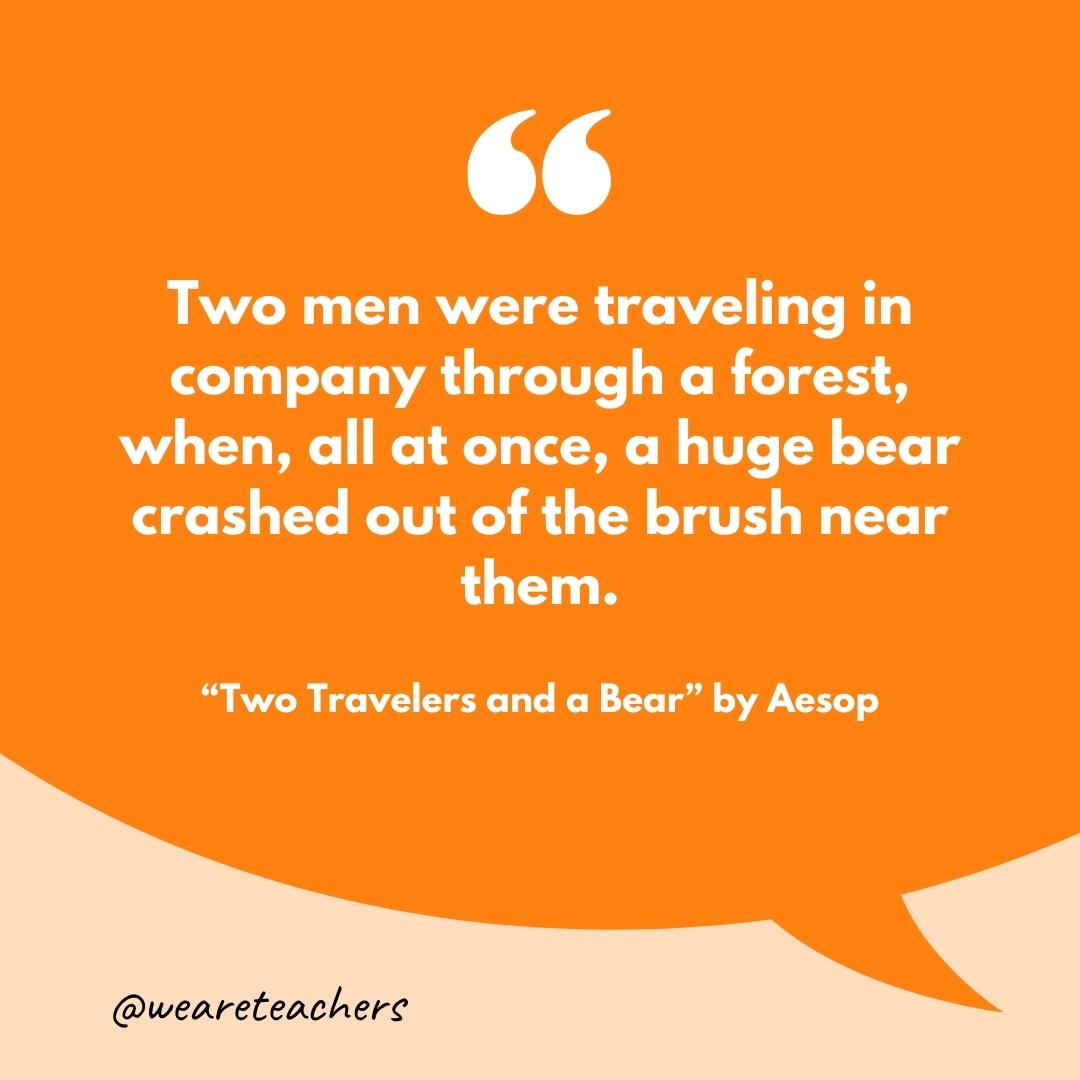
“Two men were traveling in company through a forest, when, all at once, a huge bear crashed out of the brush near them.”
Why I love it: When danger strikes, do you worry about yourself first or try to help everyone to safety? There are arguments to be made on both sides, so this one makes for an interesting debate or persuasive essay.
More Short Stories for Kids
“ anansi and the pot of wisdom ” by anonymous, “every time anansi looked in the clay pot, he learned something new.”.
Why I love it: Kids may know about Anansi from the popular book Anansi the Spider , but there are lots of tales about him in West African folklore. In this one, Anansi thinks he knows everything, but a child has something new to teach him. Explore more Anansi tales here.
“ The Apple Dumpling ” by Anonymous
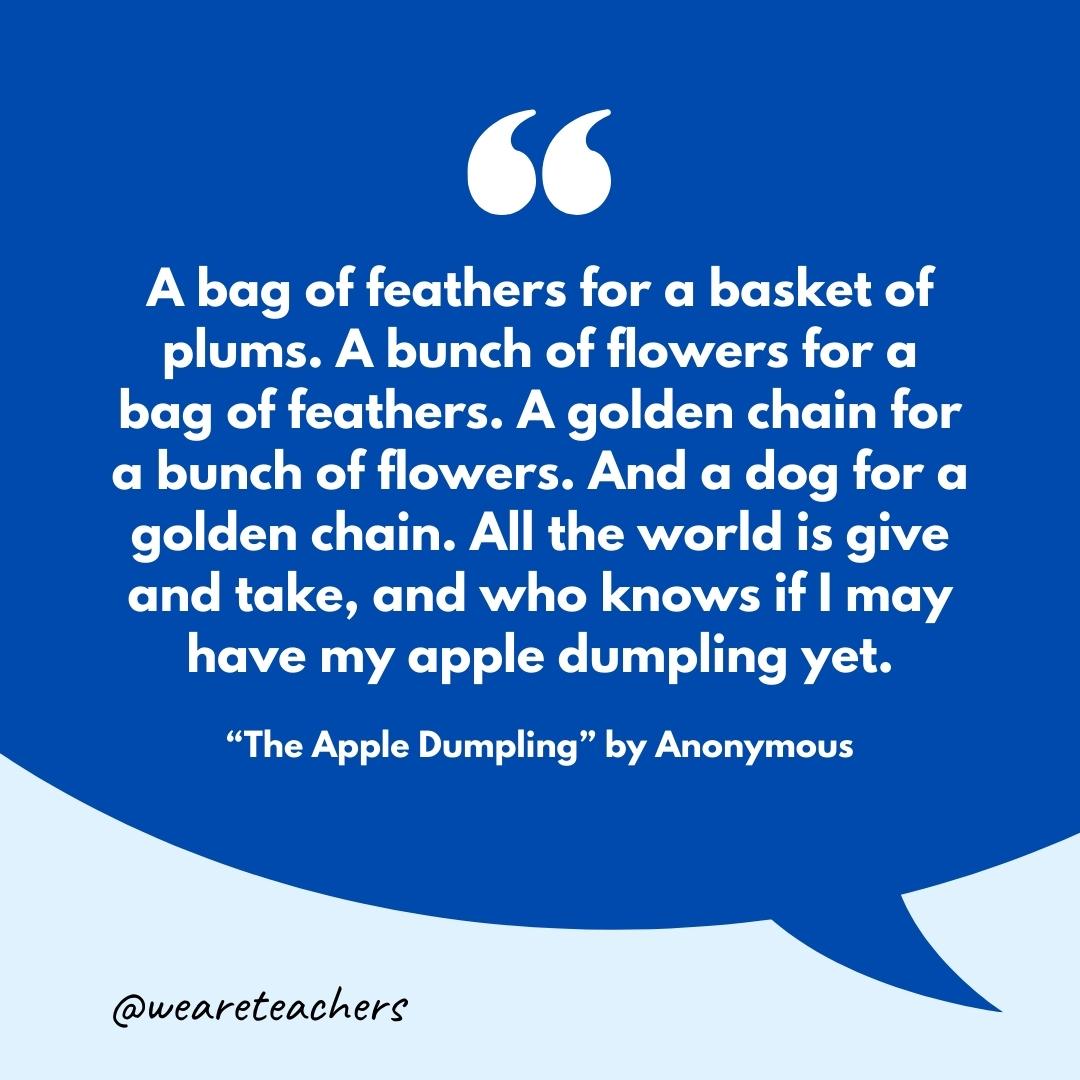
“A bag of feathers for a basket of plums. A bunch of flowers for a bag of feathers. A golden chain for a bunch of flowers. And a dog for a golden chain. All the world is give and take, and who knows if I may have my apple dumpling yet.”
Why I love it: When an old woman sets out to trade her basket of plums for some apples, her quest takes a few twists and turns along the way. In the end, though, she manages to make many people happy, not just herself. Practice sequencing by having kids try to remember all the trades the woman makes, and the order she makes them in.
“ The Blind Men and the Elephant ” by Anonymous
“sixth blind man (feeling the tail): this elephant is not like a wall, or a spear, or a snake, or a tree, or a fan. he is exactly like a rope.”.
Why I love it: Six blind men each feel a different part of an elephant, and each comes to his own very different conclusions. Written as a very short play, this classic tale opens up all sorts of discussion opportunities about seeing the bigger picture.
“ Bruce and the Spider ” by James Baldwin
“but the spider did not lose hope with the sixth failure. with still more care, she made ready to try for the seventh time. bruce almost forgot his own troubles as he watched her swing herself out upon the slender line. would she fail again no the thread was carried safely to the beam, and fastened there.”.
Why I love it: This famous little tale is almost certainly a myth, but it’s one of the most well-known stories about King Robert the Bruce. The lesson about not giving up fits perfectly when you’re talking about growth mindset.
“ The Elephant’s Child ” by Rudyard Kipling
“but there was one elephant—a new elephant—an elephant’s child—who was full of ’satiable curiosity, and that means he asked ever so many questions.”.
Why I love it: Many kids will recognize themselves in the Elephant’s Child and his (in)satiable curiosity. After you read this one, have students come up with stories for the way other animals got their unique features. How did the giraffe get its long neck? How did the turtle get its shell? So many possibilities!
“ Paul Bunyan ” by William B. Laughead
“when paul was a boy, he was fast as lightning. he could blow out a candle at night and hop into bed before it was dark.”.
Why I love it: Paul Bunyan is an American folk hero, larger than life (literally!). This roundup of the legends surrounding him has many of the most famous tales. Encourage kids to think about what they’d do if they were as big, strong, and fast as Paul.
“ The Empty Pot ” by Anonymous
“in six months, the boy who grew the best plant would be the one to win the contest. he would be the next to sit on the throne.”.
Why I love it: This story can teach kids a lesson about honesty, but it’s also got a STEM project built right in. The emperor’s royal seeds wouldn’t grow because they’d been cooked first. Have kids try their own experiment to see if they can get peas that have been cooked to sprout!
“ The Little Engine That Could ” by Watty Piper

“I think I can. I think I can.”
Why I love it: When little ones learn early on to believe in themselves, they’ll be willing to try their best at anything. Have kids tell their own stories of times they did something that seemed impossible at first when they kept on trying.
“ Fifty-Cent Piece ” by S.E. Schlosser
“as he caught her, the husband looked into the ruin and saw a burnt table with a shiny fifty-cent piece lying in the center.”.
Why I love it: A spooky story that isn’t too gory, this one’s a perfect read in the season leading up to Halloween. Challenge kids to write their own ghost stories next.
“ The Four Dragons ” by Anonymous
“the four dragons flew back and forth, making the sky dark all around. before long the sea water became rain pouring down from the sky.”.
Why I love it: The four dragons in this Chinese tale want to help save the people from drought. When the Jade Emperor won’t help, they take matters into their own hands. Ultimately, they become the four major rivers of China. This is a great opportunity to get out the globe or pull up Google Earth and learn more about China’s geography.
“ Goldilocks and the FOUR Bears ” by Andrea Kaczmarek
“nobody ever talks about me. i don’t know why, because i am the most important bear in the story. i am grandma growl, but everybody calls me granny g, and i am the best porridge maker in the world.”.
Why I love it: Hear the classic tale from a new perspective, told by a character you never even knew existed! Use this as inspiration to have kids add a character to their own favorite tales, and tell the story from their point of view.
“ Haunted ” by Harris Tobias
“‘just because a house is haunted,’ he said, ‘doesn’t mean you can’t live there. the trick is making friends with the ghosts, learning to get along with them.'”.
Why I love it: Need a not-so-spooky story for Halloween? This tale of ghosts who love to bake fits the bill. Kids can write their own stories of making friends with ghosts instead of being scared of them.
“ Henny Penny ” by Anonymous
“so henny-penny, cocky-locky, ducky-daddles, goosey-poosey and turkey-lurkey all went to tell the king the sky was a-falling.”.
Why I love it: In an age when people are quick to spread rumors as fact, this old European folktale is more meaningful than ever. See if kids can think of times when they heard a crazy rumor that they believed at first, even though it turned out to be completely false.
“ How Gimme the Ax Found Out About the Zigzag Railroad ” by Carl Sandburg

“Then the zizzies came. The zizzy is a bug. He runs zigzag on zigzag legs, eats zigzag with zigzag teeth, and spits zigzag with a zigzag tongue.”
Why I love it: Kids will get a kick out of all the Z sounds in this silly little story about why some local railroad tracks run in zigzags. Use it to teach about alliteration and consonance, and ask kids to draw their own pictures of the zizzies.
“ King Midas and the Golden Touch ” by Anonymous
“suddenly, he started to sense fear. tears filled his eyes and that moment, his beloved daughter entered the room. when midas hugged her, she turned into a golden statue”.
Why I love it: Teach kids to be careful what they wish for. Ask them to make a list of wishes, then talk about ways each of them could ultimately go wrong. Have them write their own version of this short story.
“ The Kite That Went to the Moon ” by Evelyn Sharp
“‘i have everything in the world in my bag,’ replied the little old man, ‘for everything is there that everybody wants. i have laughter and tears and happiness and sadness; i can give you riches or poverty, sense or nonsense; here is a way to discover the things that you don’t know, and a way to forget the things that you do know.'”.
Why I love this: This whimsical tale takes two small children on a voyage to the moon and back, as they follow an enchanted kite. Pair it with a crafting session where kids make their own kites to fly.
“ The Monkey and the Turtle ” by José Rizal
“a monkey and a turtle found a banana tree on a river. they fished it out and because each wanted the tree for himself, they cut it in half.”.
Why I love it: A monkey and a turtle each plant half a banana tree, but only the turtle’s grows. The monkey offers to harvest the fruit but keeps it all for himself. But the turtle has plans of his own! This folktale from the Philippines is actually an allegory about the Spanish colonizers’ treatment of the Filipino people.
“ Mouse! ” by Michał Przywara
“‘what’ i wonder. ‘how dare you what insolence is this’ such a cheeky little mouse defying me in my own house, i simply cannot stomach this at all.”.
Why I love it: This clever little story is told using a triangular number sequence that dictates the number of words per line. Challenge students to write their own tales using a pattern or sequence of some kind.
“ The Proud Rose ” by Anonymous
“once upon a time, there lived a proud rose that was incredibly proud of her beautiful looks. the only disappointment it had was that it grew beside an ugly cactus.”.
Why I love it: It’s hard to imagine a flower being a bully, but that’s exactly what happens in this story. Fortunately, the cactus doesn’t let the rose stop it from being kind.
“ The Sword in the Stone ” by T.H. White
“whoever pulls out this sword from this stone is the true king of england”.
Why I love it: This quick retelling of the familiar tale covers all the high points. Follow it with more of the Arthurian legends or a viewing of the classic Disney film.
“ The Tale of Peter Rabbit ” by Beatrix Potter
“‘now, my dears,’ said old mrs. rabbit one morning, ‘you may go into the fields or down the lane, but don’t go into mr. mcgregor’s garden: your father had an accident there; he was put in a pie by mrs. mcgregor.'”.
Why I love it: Beatrix Potter’s sweet tales are beloved, but this is the one that has really endured. Pair it with one of these terrific Peter Rabbit activities.
“ The Pumpkin in the Jar ” by Anonymous
“the soldier’s orders were to tell the maiden that the jar was from the king, and that she was to put an entire pumpkin inside the jar. the soldier was also to tell the maiden that she should not break the jar under any circumstance. both the jar with the small opening at the top and the pumpkin must remain whole.”.
Why I love it: Before you read the end of the story, stop and ask kids if they can figure out how the maiden managed to get a pumpkin into a jar without breaking it. See how fast they can come up with the right answer!
“ Rainbow Bird ” by Eric Maddern
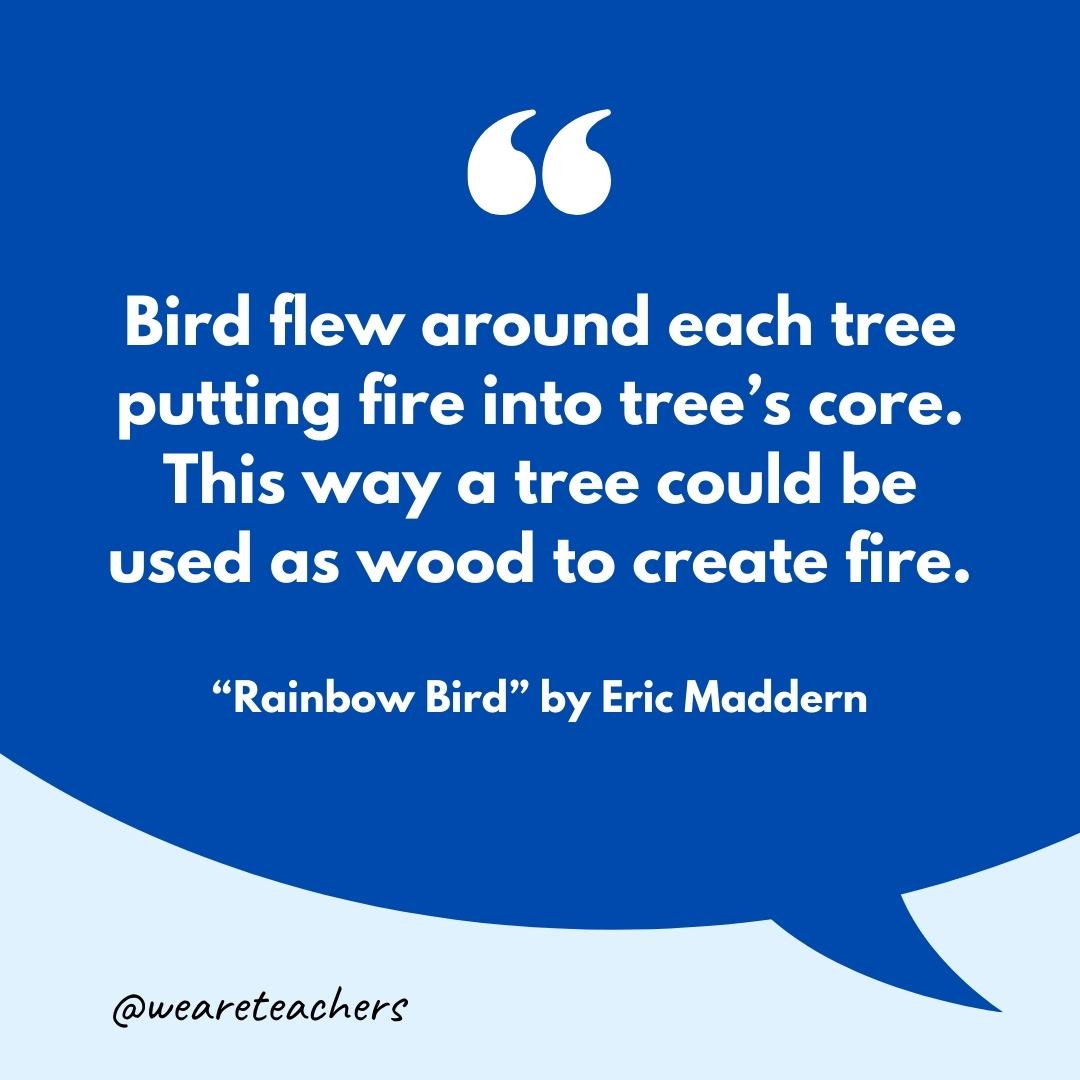
“Bird flew around each tree putting fire into tree’s core. This way a tree could be used as wood to create fire.”
Why I love it: Learn the Australian Aboriginal legend about a greedy crocodile who wouldn’t share his fire, and the Rainbow Bird who outsmarted him. Look up the Aboriginal Dreamtime and learn more about their art and culture.
“ Rikki-Tikki-Tavi ” by Rudyard Kipling
“rikki-tikki did not care to follow them, for he did not feel sure that he could manage two snakes at once. so he trotted off to the gravel path near the house, and sat down to think. it was a serious matter for him.”.
Why I love it: Reading this story is like watching a nature documentary unfold on the page. Have kids do some research on the mongoose and its relationship with cobras in real life.
“ Stone Soup ” by Anonymous
“he pulled a big black cooking pot from his wagon. he filled it with water and built a fire under it. then, he reached slowly into his knapsack and, while several villagers watched, he pulled a plain gray stone from a cloth bag and dropped it into the water.”.
Why I love it: Want to teach kids to work together and share? This is the short story you need. Ask kids what they’d bring to put in the pot of soup themselves.
“ The Story of the Chinese Zodiac ” by Anonymous
“he reached out his paws and pushed his friend the cat into the river. the cat was swept away by the whirling waters. that is why there is no cat in the chinese calendar.”.
Why I love it: This short little tale manages to answer two questions—why there’s no Year of the Cat and why cats and rats can’t be friends. After reading it, try to imagine how the other animals in the calendar managed to win their spots.
“ The Velveteen Rabbit ” by Margery Williams
“‘real isn’t how you are made,’ said the skin horse. ‘it’s a thing that happens to you. when a child loves you for a long, long time, not just to play with, but really loves you, then you become real.'”.
Why I love it: This is one of the most classic short stories for kids of all time! Let kids bring their own favorite toys to share with the class, and have them write or tell stories about what would happen if they became “real.”
“ Weighing the Elephant ” by Anonymous
“‘very well,’ said the emperor with a smile. ‘tell me how to weigh the elephant.'”.
Why I love it: Read this traditional Chinese tale right up to the point where the young boy reveals his idea for weighing an elephant without a giant scale. Ask kids if they can come up with the solution before continuing to the end of the story. You can even try out the correct method as a STEM challenge.
“ Why the Koala Has a Stumpy Tail ” by Mitch Weiss
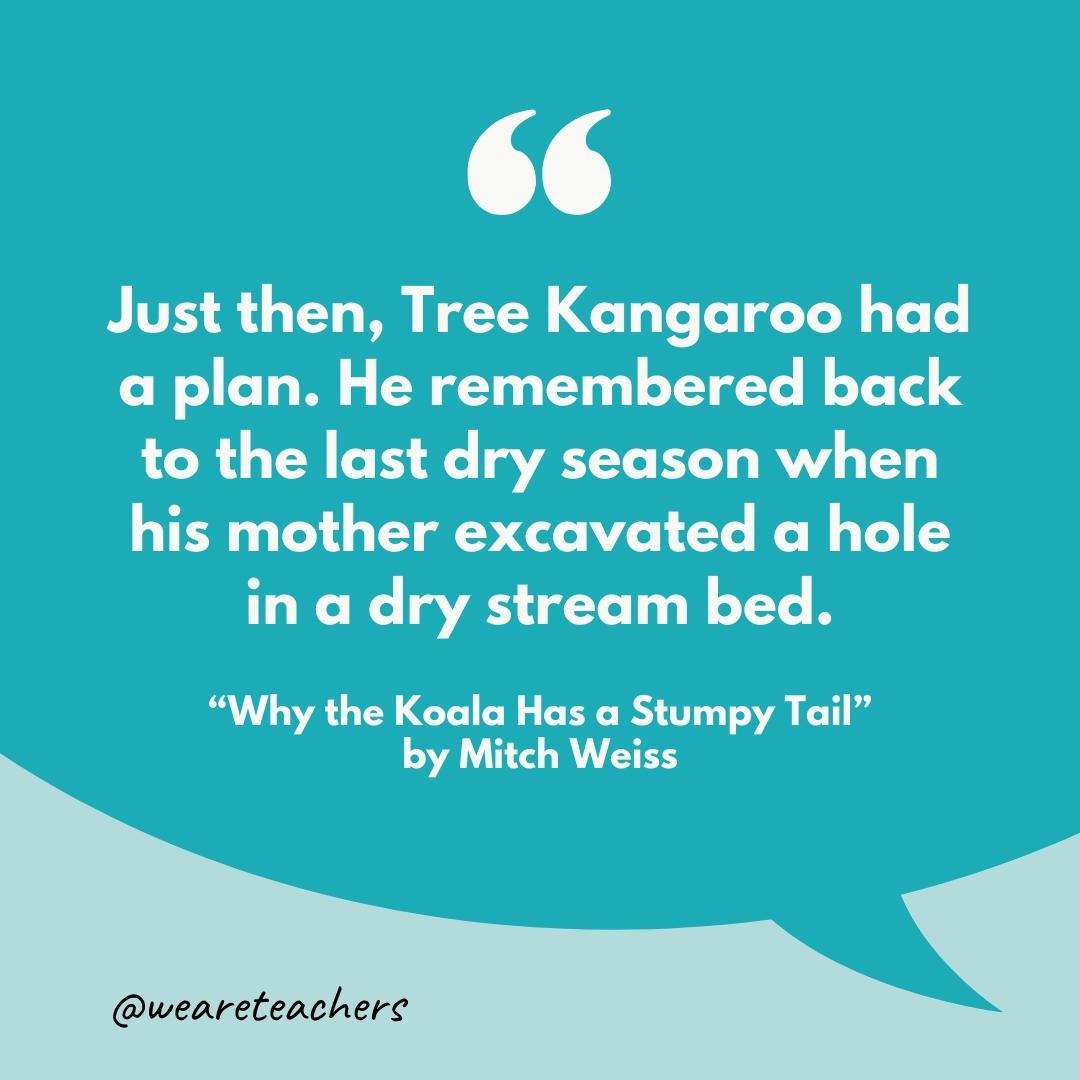
“Just then, Tree Kangaroo had a plan. He remembered back to the last dry season when his mother excavated a hole in a dry stream bed.”
Why I love it: Look up pictures of the tree kangaroo and koala, then read this Aboriginal legend explaining why the koala’s tail is so much shorter. What other unique Australian animals can kids learn about and share with the class?
“ Winnie-the-Pooh Goes Visiting ” by A.A. Milne
“pooh always liked a little something at eleven o’clock in the morning, and he was very glad to see rabbit getting out the plates and mugs; and when rabbit said, ‘honey or condensed milk with your bread’ he was so excited that he said, ‘both,’ and then, so as not to seem greedy, he added, ‘but don’t bother about the bread, please.'”.
Why I love it: This silly old bear has been delighting children for decades, and there are dozens of short stories for kids about him and his friends. This one has a little built-in moral about greed. You can also ask kids to brainstorm their own ways to get Pooh free from Rabbit’s front door.
Looking for more short stories for kids? Check out this roundup geared toward the middle school crowd.
Plus, sign up for our free newsletters to get all the latest teaching news and ideas, straight to your inbox.

You Might Also Like

75 Best Short Stories To Teach in Middle School
When attention spans are short, these do the trick! Continue Reading
Copyright © 2023. All rights reserved. 5335 Gate Parkway, Jacksonville, FL 32256
10 Lines Short Stories With Moral Lessons for Kids
Moral Lessons , Most Popular

Published December 1, 2023
When trying to impart an important moral lesson to kids, short stories are often the go-to for most parents. It not only tickles their imagination, but it also teaches them about life.
Short stories have a way of teaching lessons that makes them more relatable and exciting. Rather than telling your kid not to lie, relating a short story helps them understand what happens when they lie. It helps them become more aware of their actions and their consequences. The moral lessons from these stories also help shape their character and moral compass as they grow old.
Here are 10 short stories with moral lessons that your kids (and even some adults) will learn a thing or two from:
1. The Hare and the Tortoise

There was once a hare who was friends with a tortoise. One day, he challenged the tortoise to a race. Seeing how slow the tortoise was going, the hare thought he’d win this easily. So, he took a nap while the tortoise kept on going. When the hare woke, he saw that the tortoise was already at the finish line. Much to his chagrin, the tortoise won the race while he was busy sleeping.
Moral of the story:
There are a couple of moral lessons we can learn from this story. The hare teaches that overconfidence can sometimes ruin you. While the tortoise teaches us about the power of perseverance. Even if all the odds are stacked against you, never give up. Sometimes, life is not about who’s the fastest or the strongest; it’s about who is the most consistent.
2. The Dog and the Bone

Once, there was a dog who wandered the streets night and day in search of food. One day, he found a big juicy bone, and he immediately grabbed it in his mouth and took it home. On his way home, he crossed a river and saw another dog with a bone in its mouth. He wanted that bone for himself, too. But as he opened his mouth, the bone he was biting fell into the river and sank. That night, he went home hungry.
If we always envy others, we’ll lose what we already have, just like the greedy dog.
3. The Thirsty Crow

After flying a long distance, a thirsty crow wandered the forest searching for water. Finally, he saw a pot half-filled with water. He tried to drink from it, but his beak wasn’t long enough to reach the water inside. He then saw pebbles on the ground, and one by one, he put them in the pot until the water rose to the brim. The crow then hastily drank from it and quenched his thirst.
If there’s a will, there’s a way. Every problem has a solution if we look hard and don’t give up.
4. Lazy John
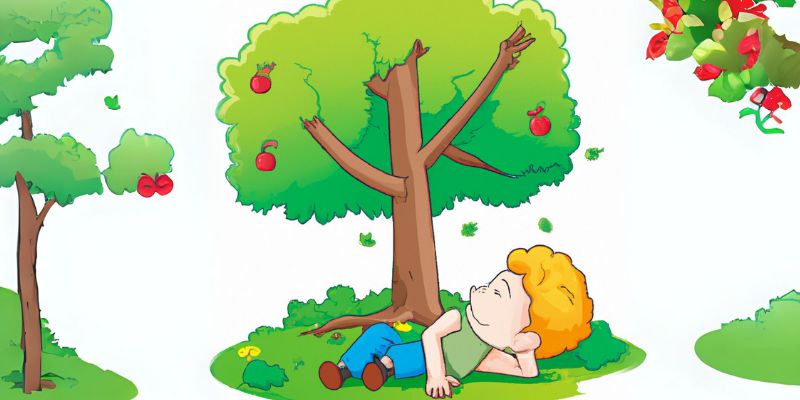
There was a boy named John who was so lazy he couldn’t even change his clothes. One day, he saw the apple tree in their yard was full of fruits. He wanted to eat some apples, but he was too lazy to climb the tree and take the fruits. So he lay down underneath the tree and waited for the fruits to fall off. John waited until he was starving, but the apples never fell.
Laziness can get you nowhere. If you want something, you need to work hard for it.
5. The Fox and The Grapes

Once, there was a hungry fox who stumbled upon a vineyard. After seeing the round, juicy grapes hanging in a bunch, the fox drooled. But no matter how high he jumped, he couldn’t reach for it. So he told himself that it was probably sour and left. That night, he had to sleep on an empty stomach.
Moral of the Story:
Most of us tend to act like the fox. When we want something but think it’s too hard to attain, we make excuses. We tell ourselves that it’s probably not that great instead of working hard for it.
6. The Ant and The Grasshopper

The ant and the grasshopper were good friends. In the summer, the ant works hard to fill his storage with food. While the grasshopper was enjoying the fine weather and playing all day.
When winter came, the ant was lying cozily in his home, surrounded by the food he stored during the summer. While the grasshopper was in his home, hungry and freezing. He asked the ant for food, and the ant gave him some. But it wasn’t enough to last the entire winter. When he tried to ask the ant again, the latter replied: “I’m sorry my friend but my food is just enough for my family to last until the end of winter. If I give you more, we too will starve. We had the entire summer to prepare for the winter but you chose to play instead.”
Winter, in this story, represents a time in our lives when food and resources are scarce. Summer is that time when everything is abundant. So, if you have a lot right now, save some of it for the winter.
7. The Boy Who Cried Wolf
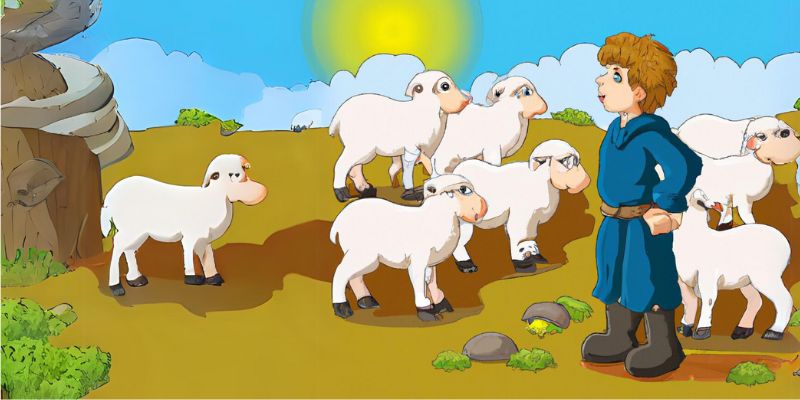
There was once a shepherd boy who liked to play tricks. One day, while he was watching over the herd, the boy decided to play a trick and cried, “wolf! wolf!”. The people who heard rushed over to help him. But they were disappointed when they saw no wolf, and the boy laughed at them. The next day, he did it again, and people rushed to his aid, only to be disappointed again.
On the third day, the boy saw a wolf devouring one of his sheep and cried for help. But the people who heard him thought this was just another of the boy’s pranks, so no one came to help him. That day, the boy lost some of his sheep to the wolf.
If you always lie and cheat on other people, there will come a time when no one will believe you anymore.
8. The Ugly Duckling

Most of us have probably heard of this story as it is one of the most famous fairy tales in the world. The story revolves around a duckling who, from the moment of his birth, has always felt different from his siblings. He was always picked on because he didn’t look like the rest of them.
One day, he had enough and ran away from the pond he grew up in. He wandered nearby, looking for a family who would accept him. Months passed, and seasons changed, but everywhere he went, nobody wanted him because he was such an ugly duck. Then, one day, he came upon a family of swans. Upon looking at them, he realized that during the months he spent looking for a family to call his own, he had grown into a beautiful swan. Now he finally understood why he never looked like the rest of his siblings because he wasn’t a duck but a swan.
We shouldn’t be too quick to judge others based on their physical appearance. Just because someone doesn’t fit societal definitions of beauty doesn’t mean they’re ugly. Each of us is beautiful in our unique way, and it’s time we accept and celebrate that individuality.
9. The Lion and the Poor Slave
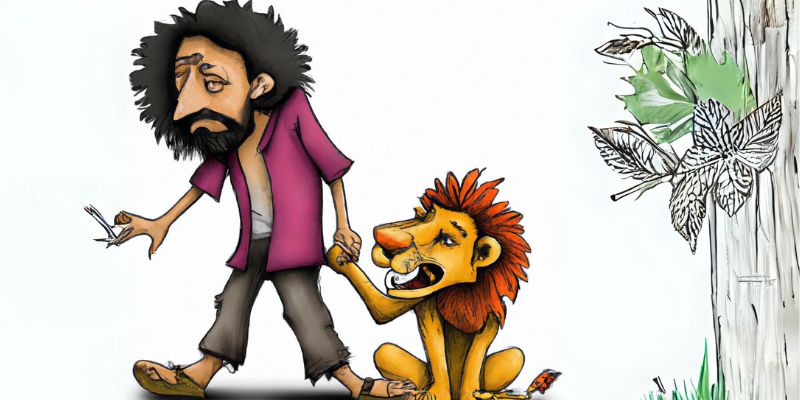
There was once a slave who was treated cruelly by his master. One day, he couldn’t take it anymore and ran to the forest to escape. There, he chanced upon a lion who couldn’t walk because of the thorn in its paw. Although scared, the slave mustered his courage and took out the thorn in the lion’s paw. When the lion was finally free of the thorn, he ran into the forest and didn’t harm the slave.
Sometime later, the slave was caught by his master along with some animals in the forest. The master then ordered the slave to be thrown into the lion’s den. When the slave saw the lion, he recognized it as the lion he helped in the forest. The slave was able to escape the den unharmed, and he freed all the other animals.
The good you did will always have a way of returning to you. So do good deeds and be kind to others, and the world will be kind to you.
10. The Elephant and the Ants
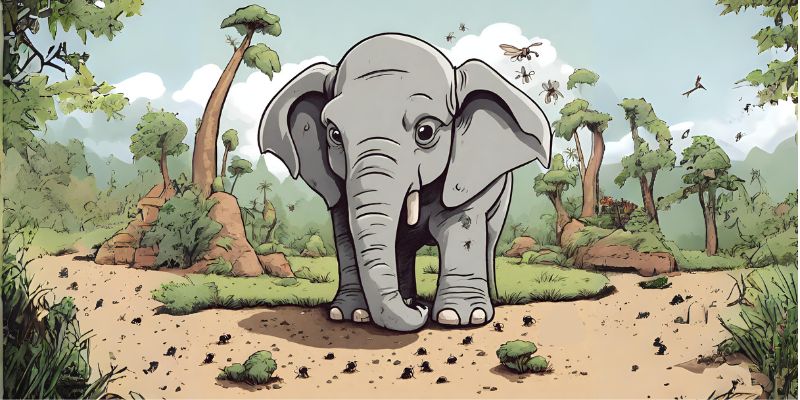
There was once a proud elephant who constantly bullied smaller animals. He would go to the anthill near his home and spray water at the ants. The ants, with their size, could do nothing but cry. The elephant just laughed and threatened the ants that he would crush them to death. One day, the ants had enough and decided to teach the elephant a lesson. They went straight into the elephant’s trunk and started biting him. The elephant could only howl in pain. He realized his mistake and apologized to the ants and all the animals he bullied.
Be humble and treat everyone with kindness. If you think you’re stronger than others, use your strength to protect them instead of harming them.
Donate To The Poor & Homeless Of South Florida
Our Father’s House Soup Kitchen has fed the poor and homeless in South Florida over 900,000 hot meals since 1993. Our tax deductible non profit organization also accepts and distributes donations such as clothing, toiletries, shoes, bicycles, and more. You can donate to help the poor and homeless through our website.

Reviewed For Factual Accuracy
Our team meticulously fact-checks all website content before publishing. Discover more about our website’s editorial standard here and the dedication we uphold.

About The Author
Judy Ponio is a professional writer and devoted Christian. She has a passion for writing about topics related to morality and helping the poor and homeless. She is the lead author for the Our Father’s House Soup Kitchen blog.
Correct Digital, Inc is paid by private donors to provide website digital marketing services to this non-profit organization.
Related Posts

Most Popular , Soup Kitchen
What are Youth Emergency Shelters?

Moral Lessons
7 Times Jesus Taught Us About Kindness

How to Show Empathy in 15 Simple Ways

501(c)(3) not for profit based in Pompano Beach, Florida USA
Helpful Links
Blog ✦ About ✦ Gallery ✦ Contact

© OFHSoupKitchen.org 2024
View Our Privacy Policy
Web Development by Correct Digital
Donate To Help The Poor & Homeless Of South Florida
Our Father’s House Soup Kitchen has served over 900,000 hot meals to those in need since 1989. Help us continue our mission to serve God’s precious poor with an online tax-deductible donation.

- Play & Activities
- Life Skills
- Learning & Education
- Play & Learning

- Growth & Development
- Rhymes & Songs
- Preschool Locator
Pinocchio Short Story With Moral For Kids
Origin And History Of Pinocchio
Story type of pinocchio, story characters, pinocchio story for children, story summary, the lesson your child will learn from this story, how can children apply the lesson of the story in their real life.
Since the beginning, fairy tales and folk tales have strongly influenced the thoughts of young and old minds alike. These well-known stories have been lovingly passed down through generations to teach children important lessons that will stay with them for life. Kindness, bravery, and acceptance are just some of the many principles in each story. ‘Pinocchio’ story in English is the perfect example of one such story that best expresses these moral values. Here’s the Pinocchio full story for children.
Pinocchio was created by the famous Italian author Carlo Collodi in 1883. It was initially produced as a weekly series in the children’s magazine Giornale per i bambini and rolled out for just four months from July 7 1881. However, when the series ended, the children loved it so much that they demanded more and Collodi gave in and wrote another year’s worth of the series. After this, he decided to publish the story of Pinocchio in the form of a single book.
Pinocchio is a fairy tale which also falls under the category of a folktale.
The following are the characters in the story:
Pinocchio – He is the main character who is made out of wood by Papa Geppetto.
Papa Geppetto – Papa Geppetto is a caring father who helps Pinocchio at every step and sacrifices everything for him.
Blue Fairy – The blue fairy is called so because of her blue hair. She is good to Pinocchio and helps him stay safe from every danger.
Cat and Fox – These two characters are cunning and befriend Pinocchio only to take his money.
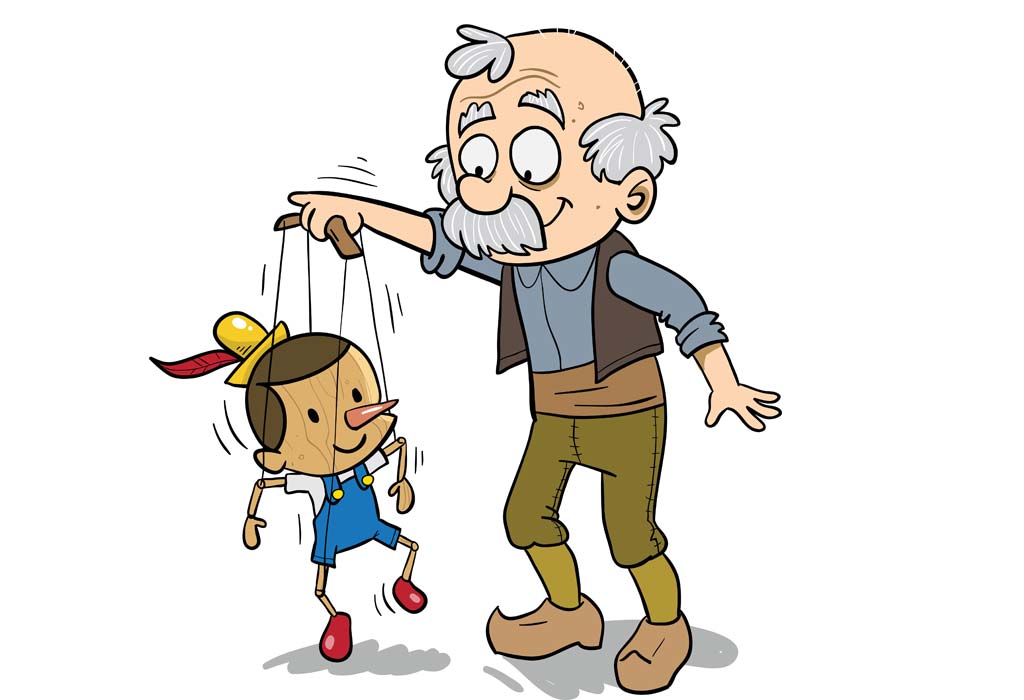
In a small village lived a craftsman Geppetto. One day he decided to make a wooden toy. He said to himself, “I will make a little boy and call him ‘Pinocchio’.” He searched everywhere for a good piece of wood. To his good luck, he came upon a piece of pinewood. After examining the wood, he began to carve it. He worked tirelessly for many hours, and finally, his hard work paid off. He carved a beautiful wooden puppet boy who he named Pinocchio. He said, “I wish Pinocchio were a real boy.”
The blue fairy heard Geppetto, decided to grant him his wish and made Pinocchio come to life!
As time flew, Pinocchio and Papa Geppetto grew fond of each other and started enjoying each other’s company. Pinocchio wished with all his heart to go to school. But sadly, Papa Geppetto did not have enough money to send him to school. So he sold his coat for some money. He then called Pinocchio over, gave him the money to buy some stationery and asked him to go straight to school and not roam around.
Pinocchio set out to go to school, but on his way, he saw a circus. He forgot Papa Geppetto’s warning and went to see the circus, where there was a huge crowd. Suddenly, he found himself locked up in a cage. He started to cry, and soon, the blue fairy came and helped release him from the cage. She warned him never to repeat the same mistake and to obey his father.
The next day, Pinocchio set out again for school. While crossing the forest on his way, he met a cat and a fox. Now the cat and the fox were extremely cunning. When they saw Pinocchio carrying money, they stopped him in his tracks and asked him where he was going. Pinocchio replied that he was going to buy some school stationery.
On hearing this, the fox convinced Pinocchio that the money he was carrying would not be sufficient to buy the stationery. The fox then suggested that Pinocchio give him the money, and he would plant it in a magical forest where the money would multiply. Poor little Pinocchio believed the fox’s lies. Over time, Pinocchio realised that he had been cheated as he didn’t find the money and started to cry.
Hearing his cries, the blue fairy again appeared and asked Pinocchio about the money. Pinocchio lied by making some excuses. While he continued lying, his nose grew longer and longer! The fairy realised that he was lying.
She asked, “Are you telling the truth, Pinocchio?” He replied, “Sorry, I was scared of being scolded”. The fairy warned him again and helped him by returning the money.
The next day, Pinocchio met the circus owner on his way to school. The circus owner was angry when he saw Pinocchio as he thought that Pinocchio had run away from the circus. To punish him, he threw Pinocchio into the deep blue sea, where a giant whale swallowed him.
Back home, Papa Geppetto grew anxious about Pinocchio as he hadn’t heard from him. He searched everywhere until a fisherman said that he saw a wooden puppet boy being thrown into the sea. Hearing this, Geppetto went to the sea and was immediately swallowed by the same giant whale.
When Papa Geppetto and Pinocchio saw each other, they ran and hugged each other and started crying. Pinocchio promised his father he would change, be better and obey him. Hearing them cry, the blue fairy that helped Pinocchio appeared again and rescued them from the whale’s stomach.
Pinocchio thanked the blue fairy and promised he would always listen to his father. The fairy was glad and granted him his wish to be a real human boy. From that day onwards, Papa Geppetto and Pinocchio lived happily ever after.
The summary of ‘Pinocchio’ is given below:
The story’s main character is a living wooden puppet crafted by a toy maker Geppetto who adopts him as his son. In the beginning, Pinocchio is disobedient. He ignores Papa Geppetto and runs away in search of adventure. The blue fairy guides Pinocchio at every step of the way and encourages him to change his ways. Eventually, when Pinocchio repents, the Blue Fairy transforms him into a real boy to reward him for his excellent behaviour.
Like every other folk tale, Pinocchio too has important lessons for children: e.g., being disobedient will do you no good, telling lies is never advisable, and never disobey your elders.
When Pinocchio shows himself as selfless, truthful, obedient, and brave, the blue fairy transforms him into a real boy. The lesson that children can learn from this is that we can lead a happy life by being truthful and changing ourselves for the better.
Pinocchio is a perfect short story with pictures that your child will enjoy while learning about valuable social lessons that will help them be better in life.
- Moral Stories For Kids
5 Recommended Books To Add To Your Child’s Reading List and Why
5 absolute must-watch movies and shows for kids, 15 indoor toys that have multiple uses and benefits, leave a reply cancel reply.
Log in to leave a comment

Most Popular
The best toys for newborns according to developmental paediatricians, the best toys for three-month-old baby brain development, recent comments.

FirstCry Intelli Education is an Early Learning brand, with products and services designed by educators with decades of experience, to equip children with skills that will help them succeed in the world of tomorrow.

Story Related Activities Designed to Bring the Story to Life and Create Fun Memories.

Online Preschool is the Only Way Your Child's Learning Can Continue This Year, Don't Wait Any Longer - Get Started!
©2021 All rights reserved
- Privacy Policy
- Terms of Use

Welcome to the world of Intelli!
We have some FREE Activity E-books waiting for you. Fill in your details below so we can send you tailor- made activities for you and your little one.

Welcome to the world of intelli!
FREE guides and worksheets coming your way on whatsapp. Subscribe Below !!
THANK YOU!!!
Here are your free guides and worksheets.

IMAGES
VIDEO
COMMENTS
A selection of moral short stories that teach values or life lessons. The stories are suitable for children and older readers. ... The following short stories illustrate a moral or lesson. There are sections for. children's stories, Aesop's fables, and stories for adults.
Here's some more of the best short moral stories: 1. An Old Man Lived in the Village. An old man lived in the village. He was one of the most unfortunate people in the world. The whole village was tired of him; he was always gloomy, he constantly complained and was always in a bad mood.
2. "The Cactus" by O. Henry. One of my favorite things about this short story by O. Henry is its clever twist ending! Many short stories with moral lessons have similar twist endings, which could be why they make such great additions to thematic units!. O. Henry's "The Cactus" tells the story of a budding romance. A young man tries to charm a young woman, but his boastful nature ...
20 Short Moral Stories For Kids. 1. The Boy Who Cried Wolf. The Moral. Lying breaks trust, and no one believes a liar — even when they tell the truth. Once, there was a boy who became bored when he watched over the village sheep grazing on the hillside. To entertain himself, he sang out, "Wolf!
3. The Two Wolves (Inspiring Short Stories about Life) An old Cherokee chief sat down to teach his grandson about life. "There's a fight going on inside me," he tells the young boy, "a fight between two wolves.". "One wolf is evil. It's full of malice, anger, greed, self-pity and false pride. The other is good.
The moral to this story: Maintain a humble demeanor and treat everyone with respect. If you believe you are stronger than others, instead of injuring them, use your strength to protect them. 2. The Poor Slave and the Lion. Once upon a time, there was a slave who was mistreated by his master.
Short Stories that Teach a Lesson. "The Treasure of Lemon Brown" by Walter Dean Myers. Greg Ridley is a fourteen-year-old student in danger of failing math. His father tells him he can't play basketball anymore. While out walking one night, Greg takes refuge in an abandoned tenement building. He finds a local homeless man there, Lemon Brown.
It's through their struggles that we learn valuable lessons about our own lives. This is the power of moral storytelling in fiction. It allows us to explore the complexities of moral dilemmas and find empathy for those who face them. The role of empathy and relatability in moral storytelling cannot be overstated.
3. The Snowy Day by Ezra Jack Keats. 4. Black Beauty by Anna Sewell. 5. Blueberries for Sal by Robert McCloskey. It is critical for a child's growth to instill a love of reading at a young age, not to mention how enjoyable it is! Stories for kids can teach them a lot about life, the world, and themselves.
It is made of broken twigs and you had to build it yourself. You must be so jealous of my house, which is my shell.". "On the contrary", the bird replied. "My home has space for my family and friends; your shell cannot accommodate anyone other than you. Maybe you have a better house. But I have a better home.". 13.
The young man replied, "Air.". Socrates said, " That is the secret to success. When you want success as badly as you wanted the air while you were in the water, then you will get it. There ...
10 lines short stories with moral. 1. Aesop's fables are a great example of 10 lines short stories with moral for kids. They teach valuable lessons about life and how to live it in a simple, yet effective way. 2. Another 10 lines short story with moral for kids is "The Ant and the Grasshopper".
Worse are the silly accidents. One Valentine tripped on a floor plank and cracked his head on a mead bucket. He died of trauma in the stable. "Take it!" the Dungeon Master said that time. Spit sprayed over the top of his laminated screen. "Eat your fate," he said. "Your thread just got the snippo!".
Short Stories with Moral Dilemmas "The Shadow of the Thing" by Tyler W. Kurt. Dakota goes to Maeve and Jason's place. Maeve is a travel blogger. Jason is an extreme-sports enthusiast and computer programmer. Dakota knows that Maeve has something important to say.
23 Best Inspirational Short Stories with a Motivating Moral. 1. Three Feet From Gold. Watch the Video of This Story: The Story: During the gold rush, a man who had been mining in Colorado for several months quit his job, as he hadn't struck gold yet and the work was becoming tiresome.
A Collection of Moral Stories on Education, Motivation, Inspiration, Love, Family, Fables, Short, Bed Time Stories for Kids, Students, and everyone.
Here is a collection of 55 short stories for high school students. 1. "Lamb to the Slaughter" by Roald Dahl. "'I'll fix some supper,' she whispered. When she walked across the room, she couldn't feel her feet touching the floor. She couldn't feel anything except a slight sickness. She did everything without thinking.
Online library of short fables for kids to read and learn. Aesop's and Panchtrantra's moral based stories for learning what matters the most. Read more.
Whether you're looking for classic fairy tales, Aesop's fables, or lesser-known short stories for kids, this roundup has plenty of options. ... This story can teach kids a lesson about honesty, but it's also got a STEM project built right in. ... The moral of the story is ... Read More. 40 Best Short Poems To Share With Kids. Serve up some ...
Here are 10 short stories with moral lessons that your kids (and even some adults) will learn a thing or two from: 1. The Hare and the Tortoise. There was once a hare who was friends with a tortoise. One day, he challenged the tortoise to a race. Seeing how slow the tortoise was going, the hare thought he'd win this easily.
Bible Stories With Moral Lessons. Bible stories can be great for teaching children. And they also have real meaning for anyone who wants to understand God and how He wants us to act. Bible stories are helpful for teaching children, and they also have vital moral lessons for people of all ages. The Bible is full of stories, from Genesis clear to ...
Dare to do. presents a short awesome story with a great lesson for youthank you so much for watching and STAAAY BLESSED :)Here is the Link for my E-book:http...
These well-known stories have been lovingly passed down through generations to teach children important lessons that will stay with them for life. Kindness, bravery, and acceptance are just some of the many principles in each story. 'Pinocchio' story in English is the perfect example of one such story that best expresses these moral values.